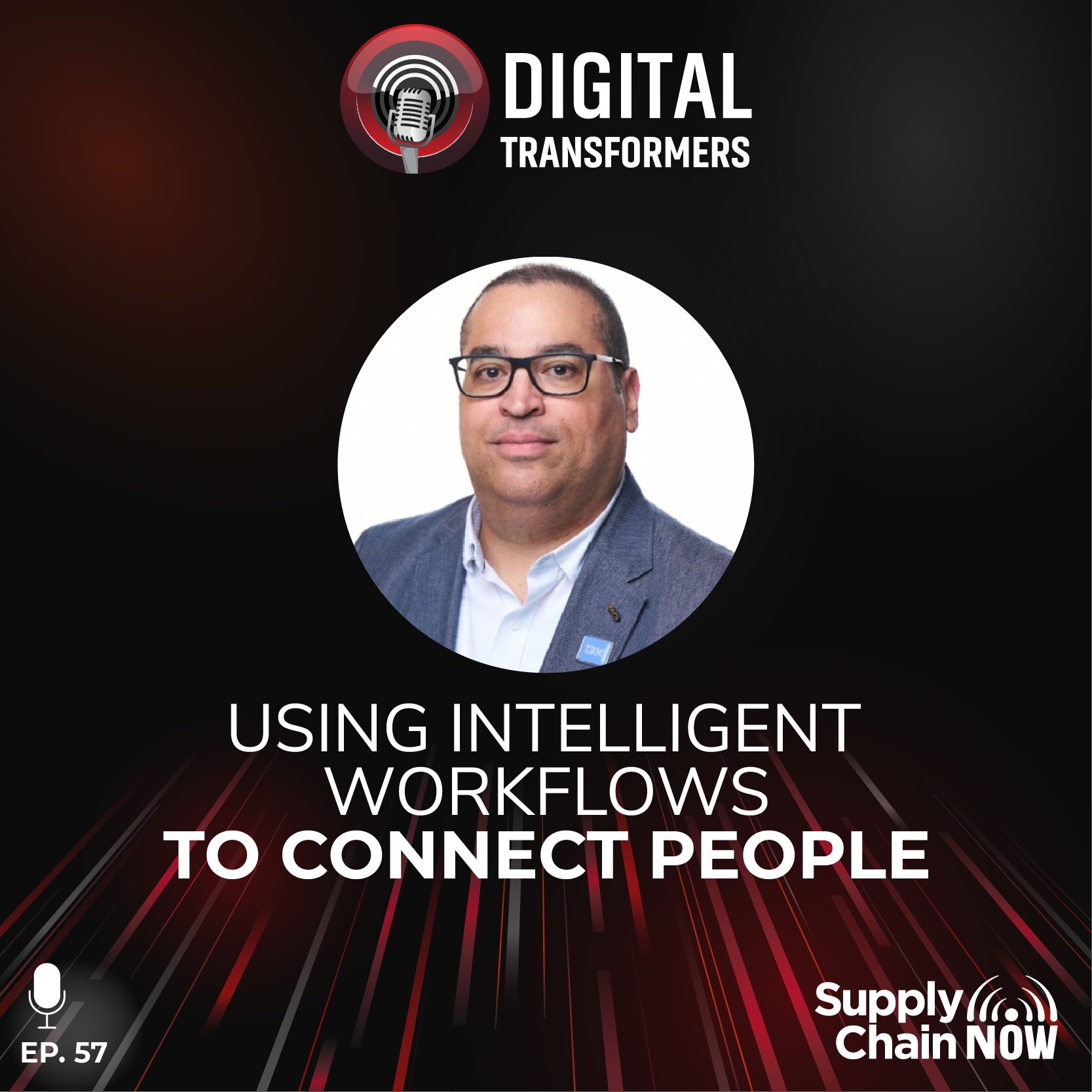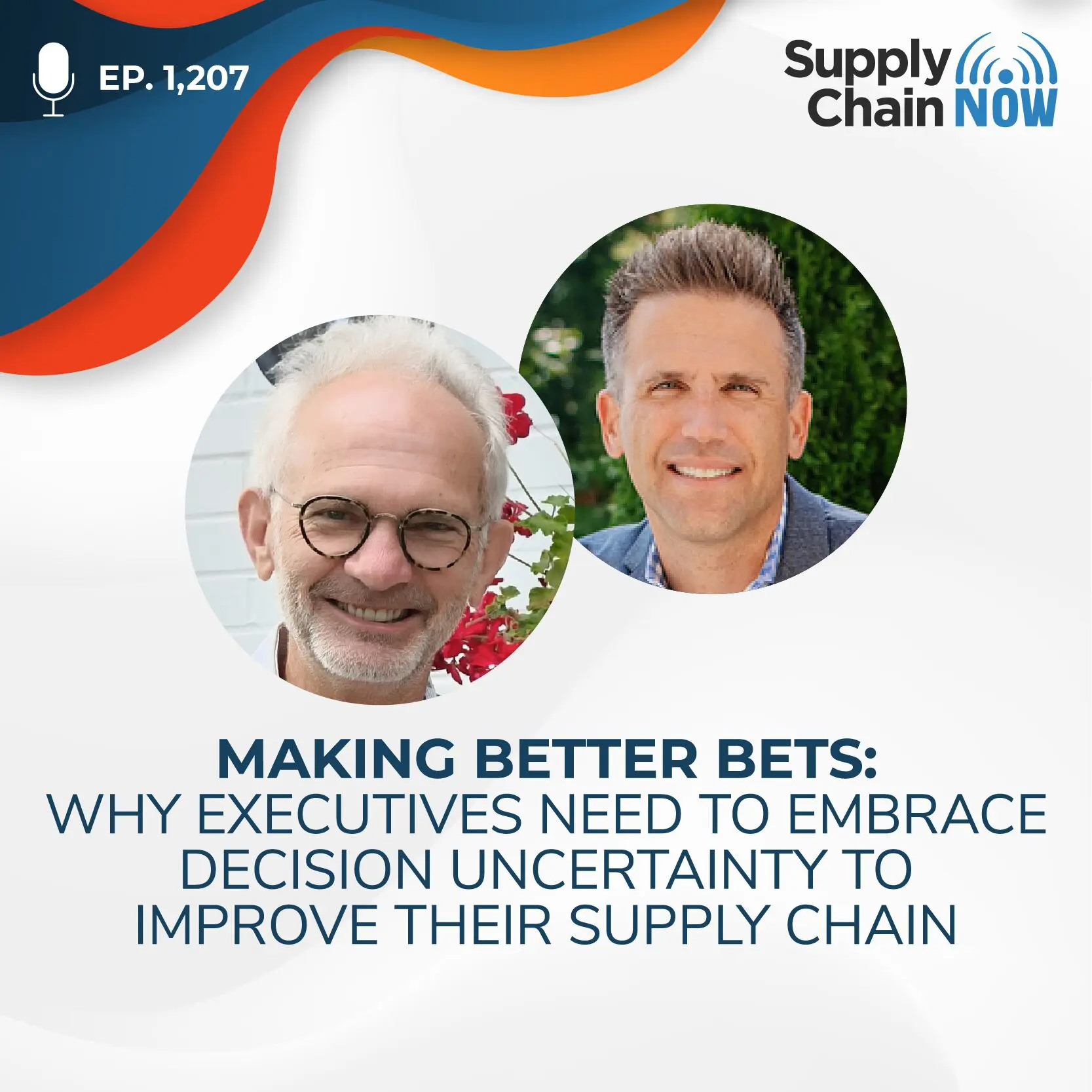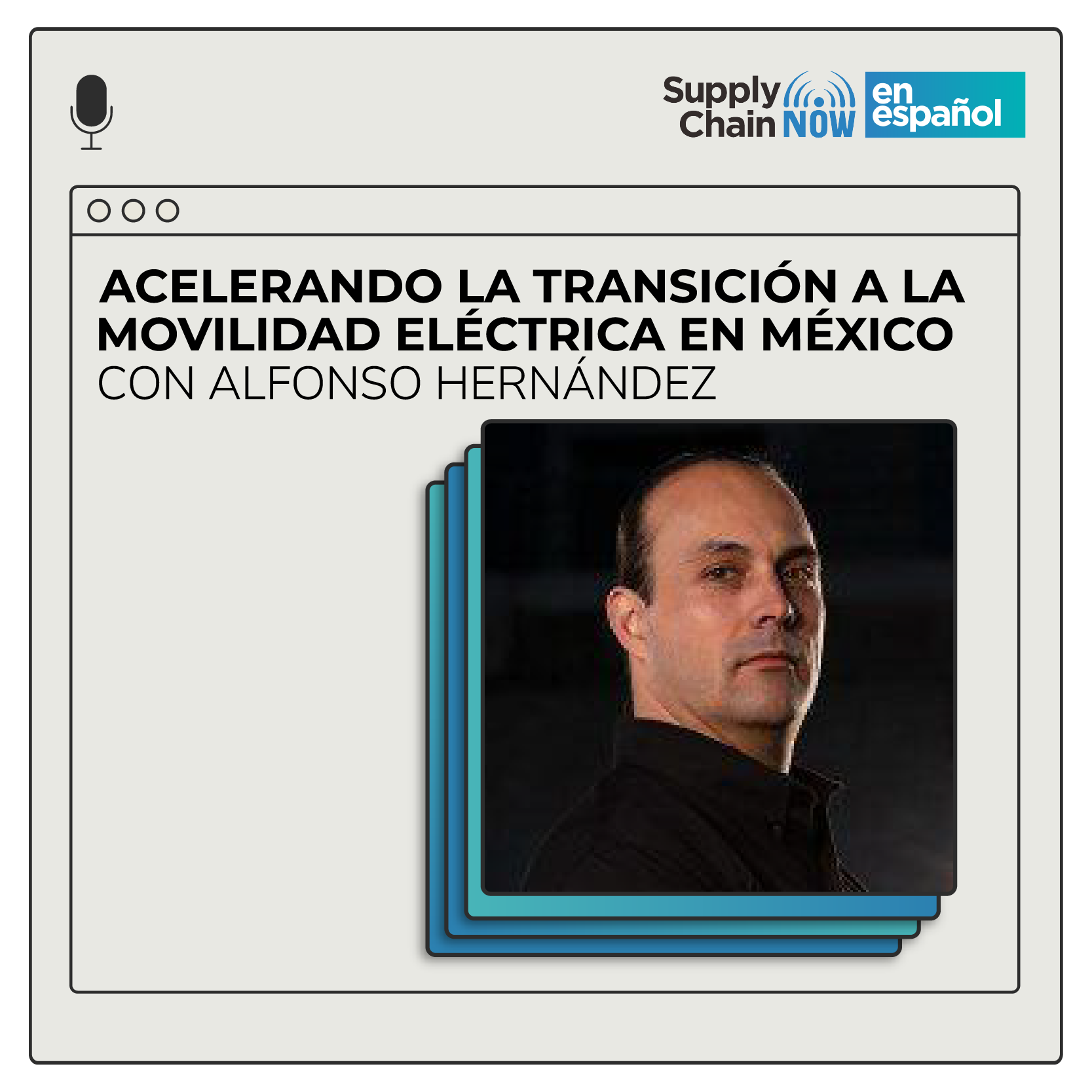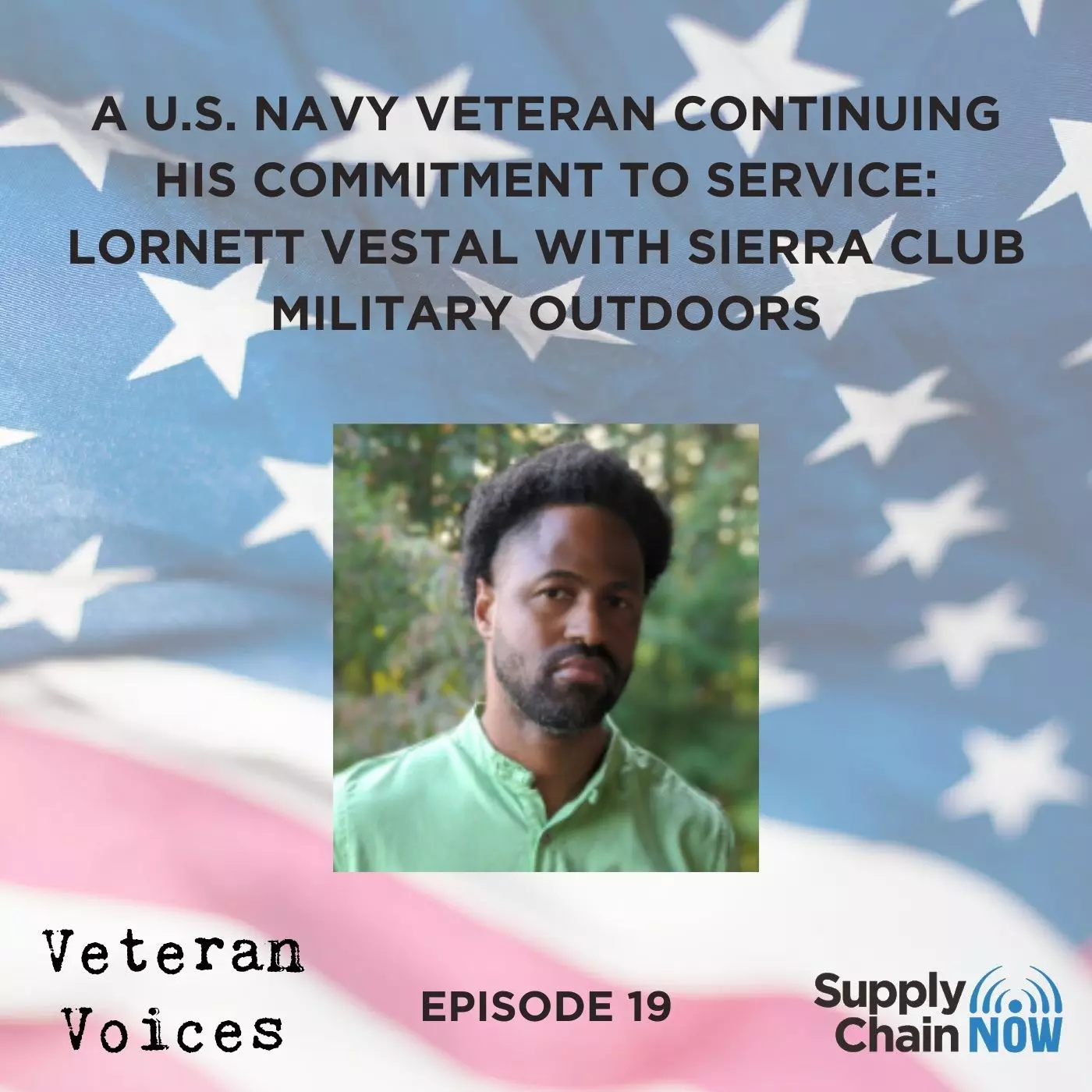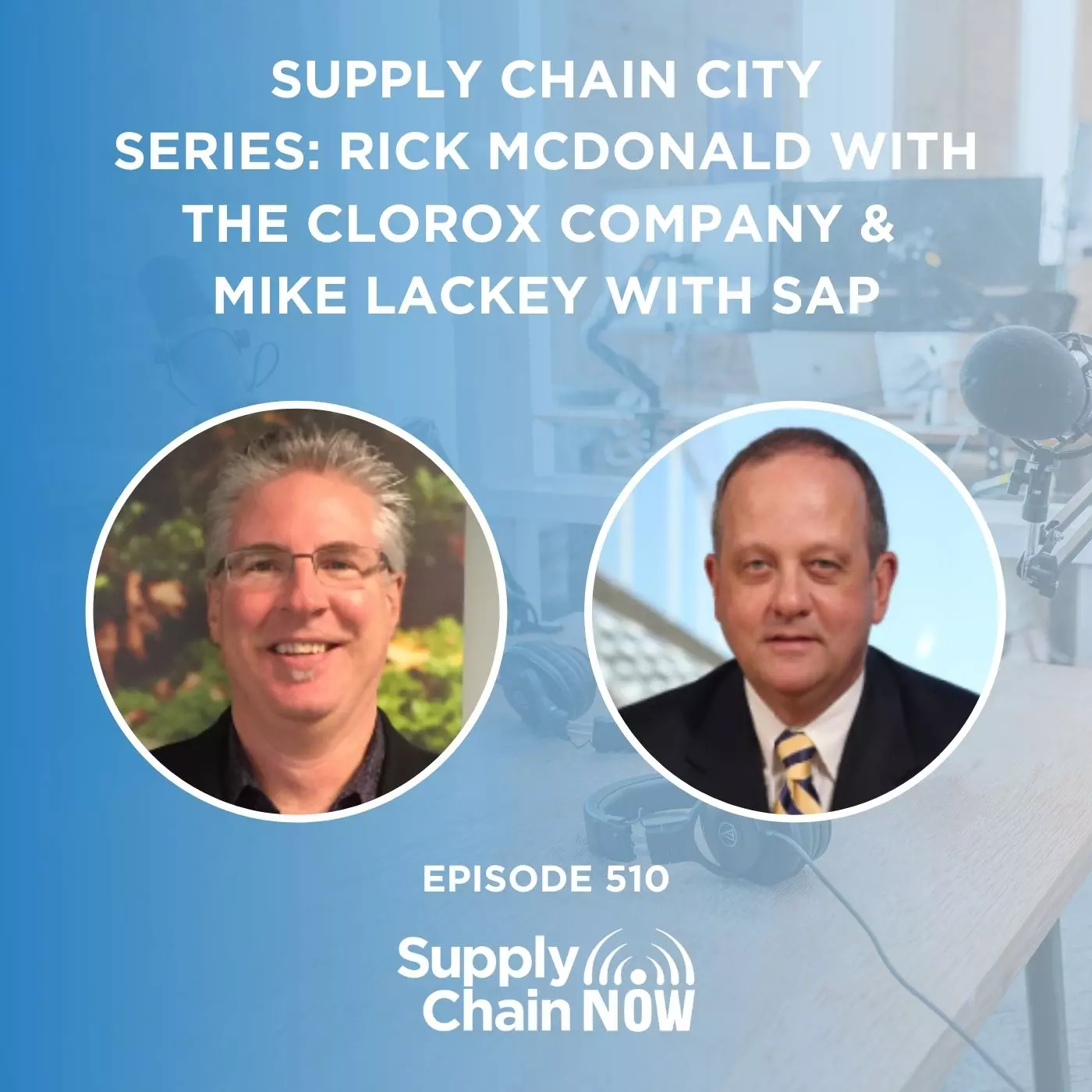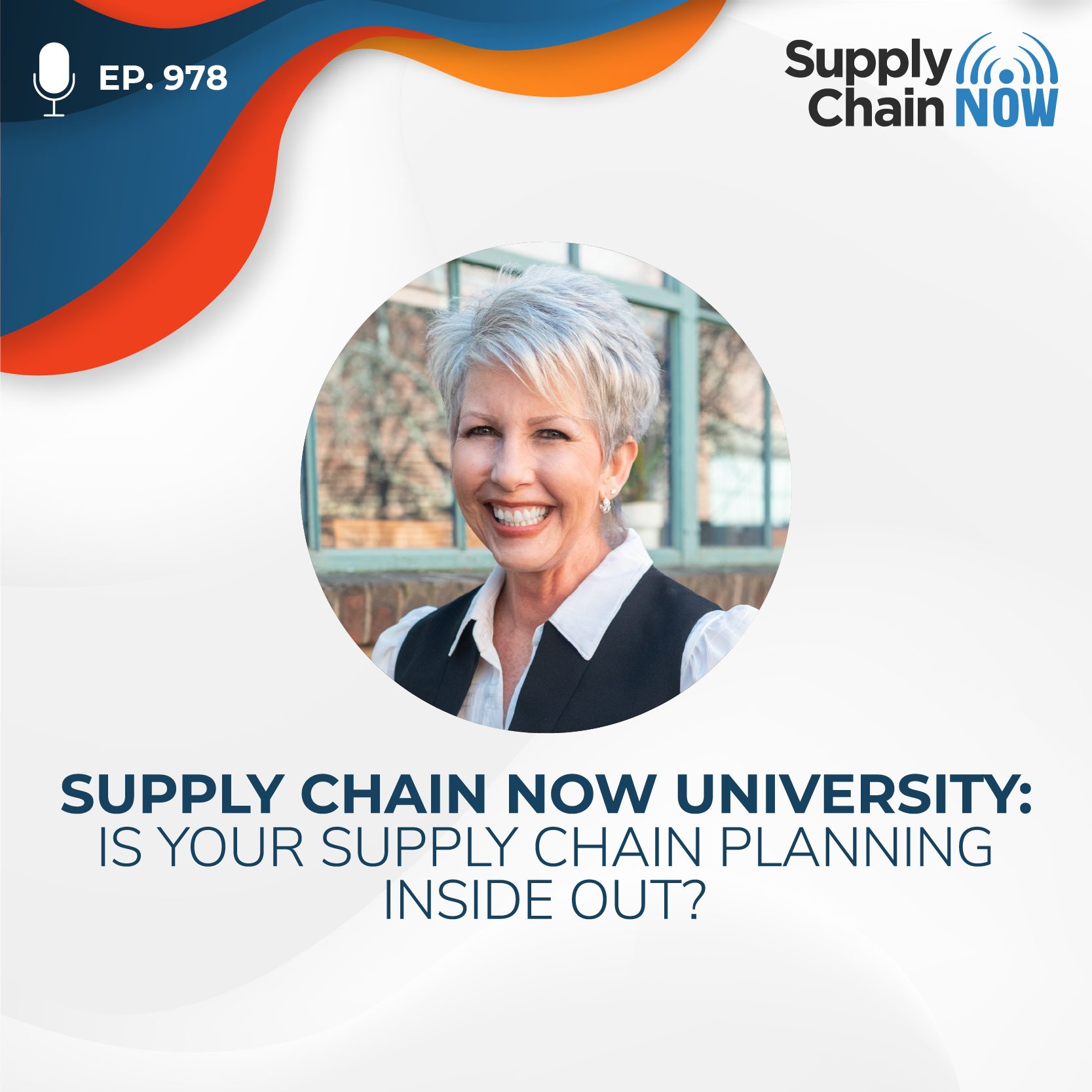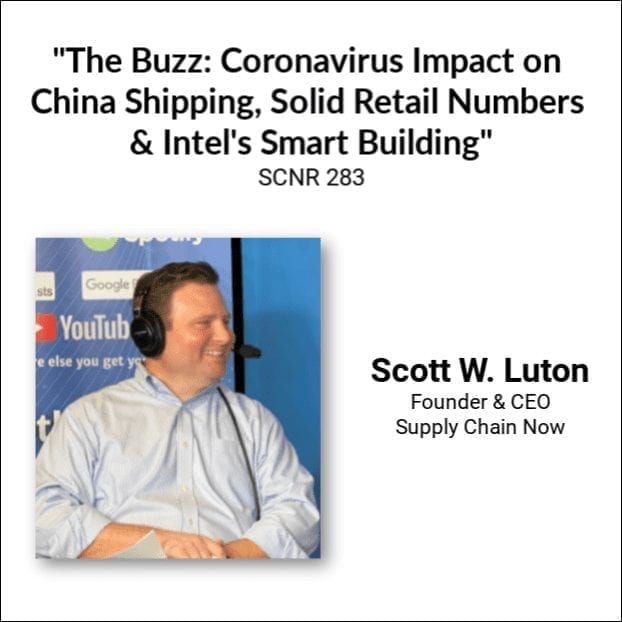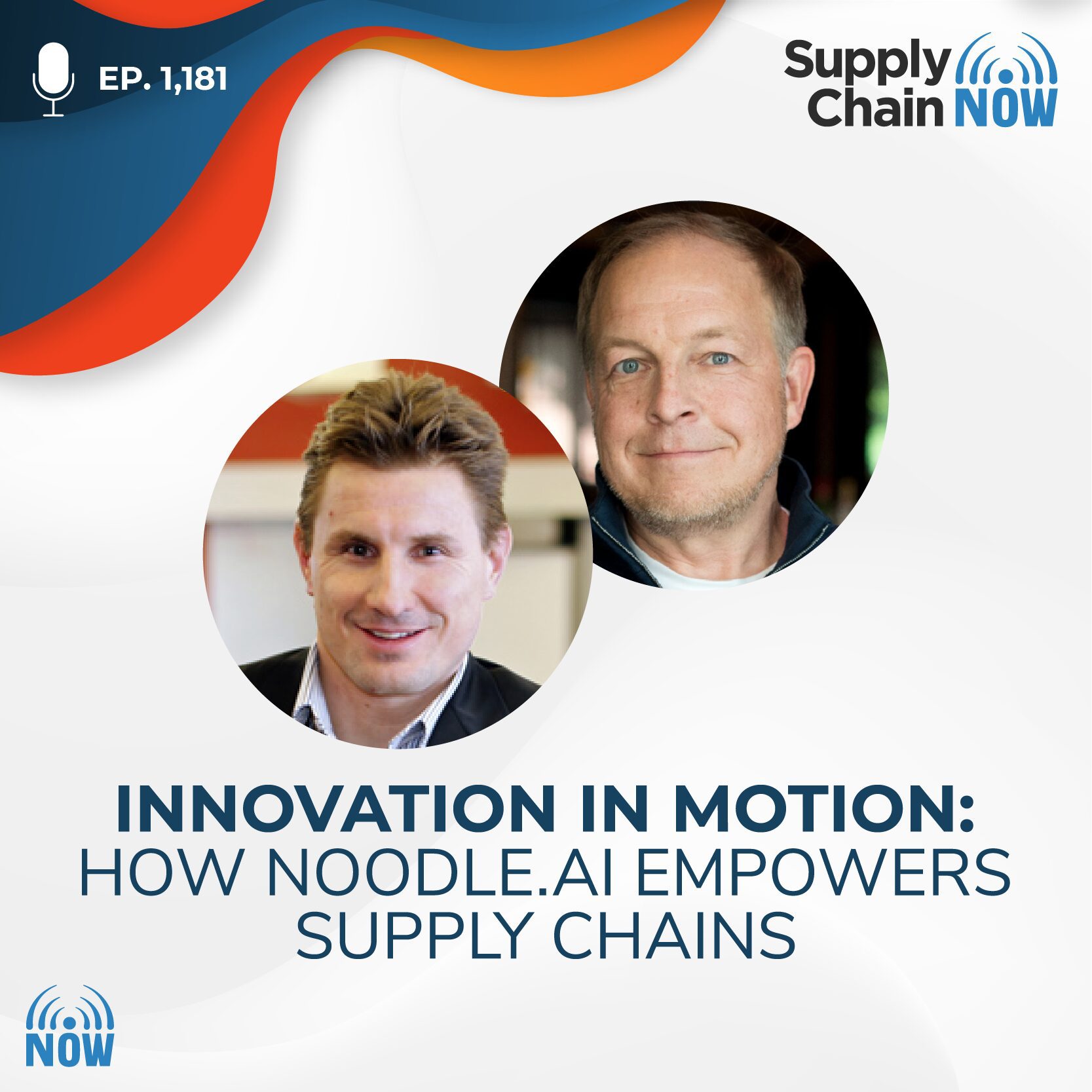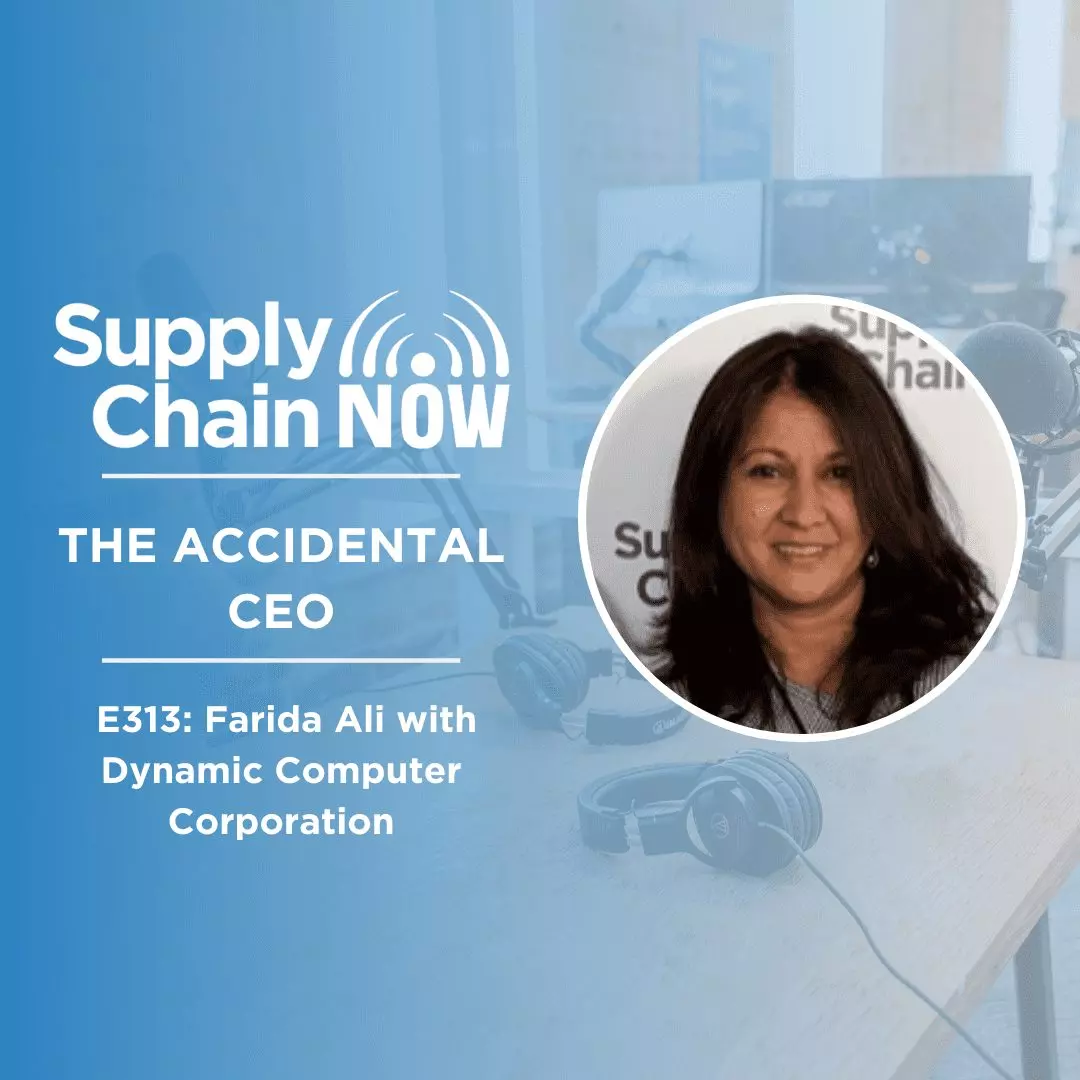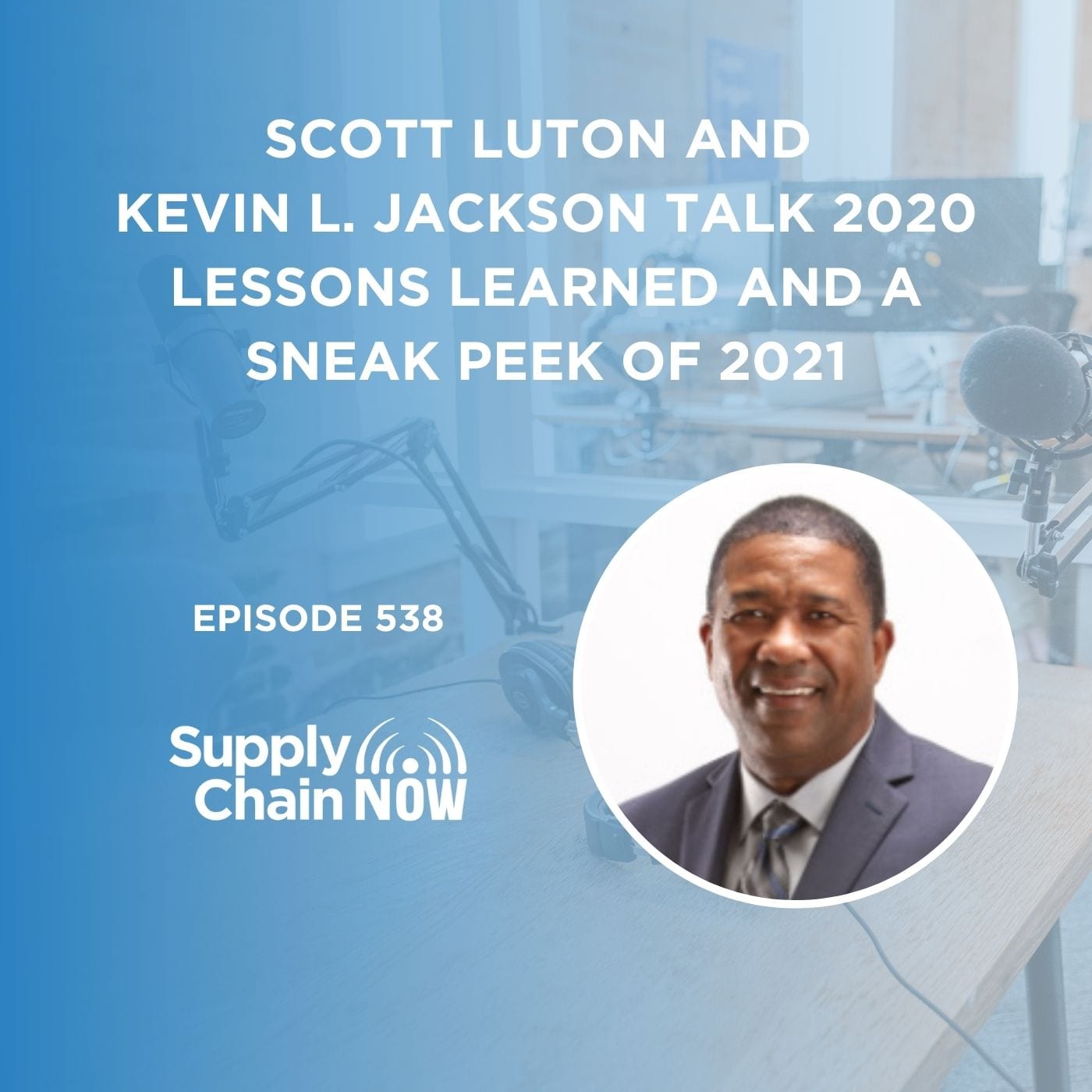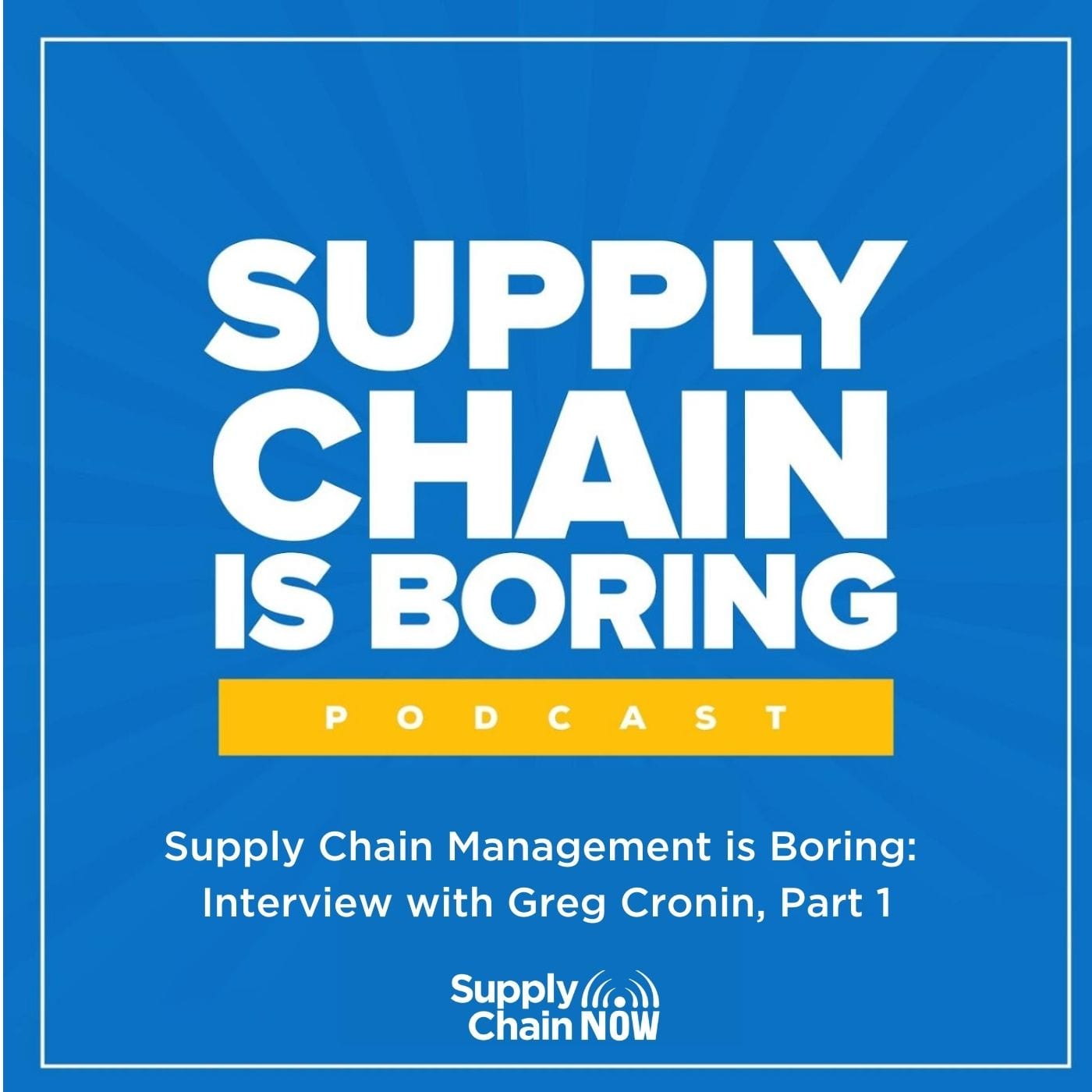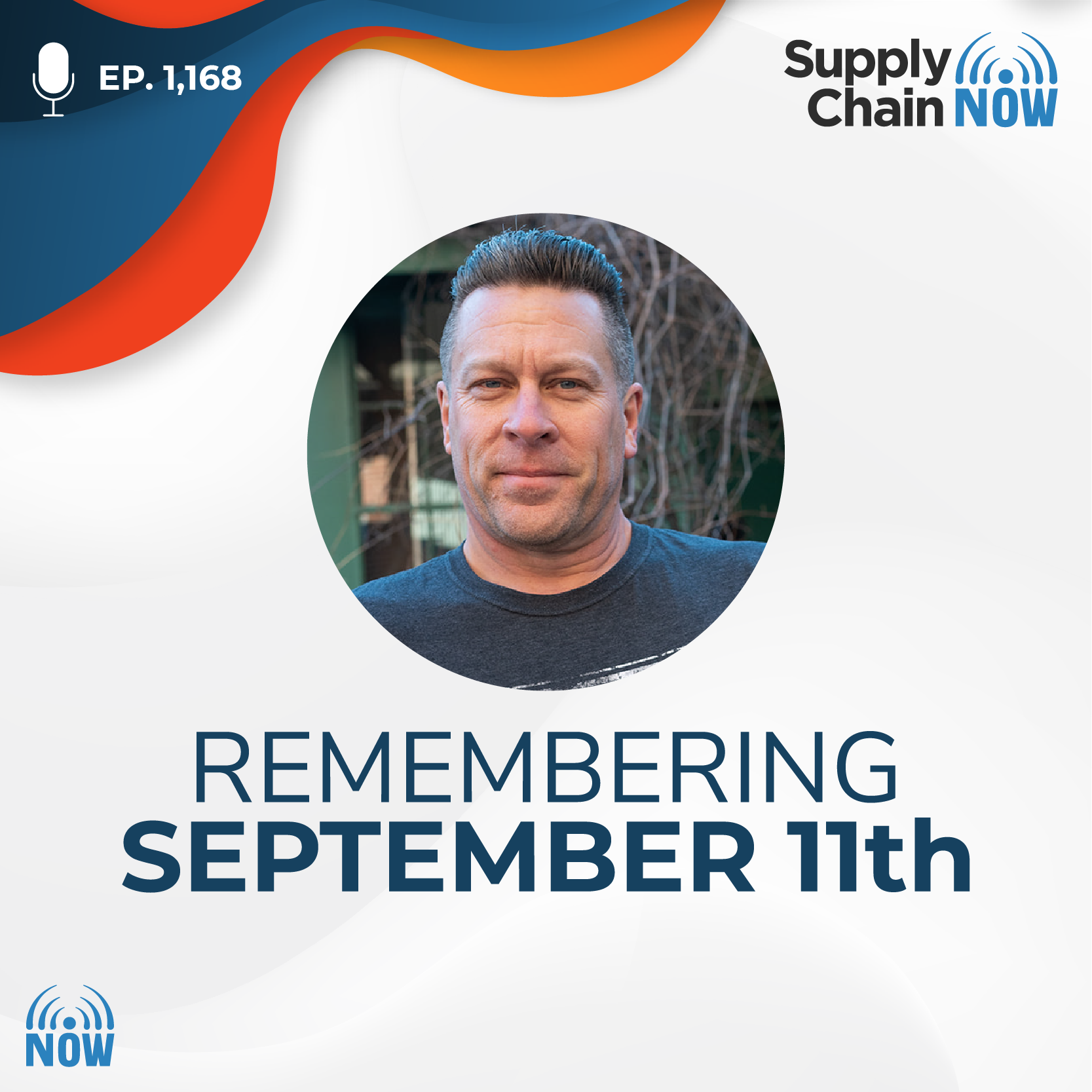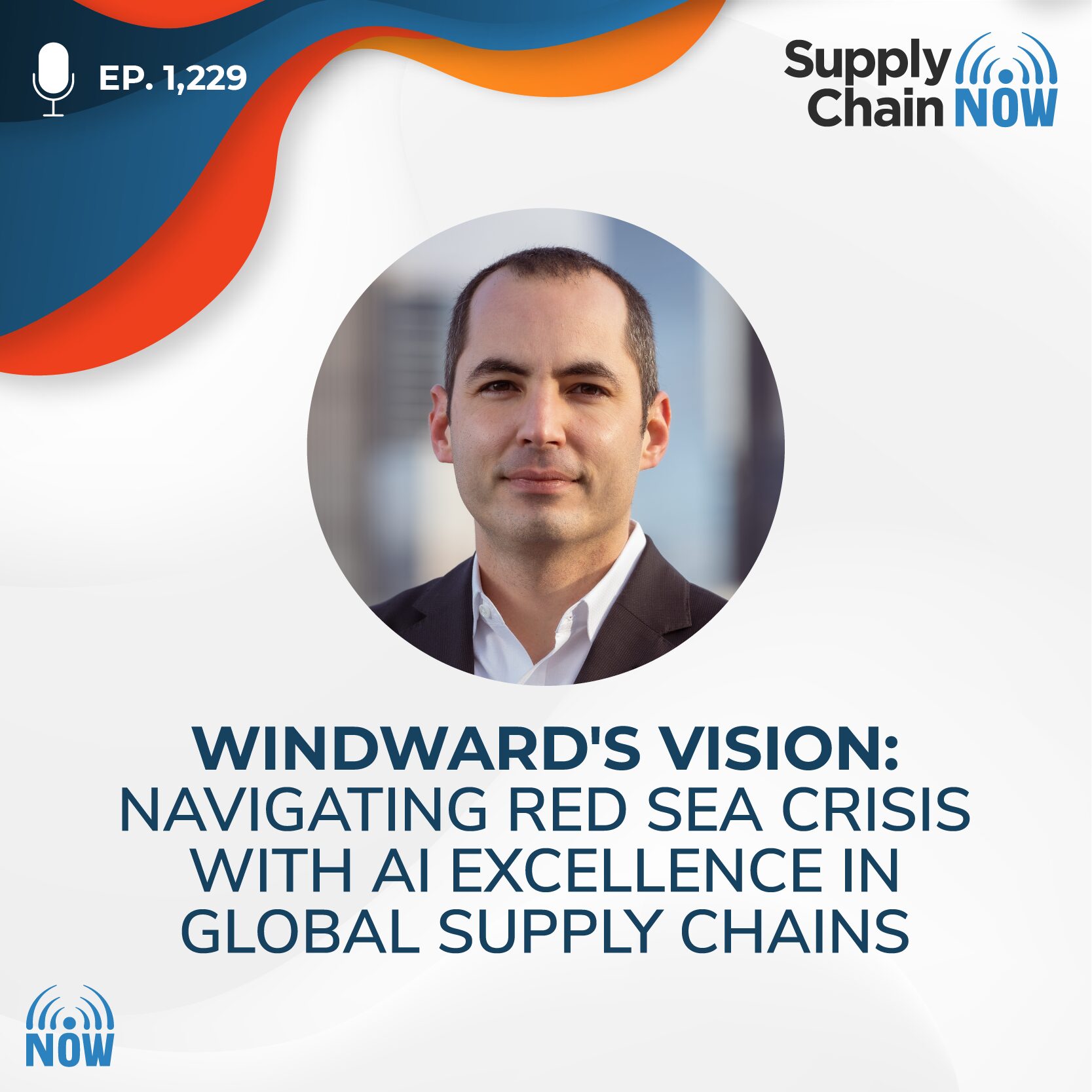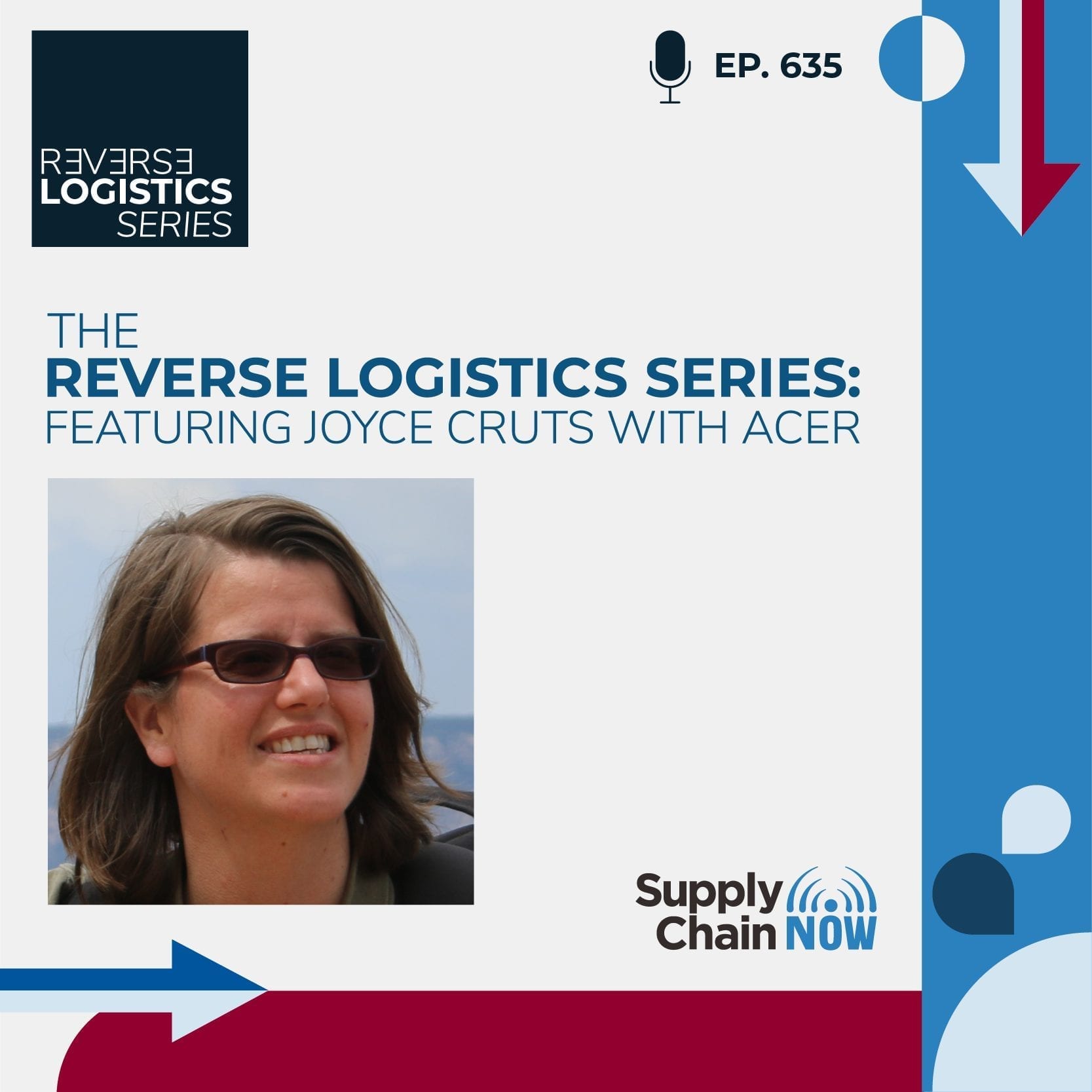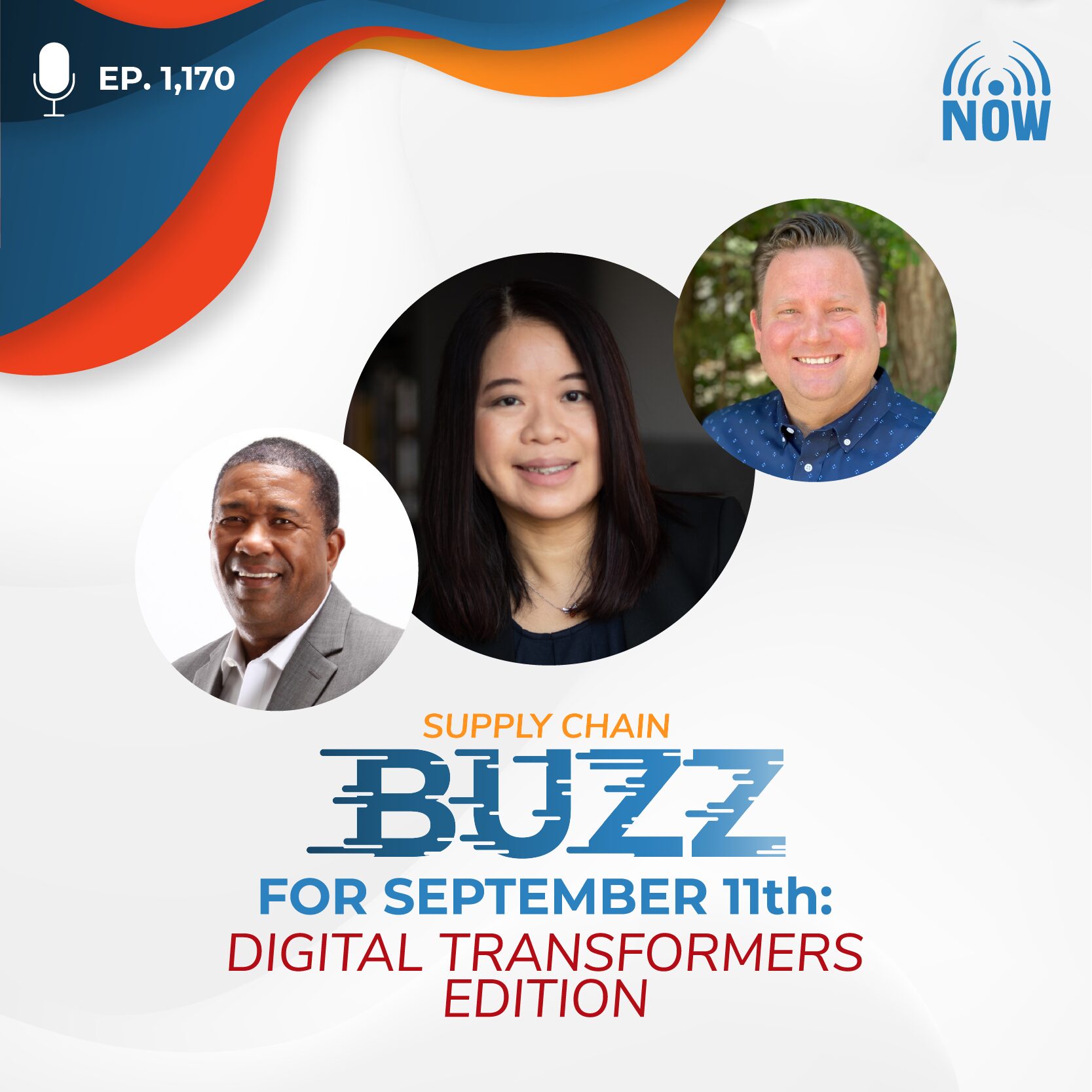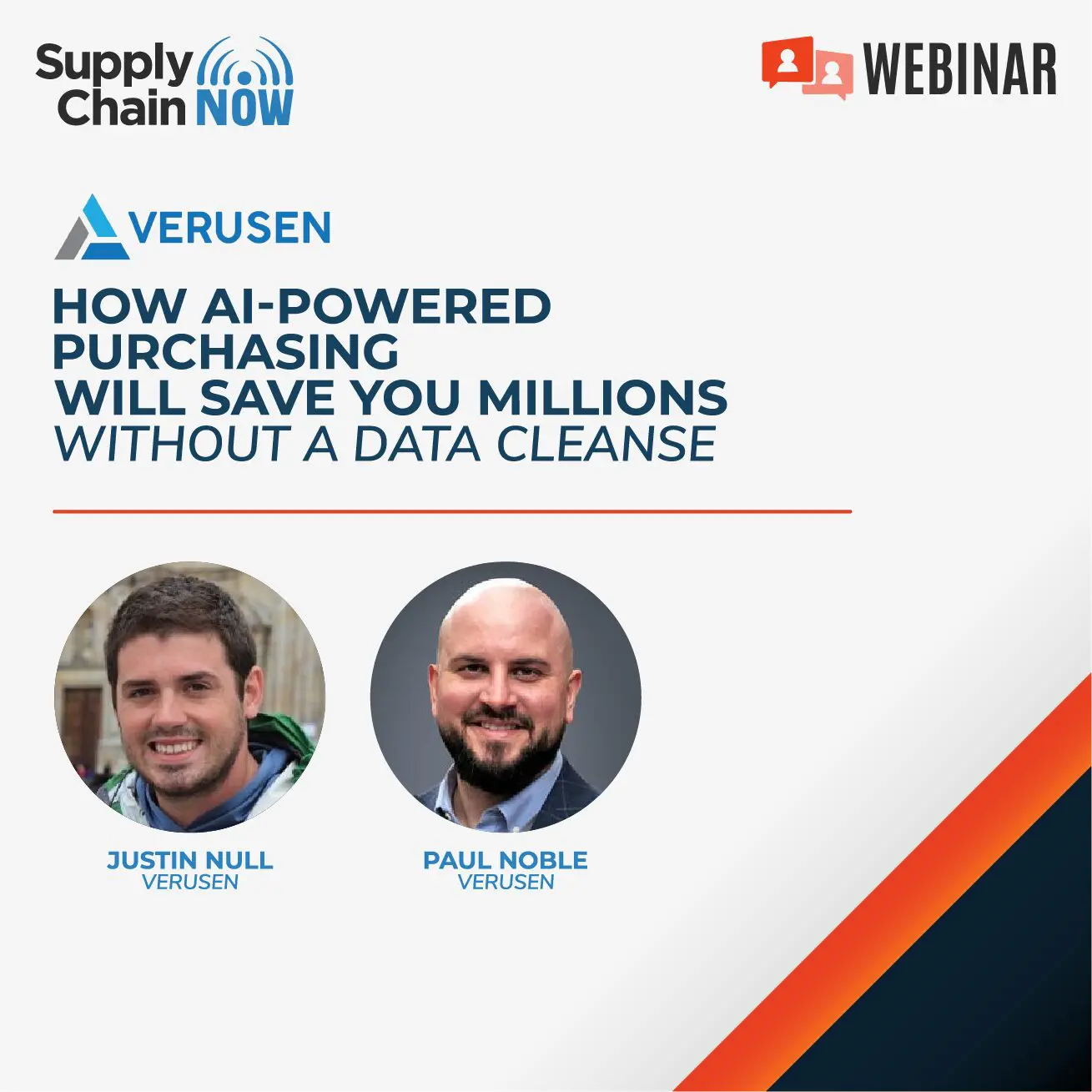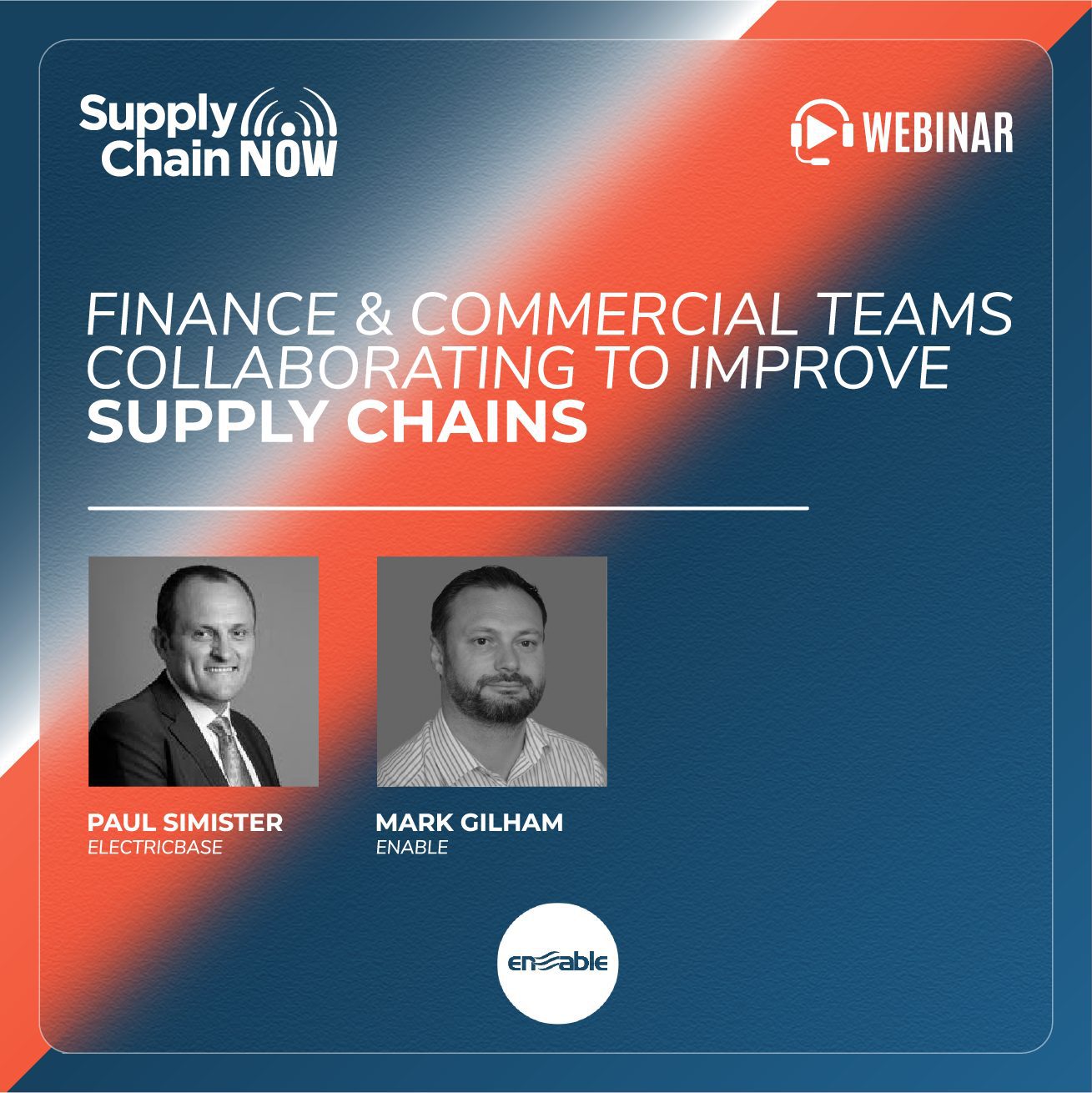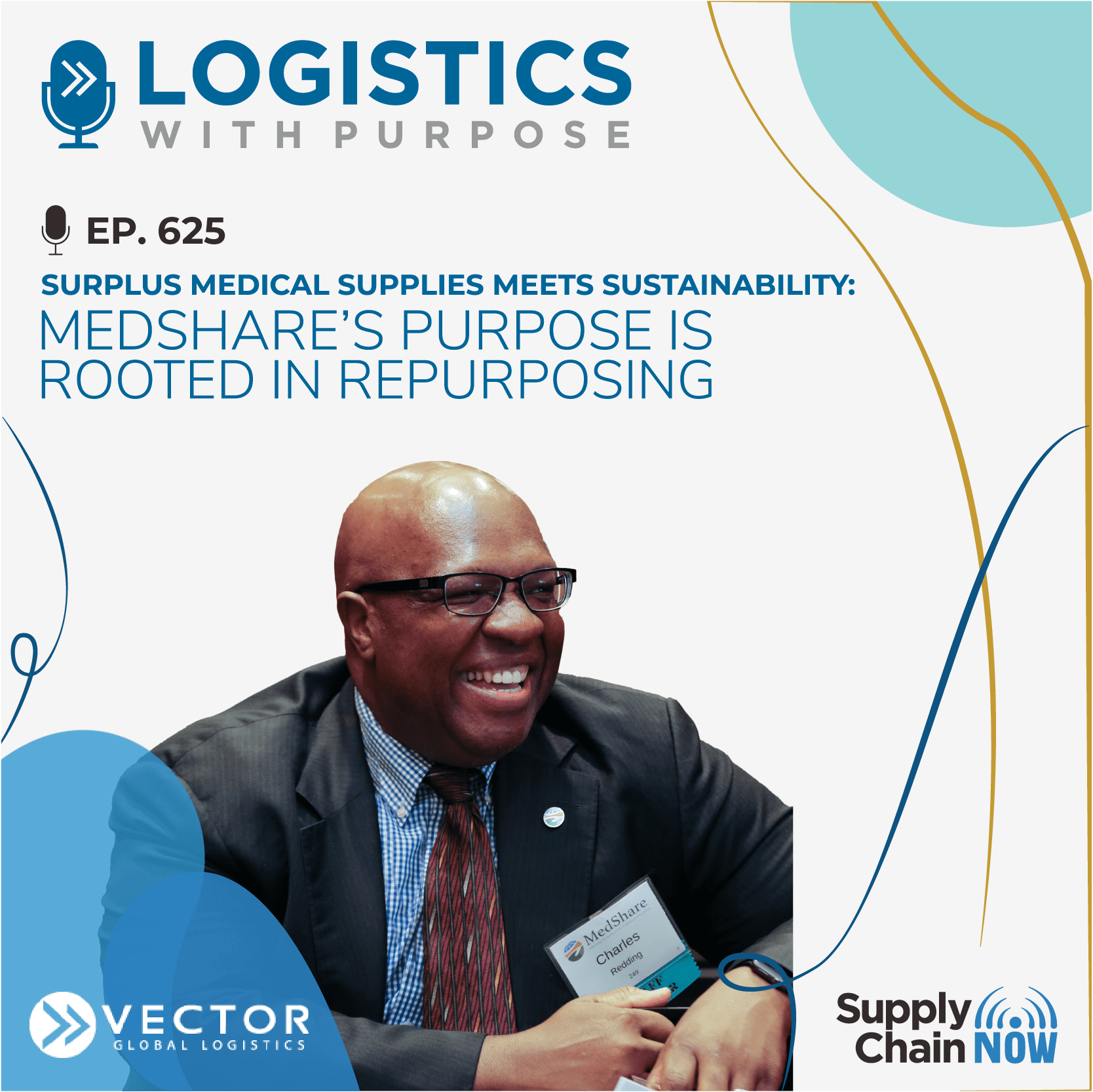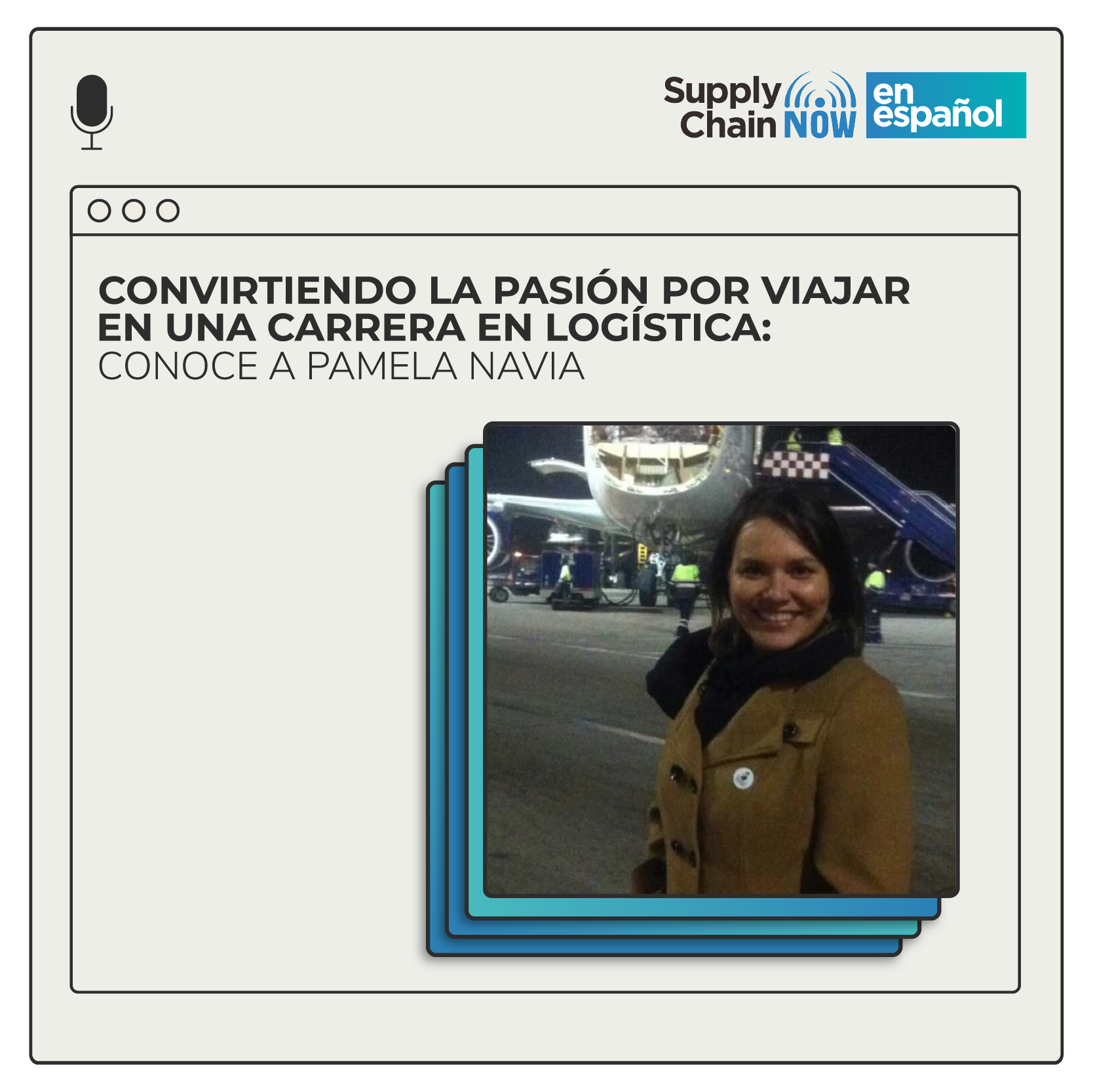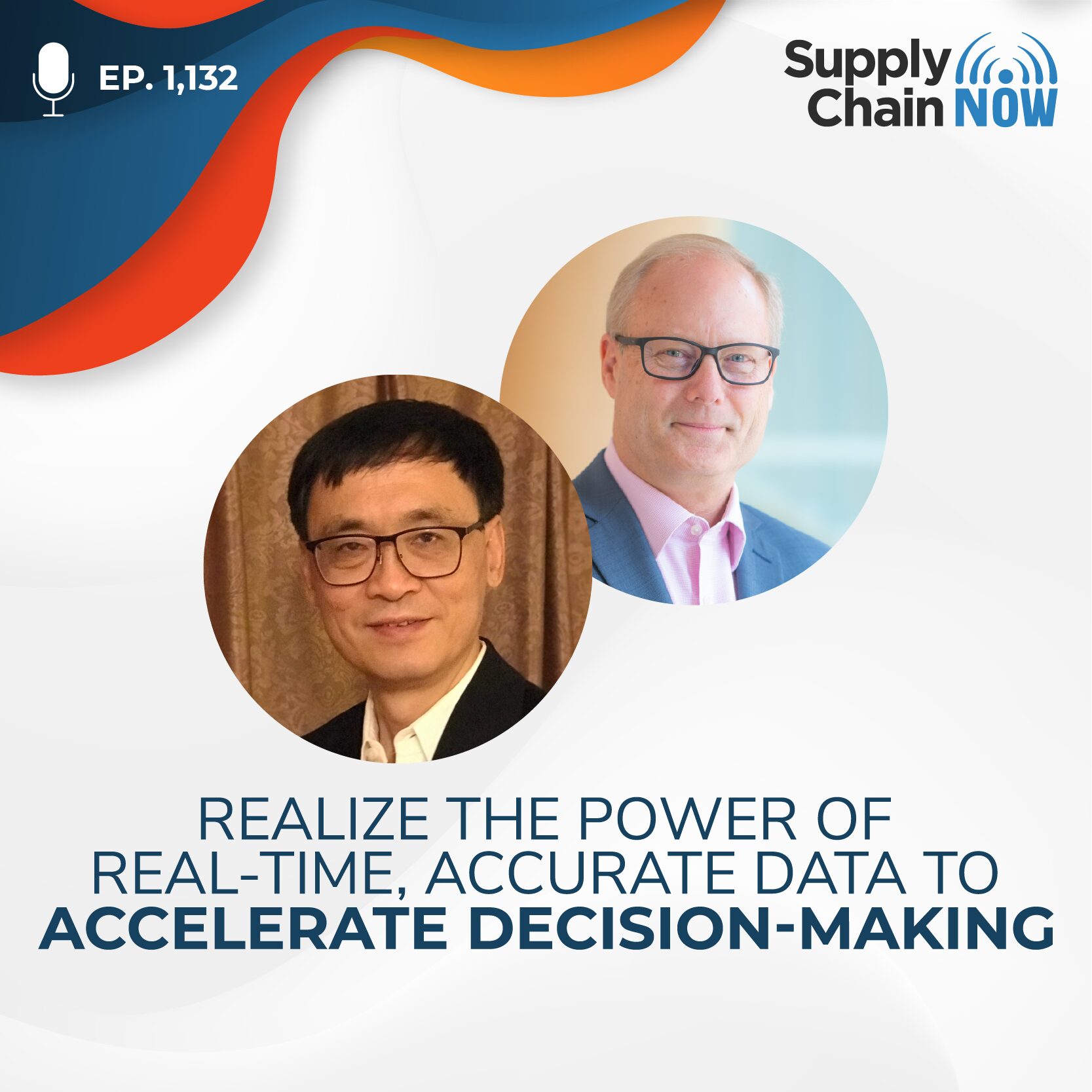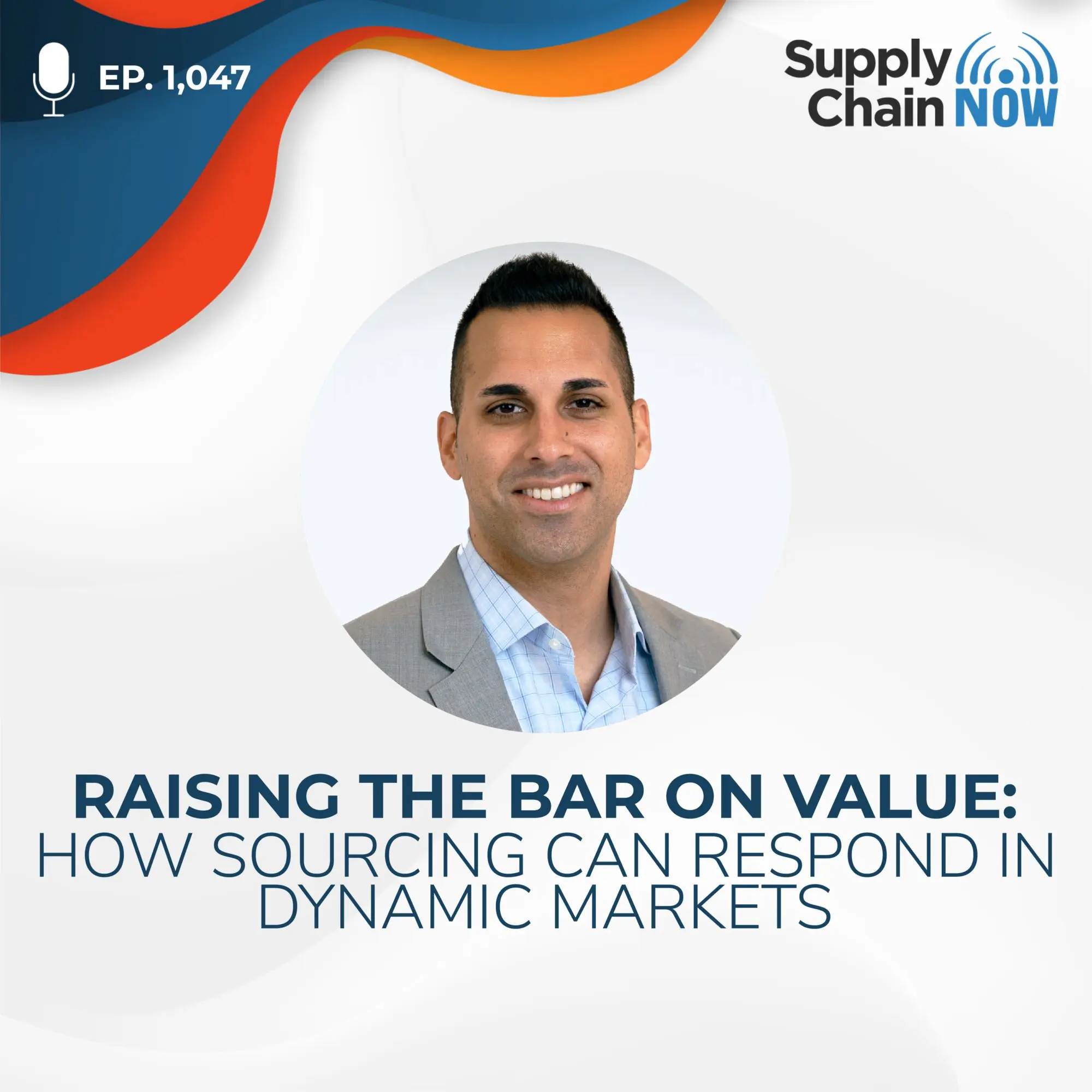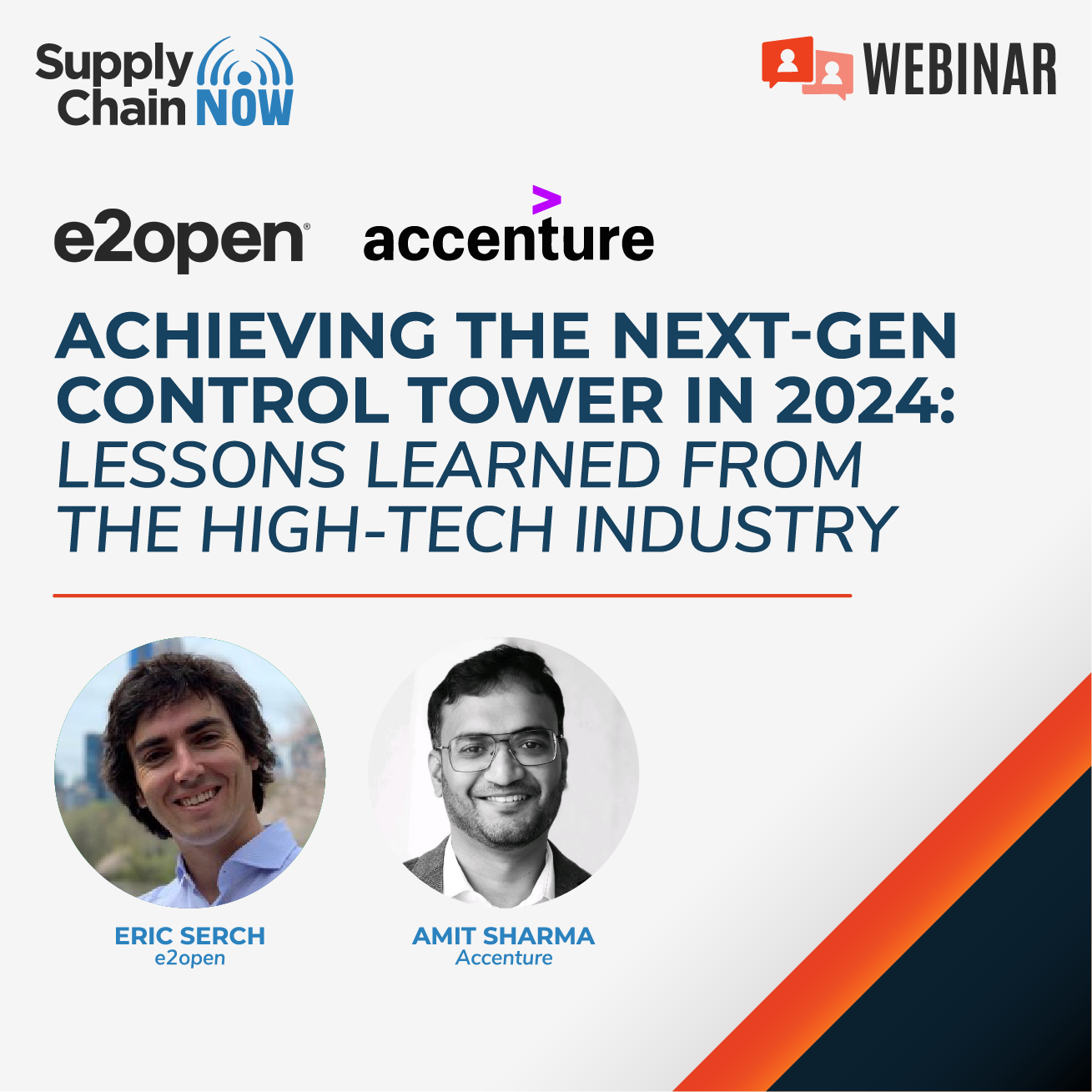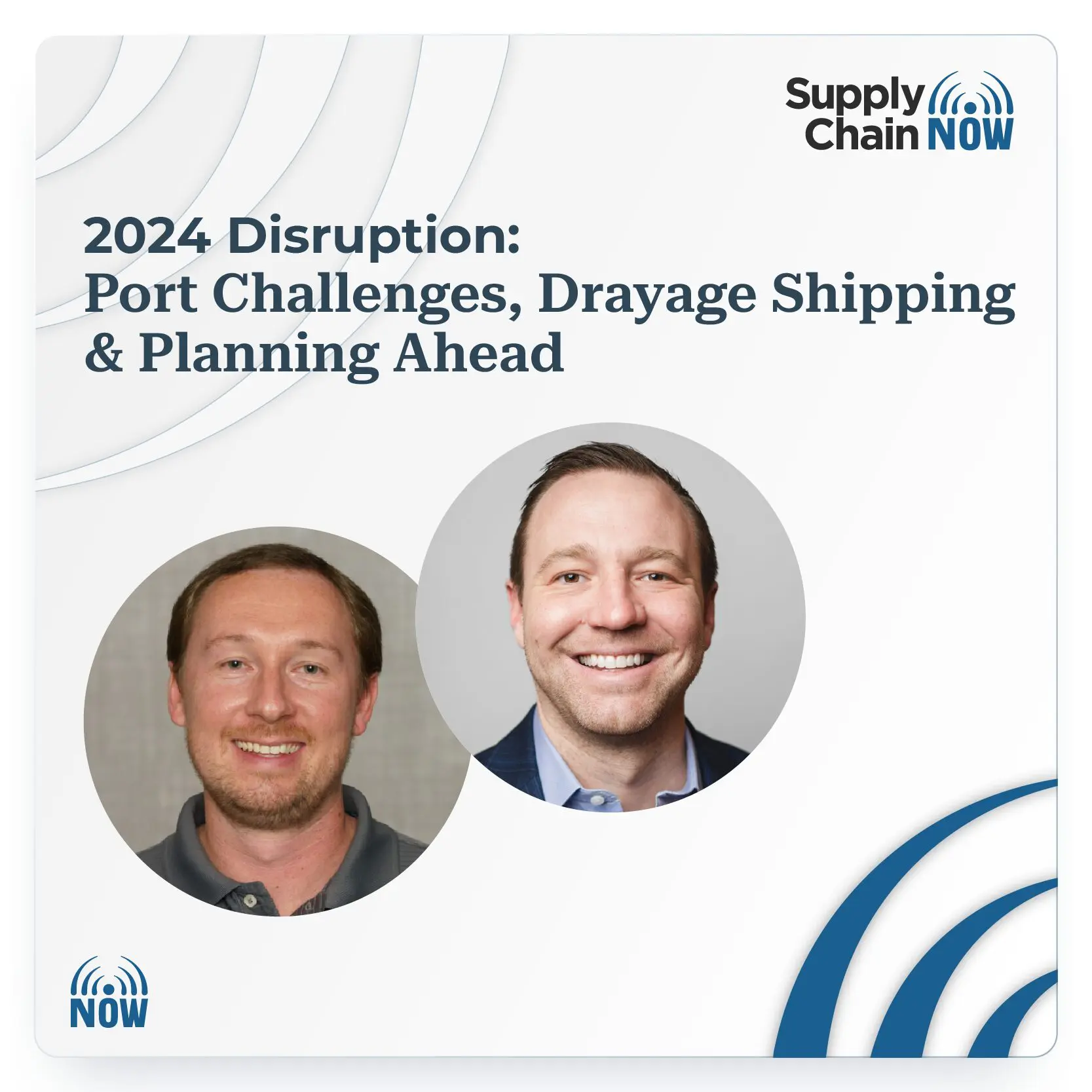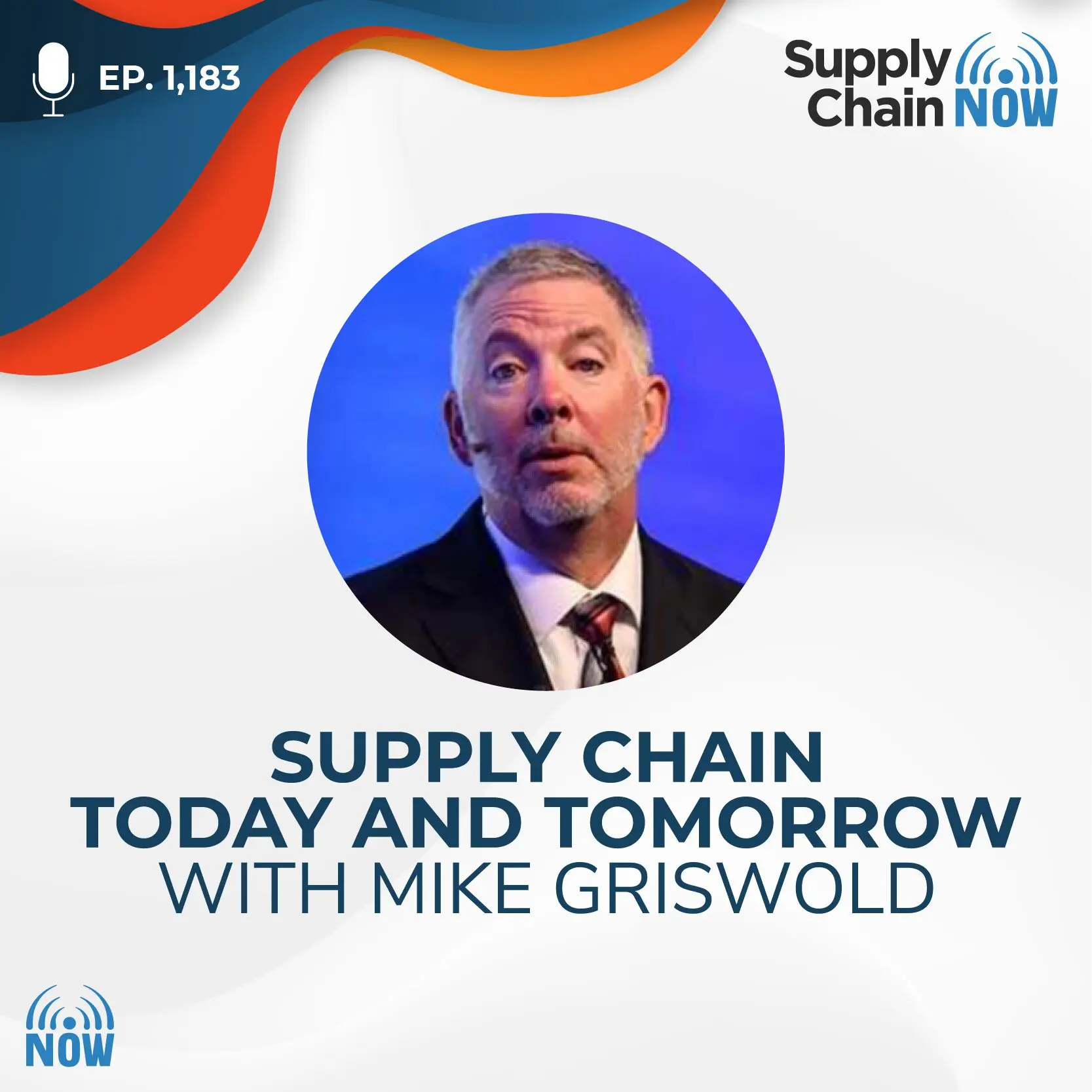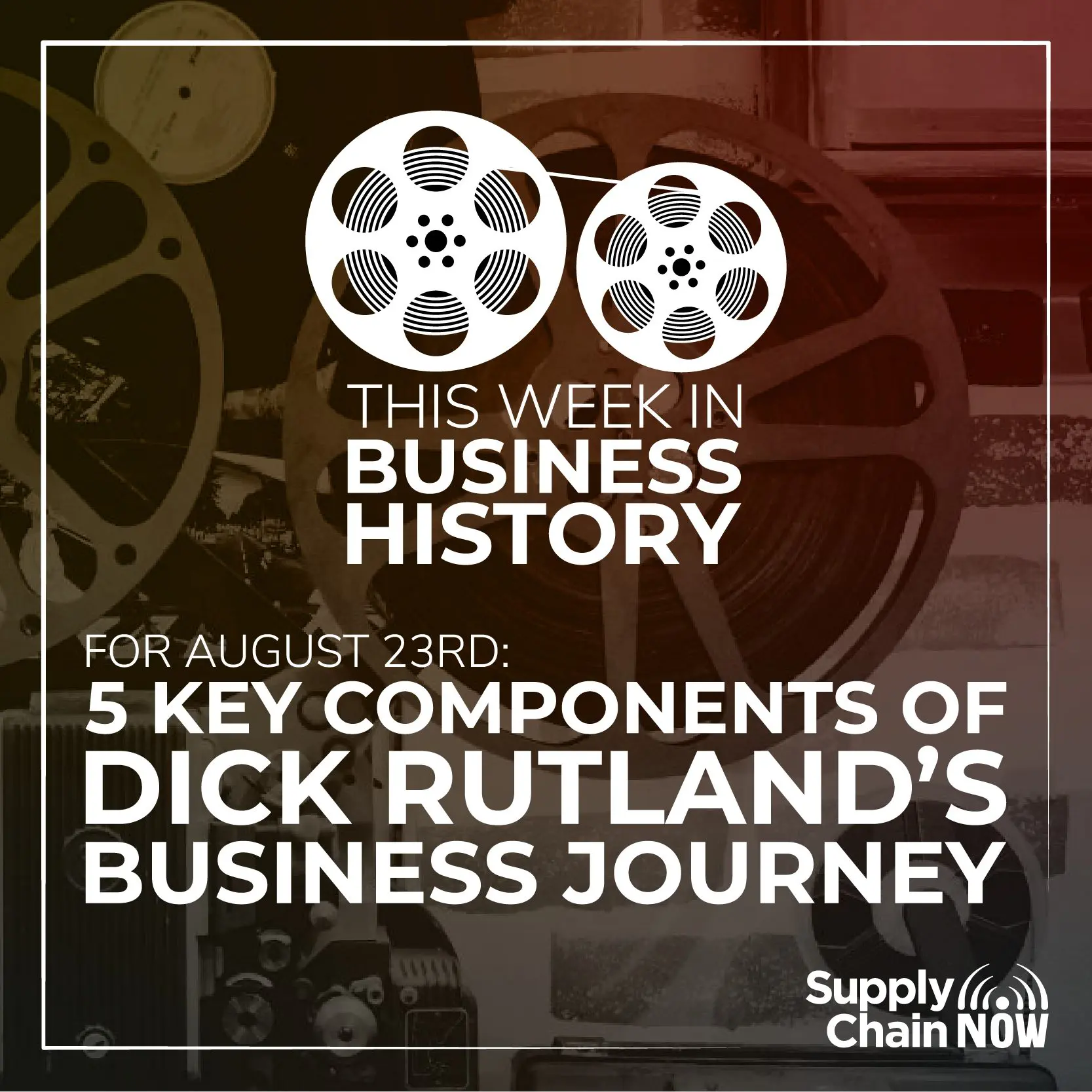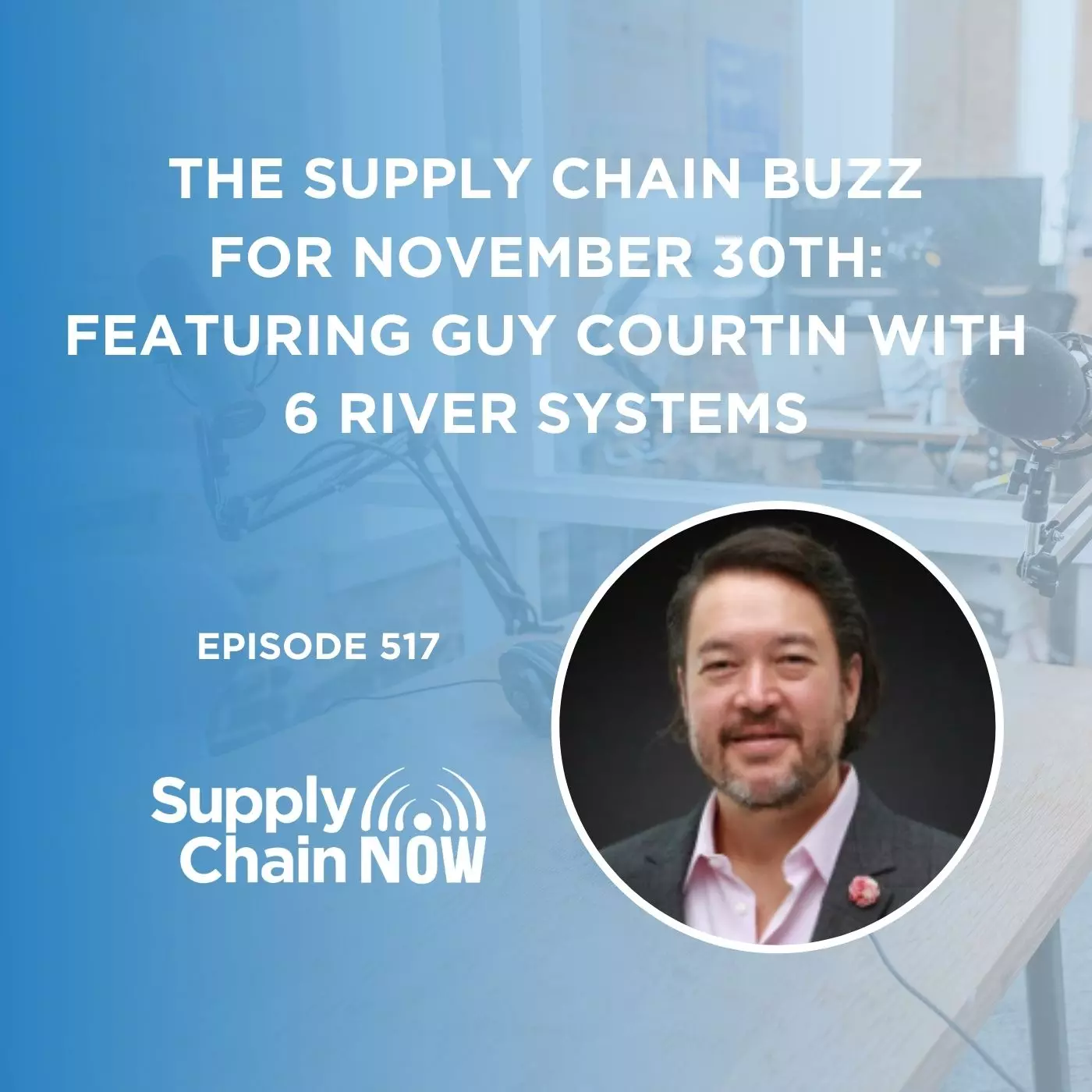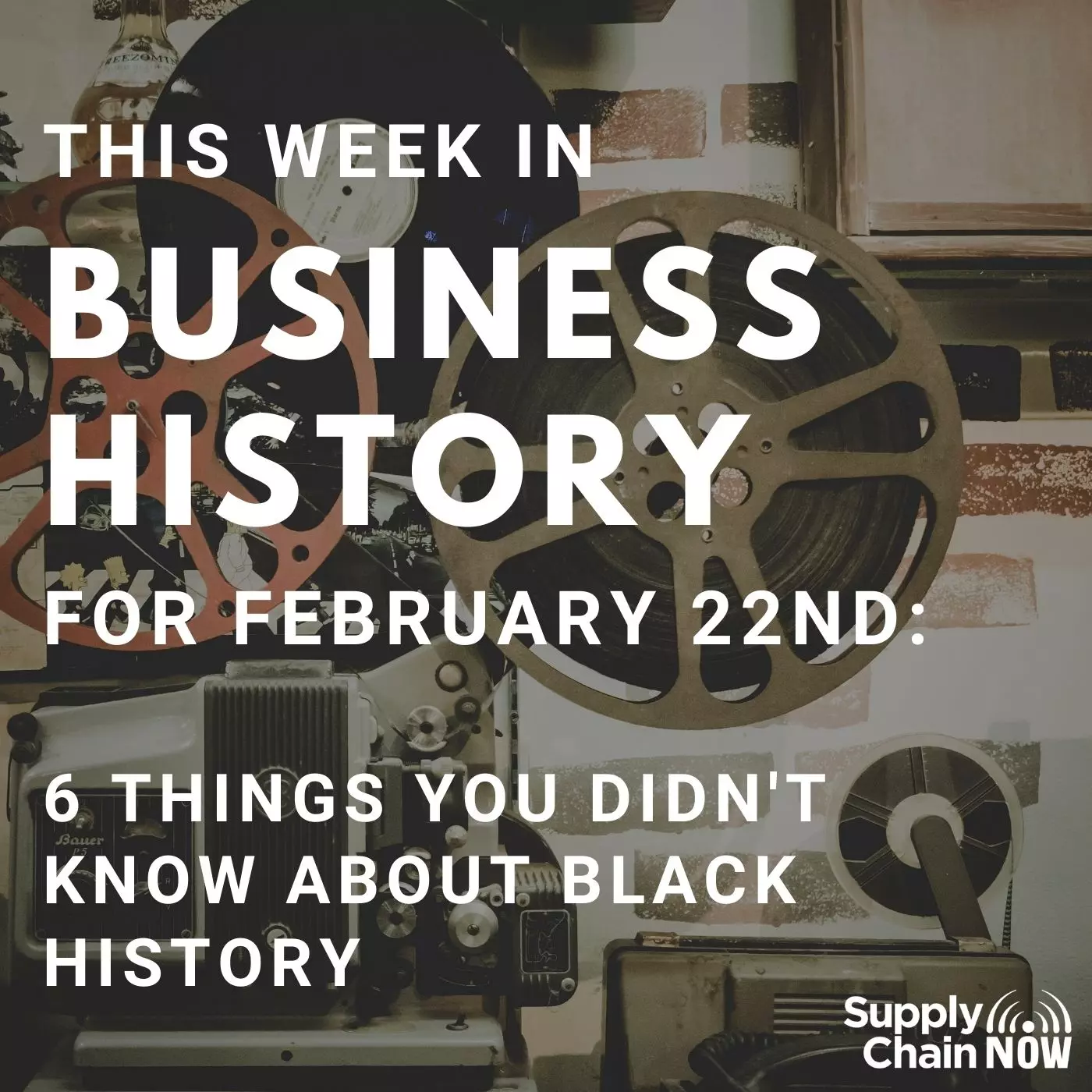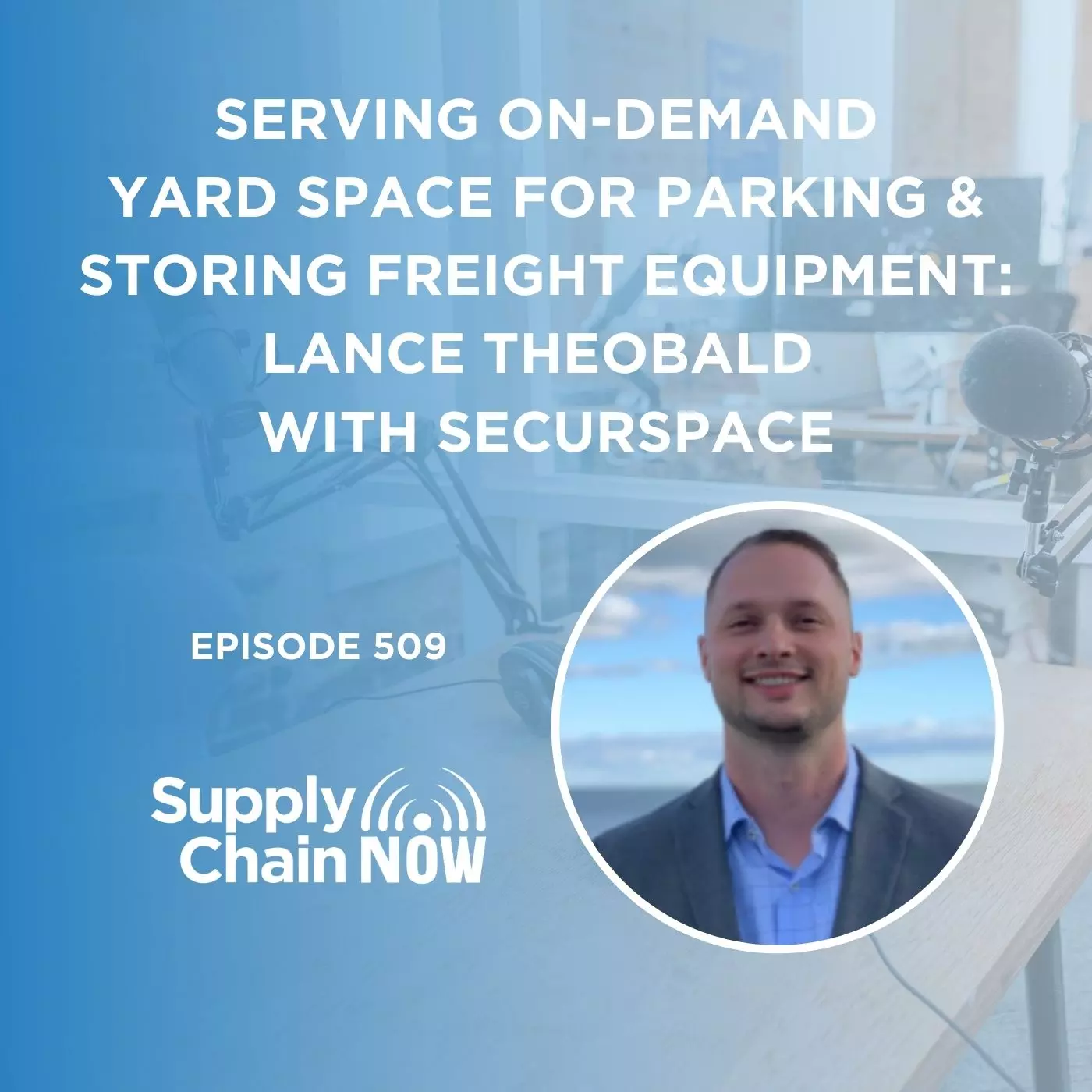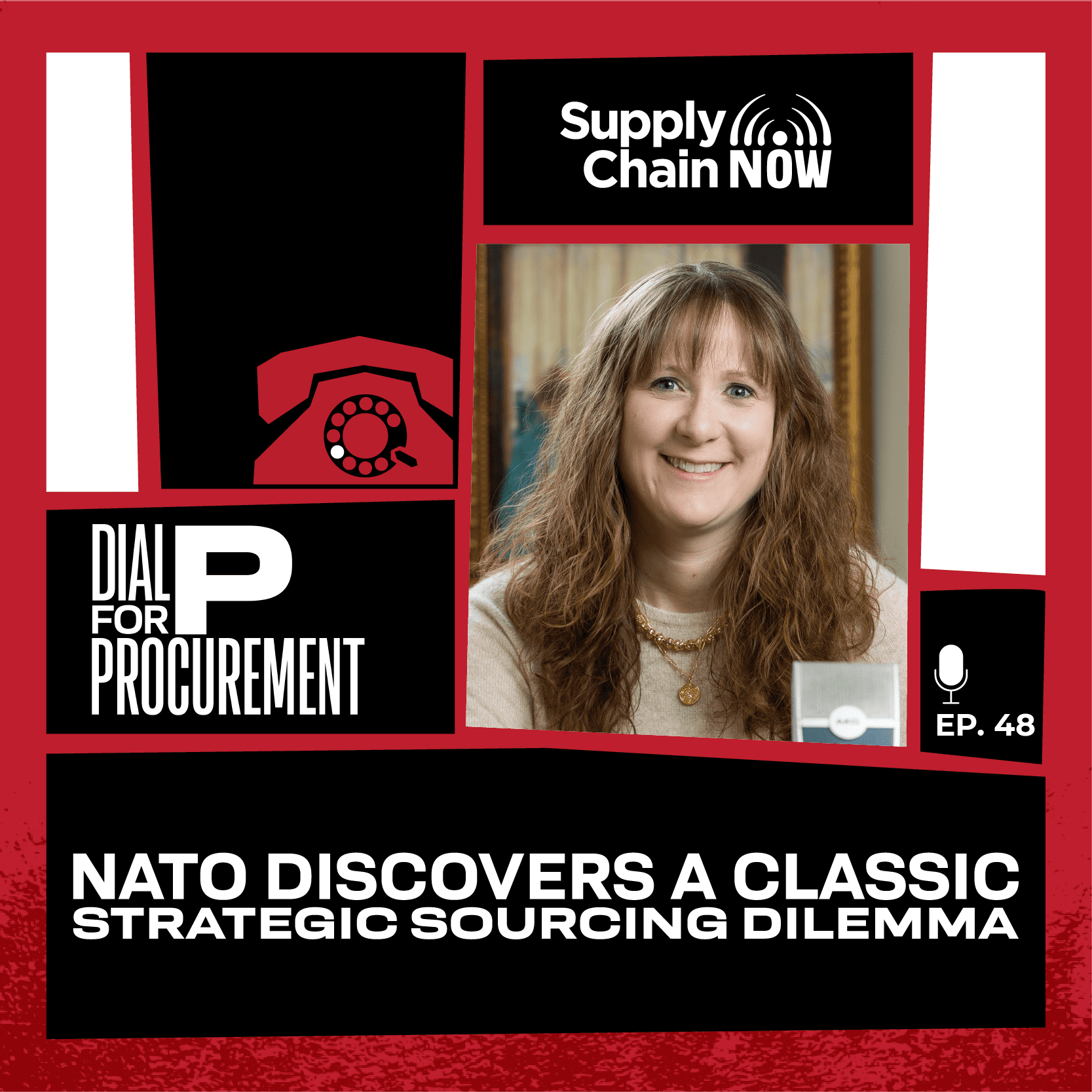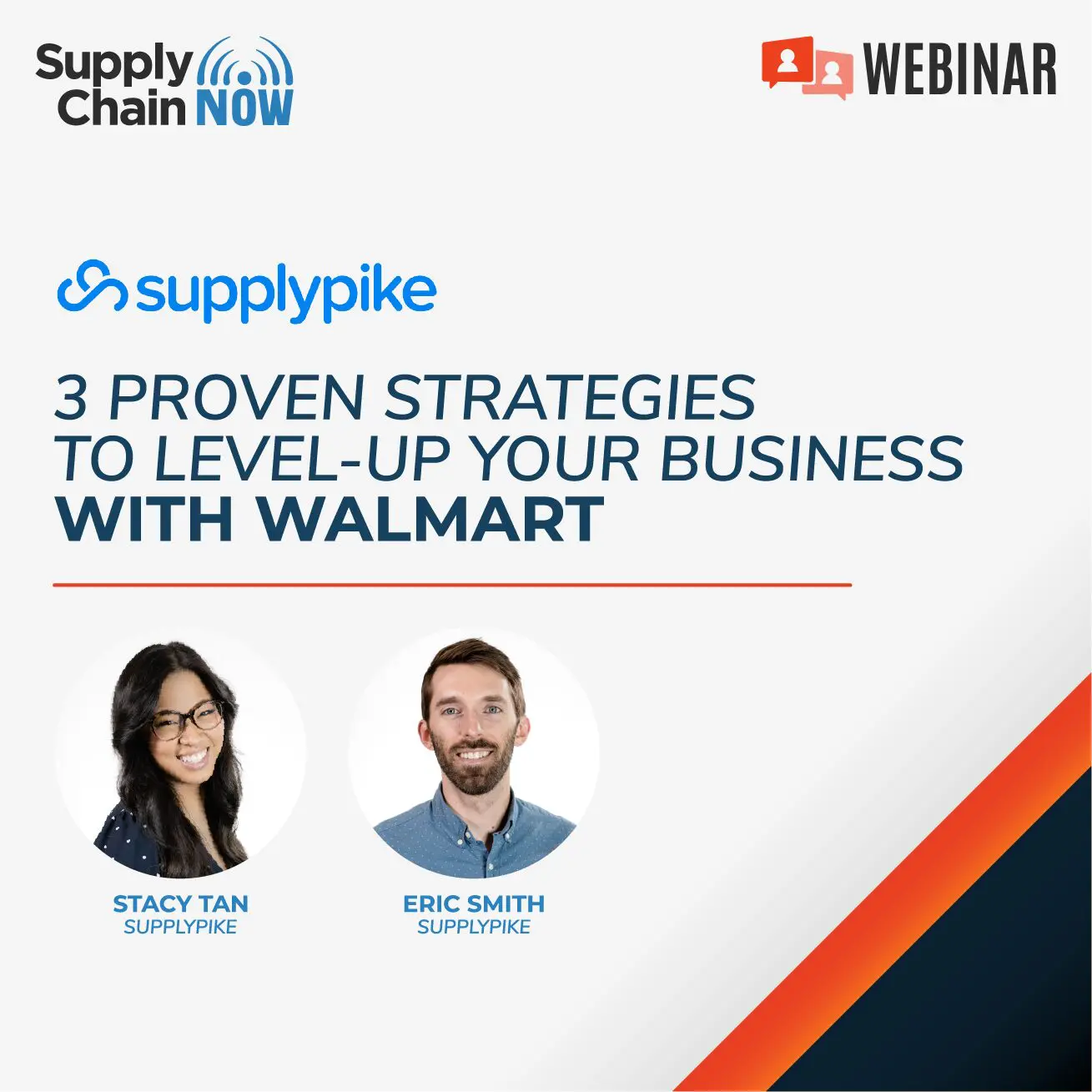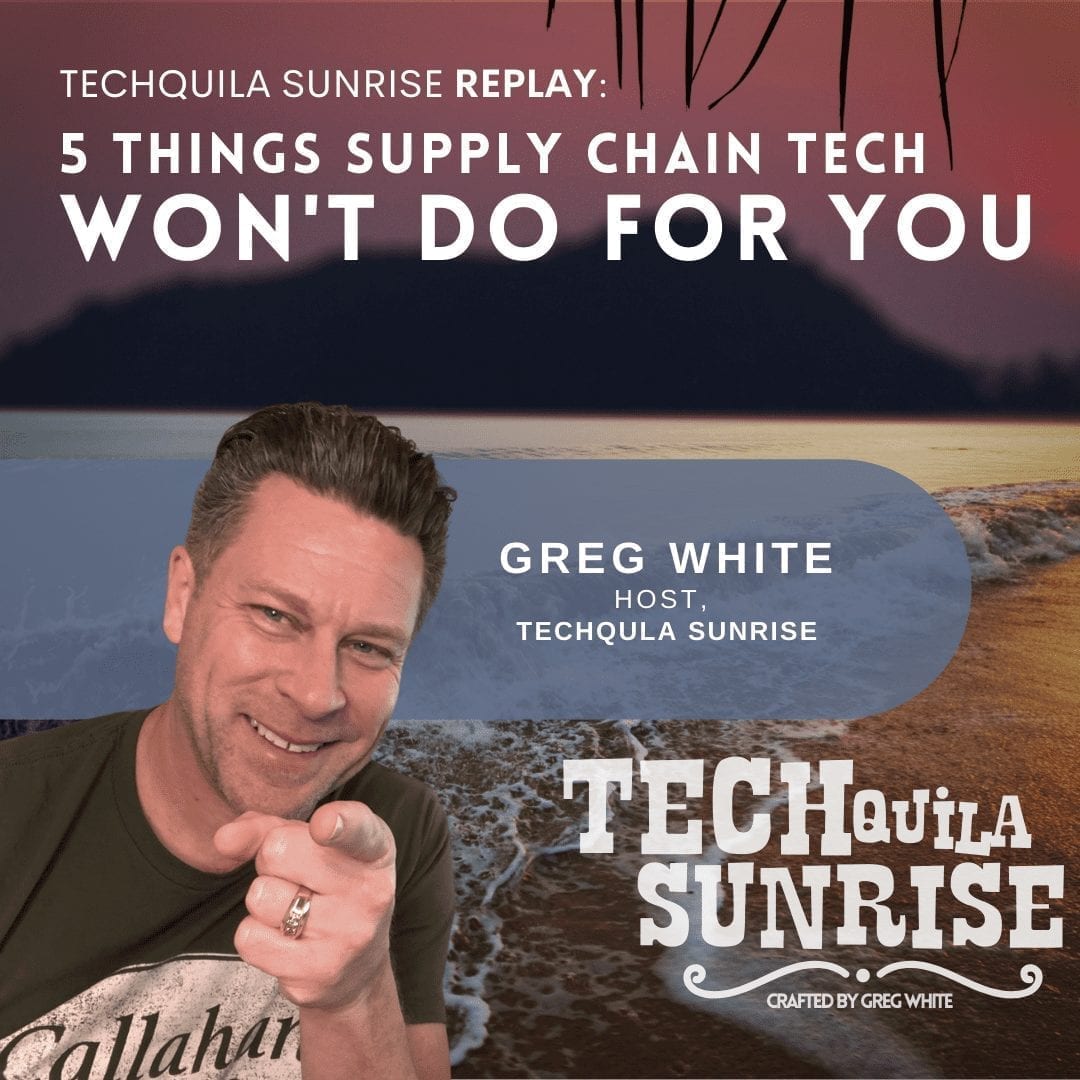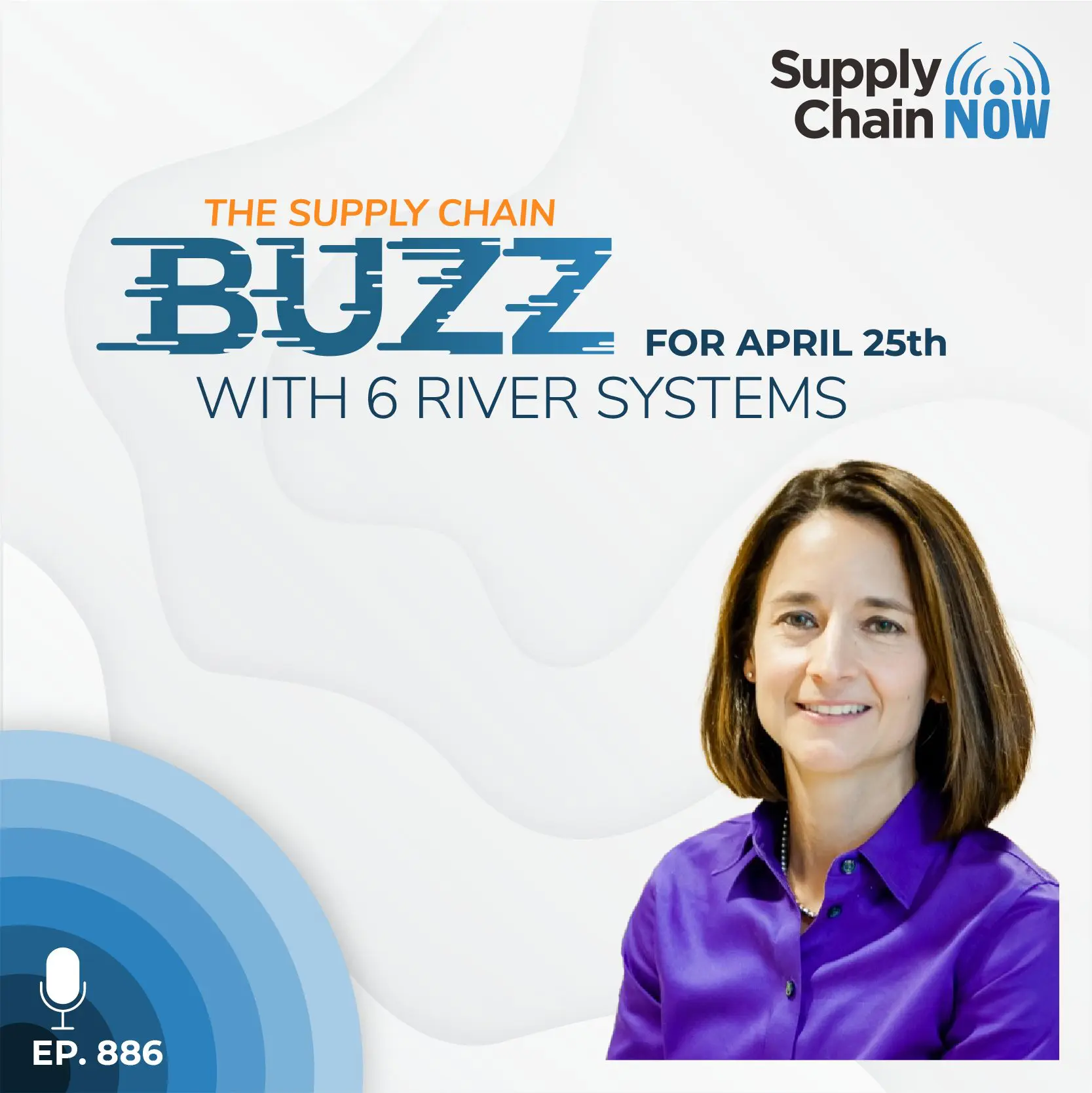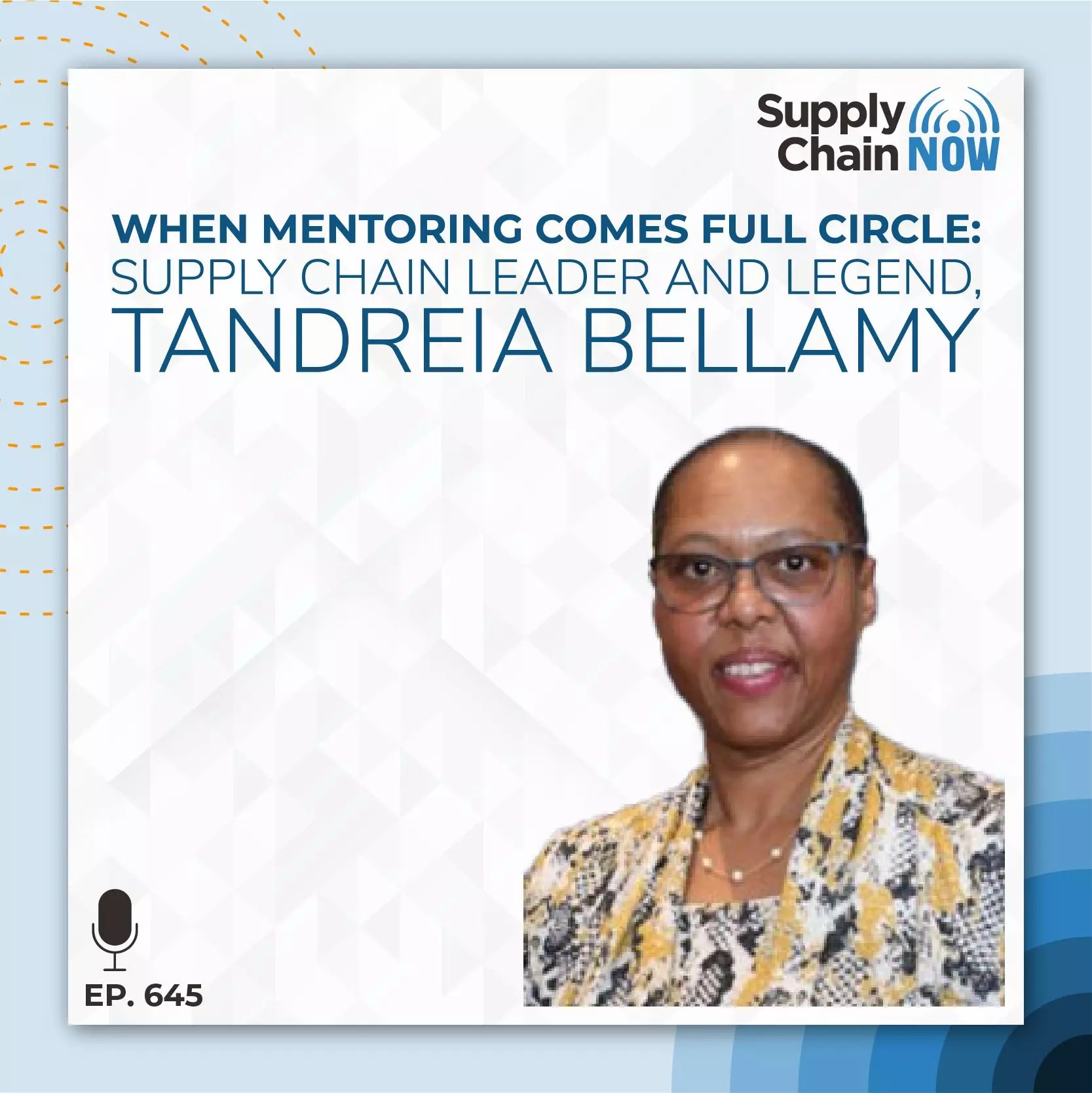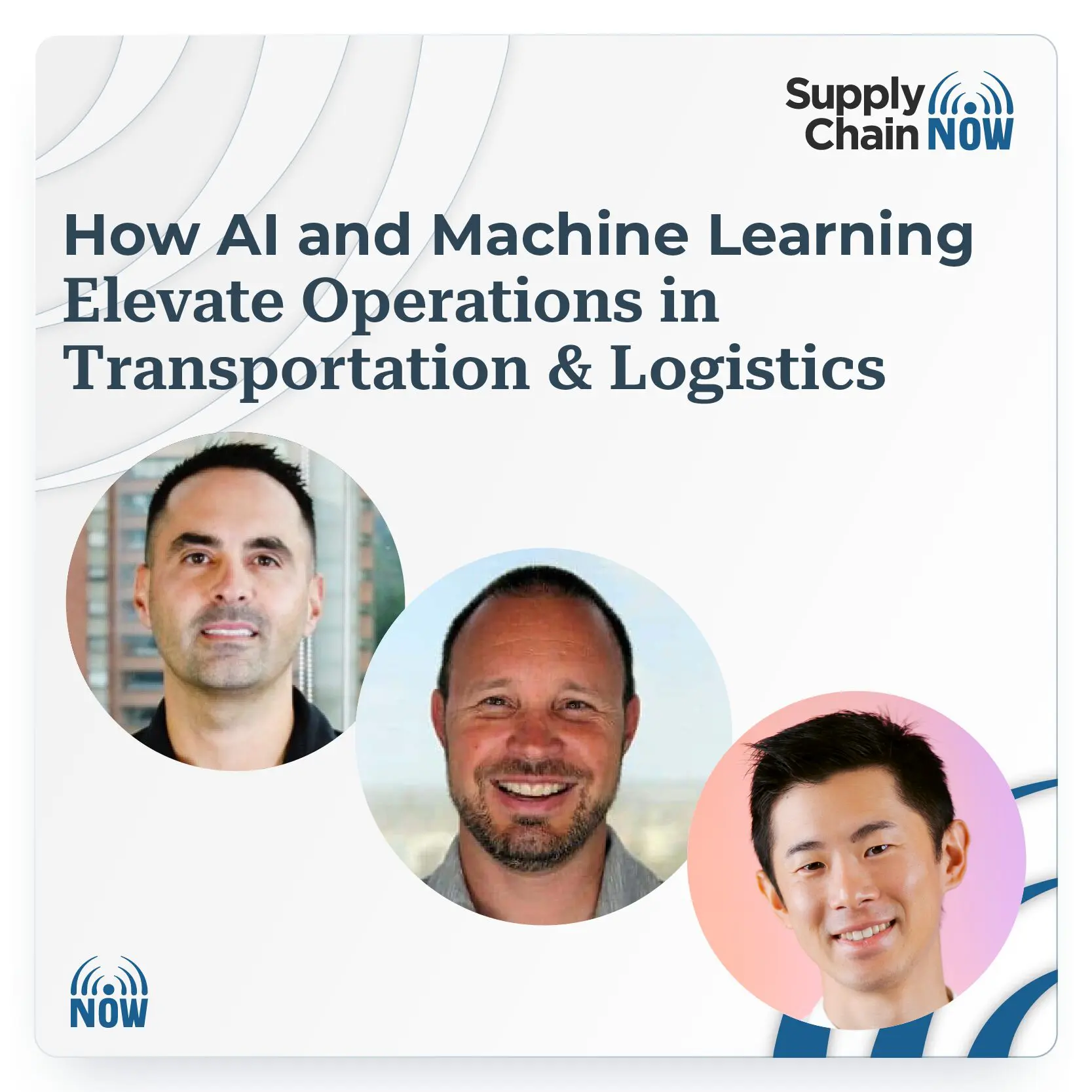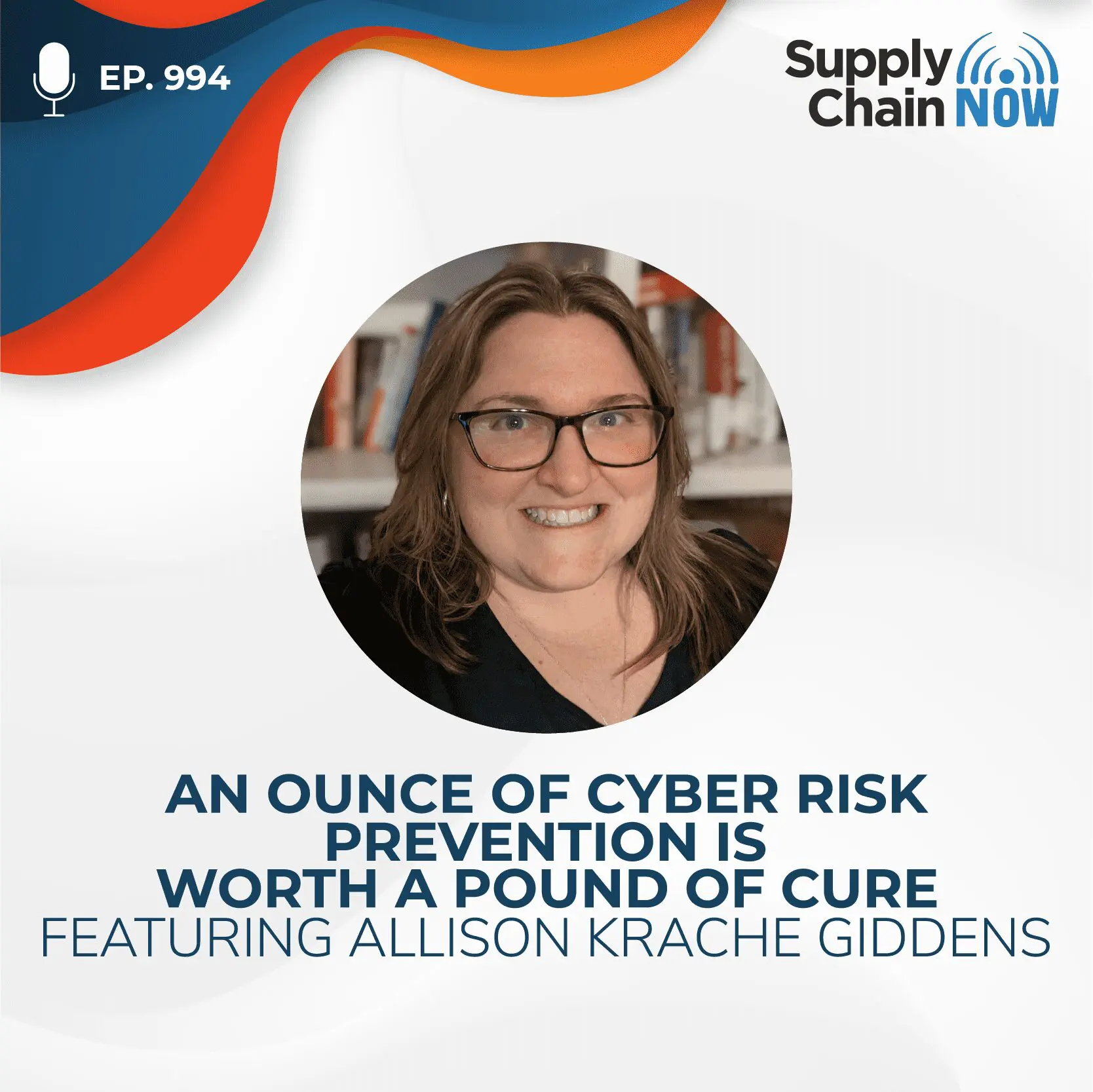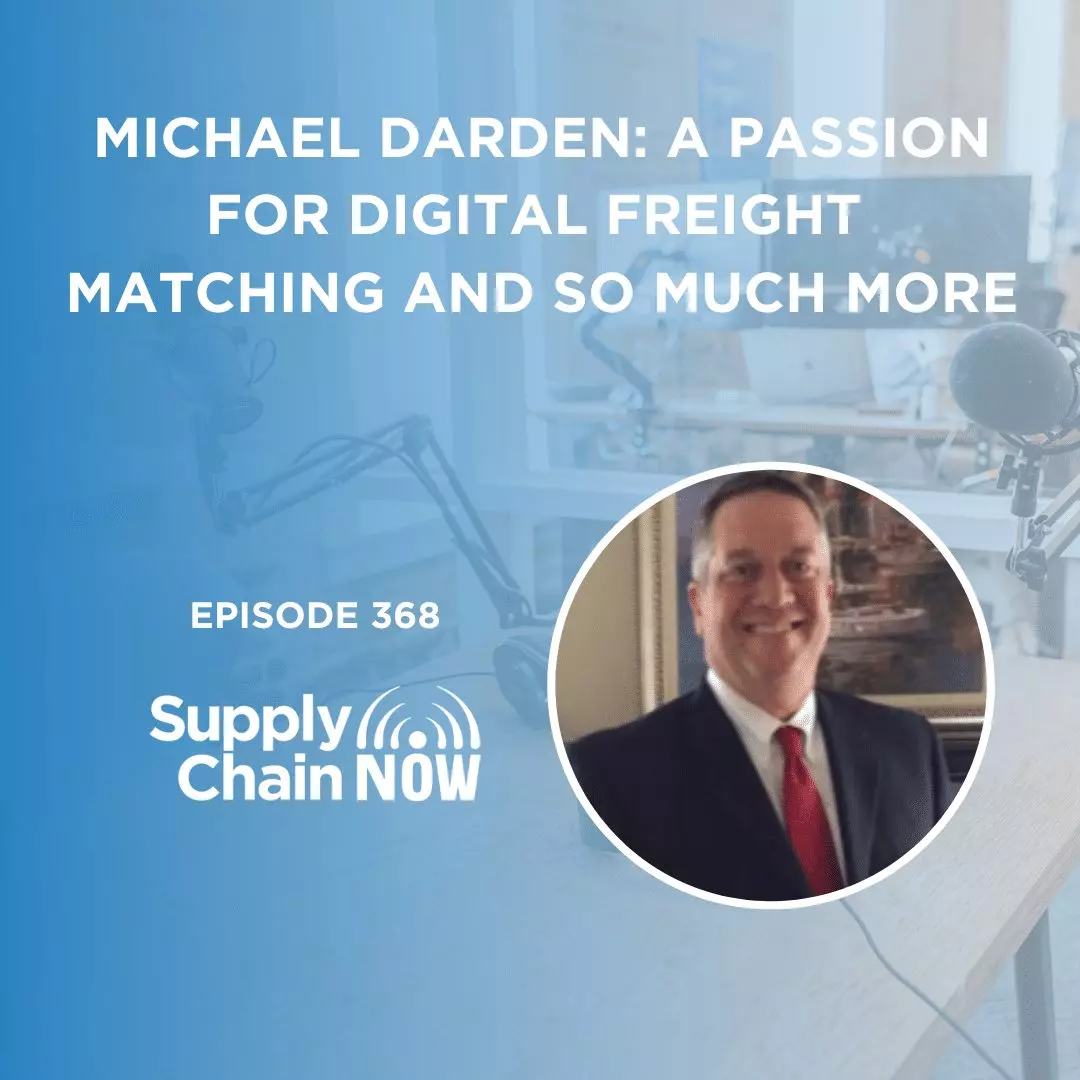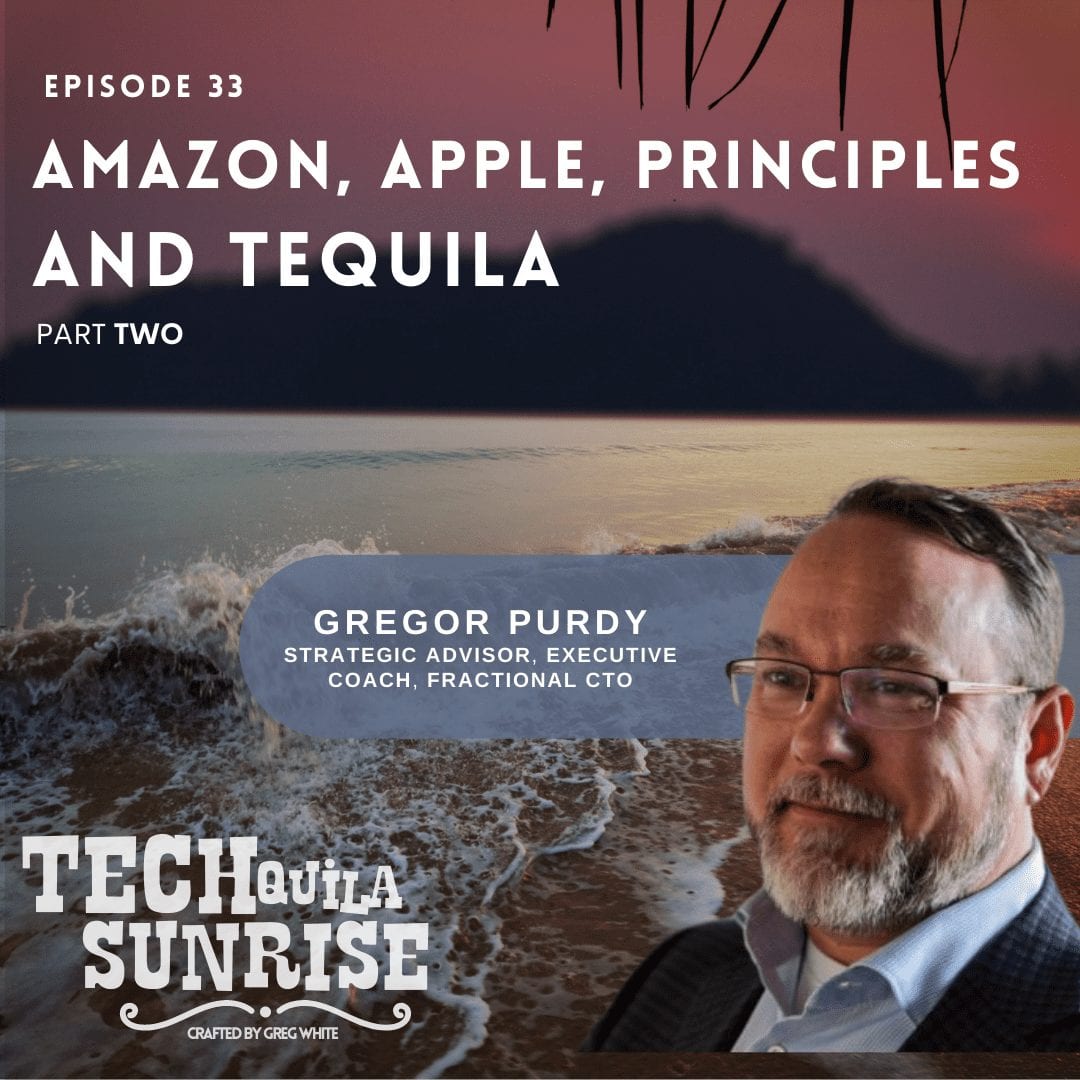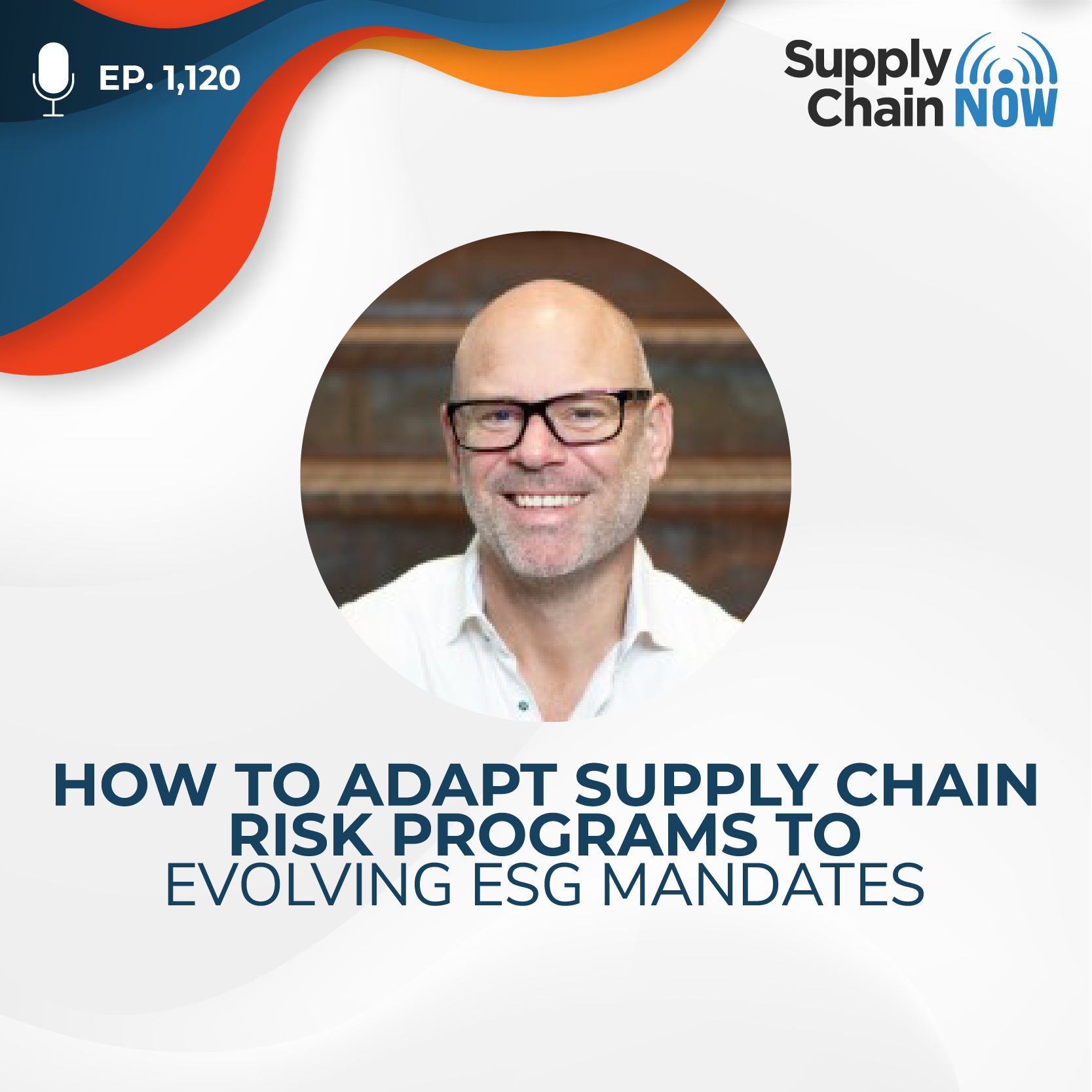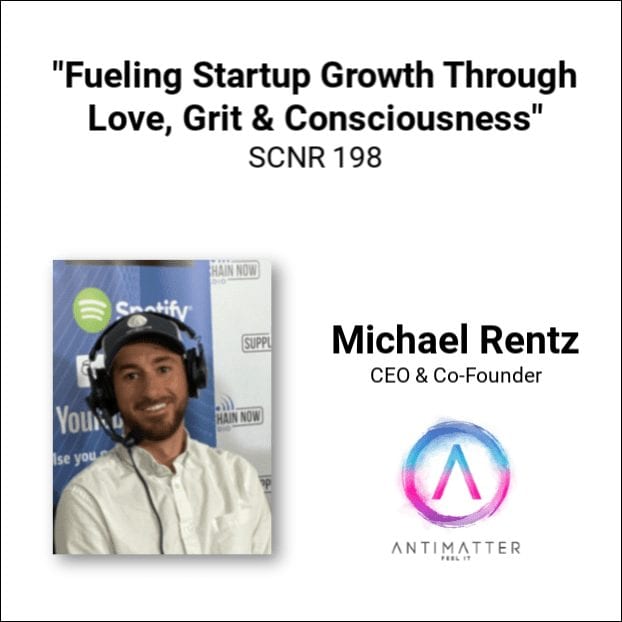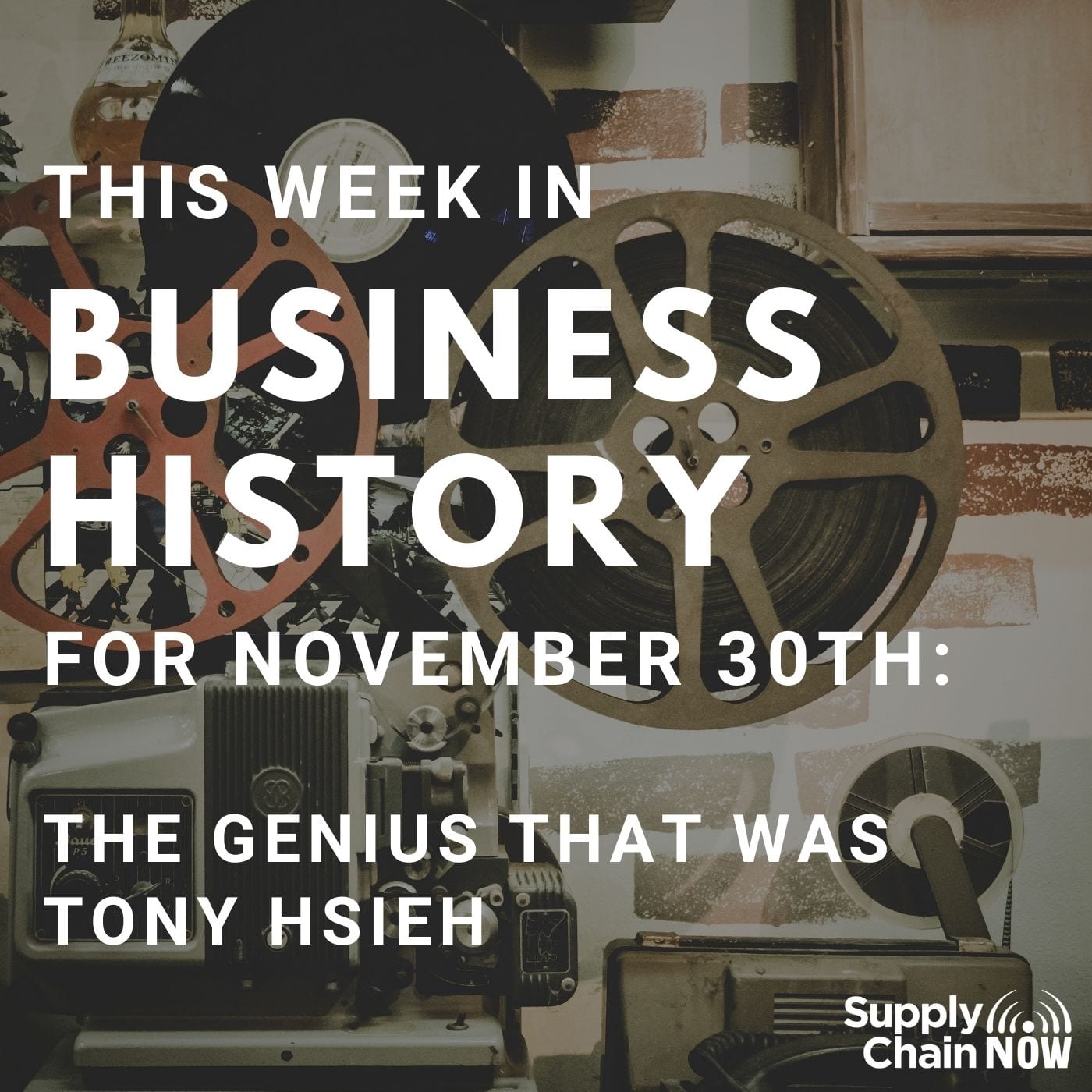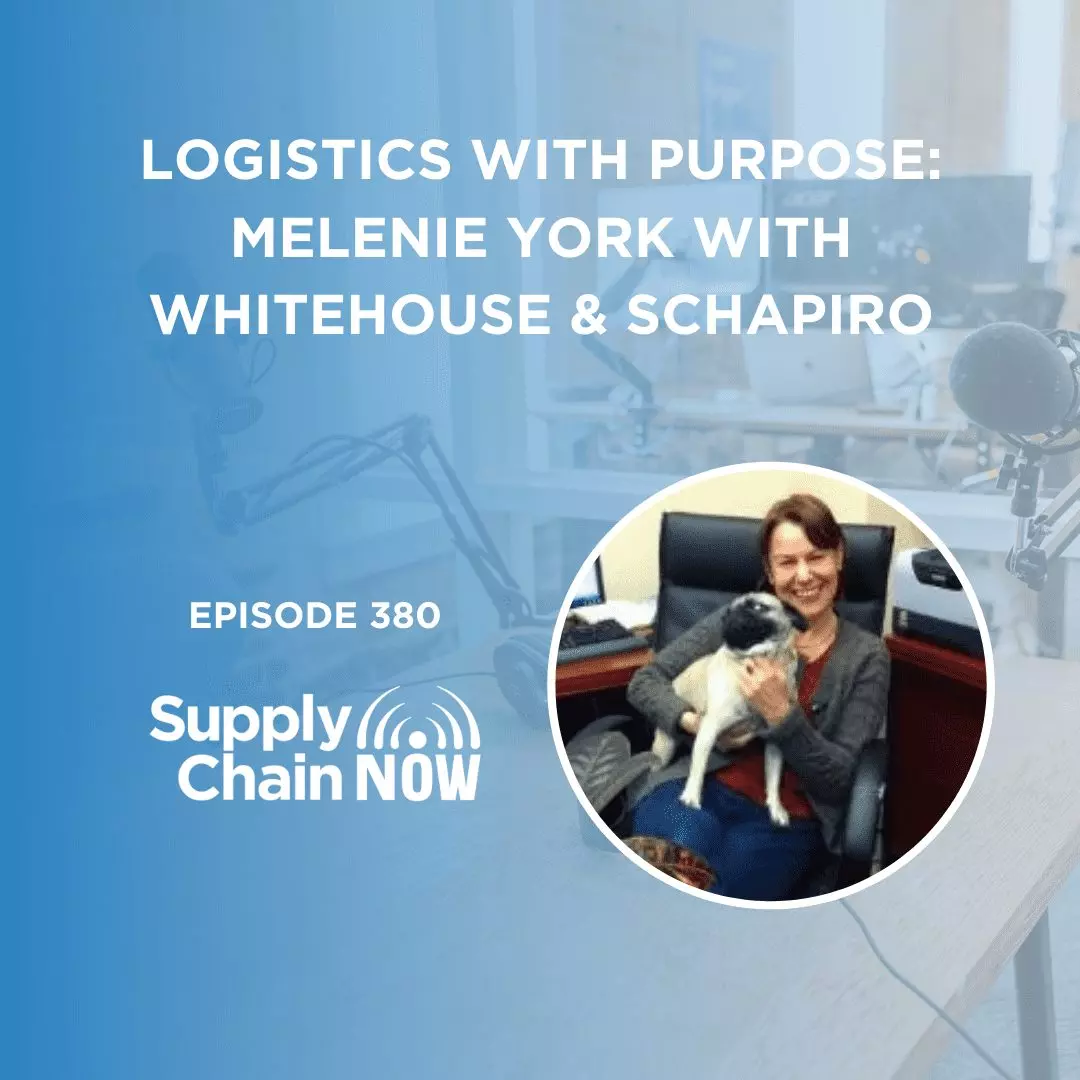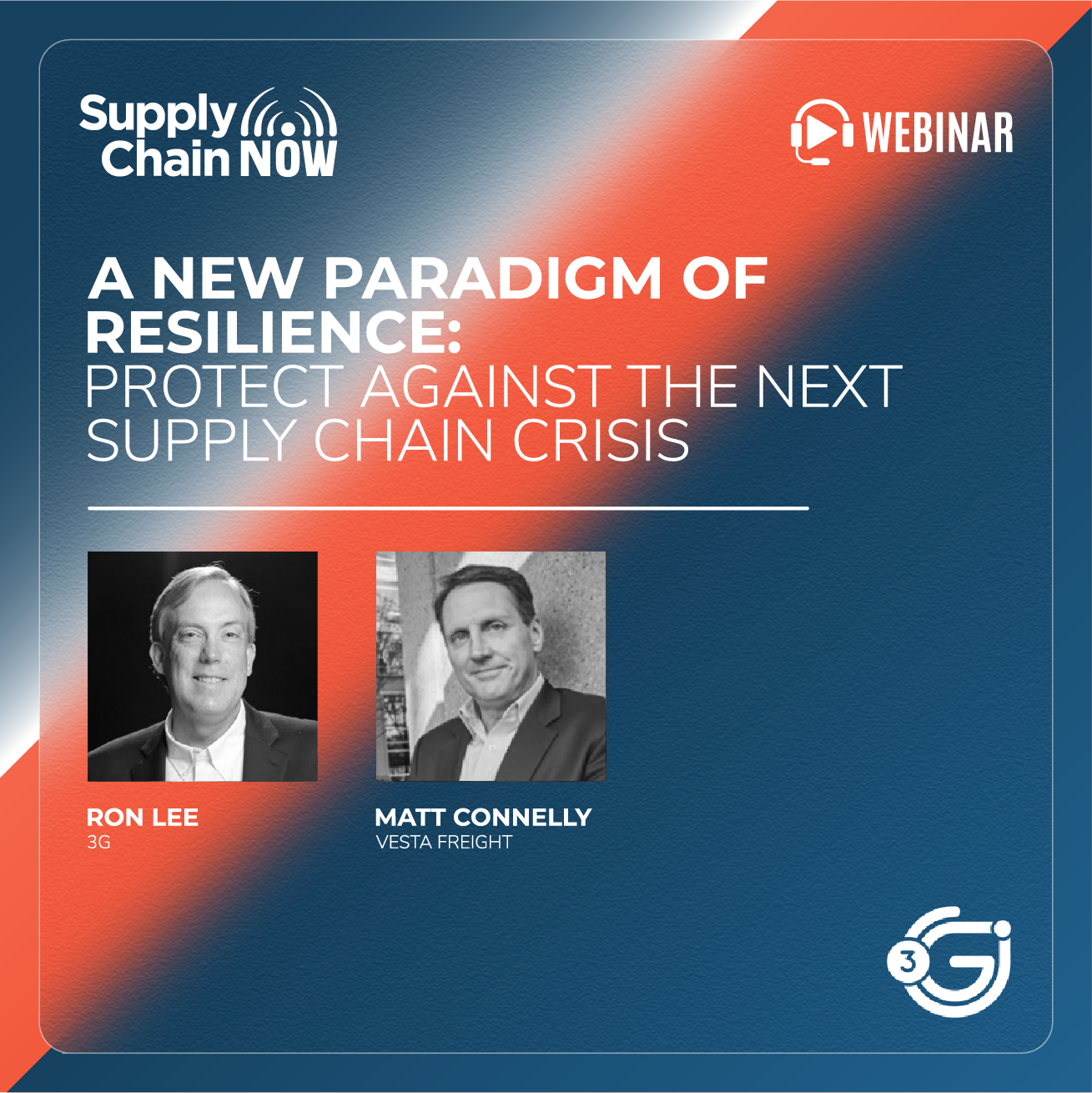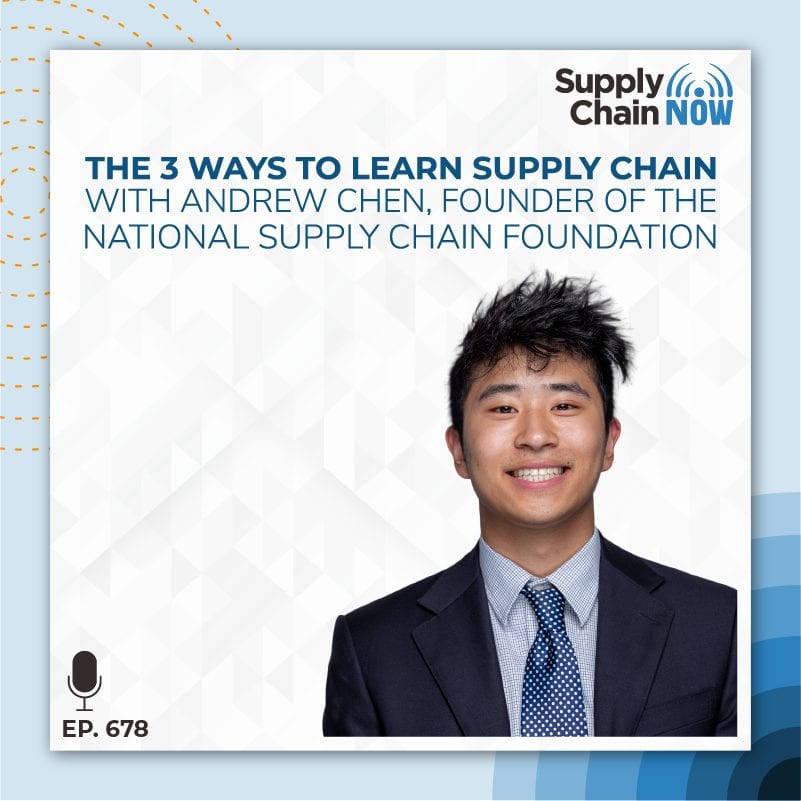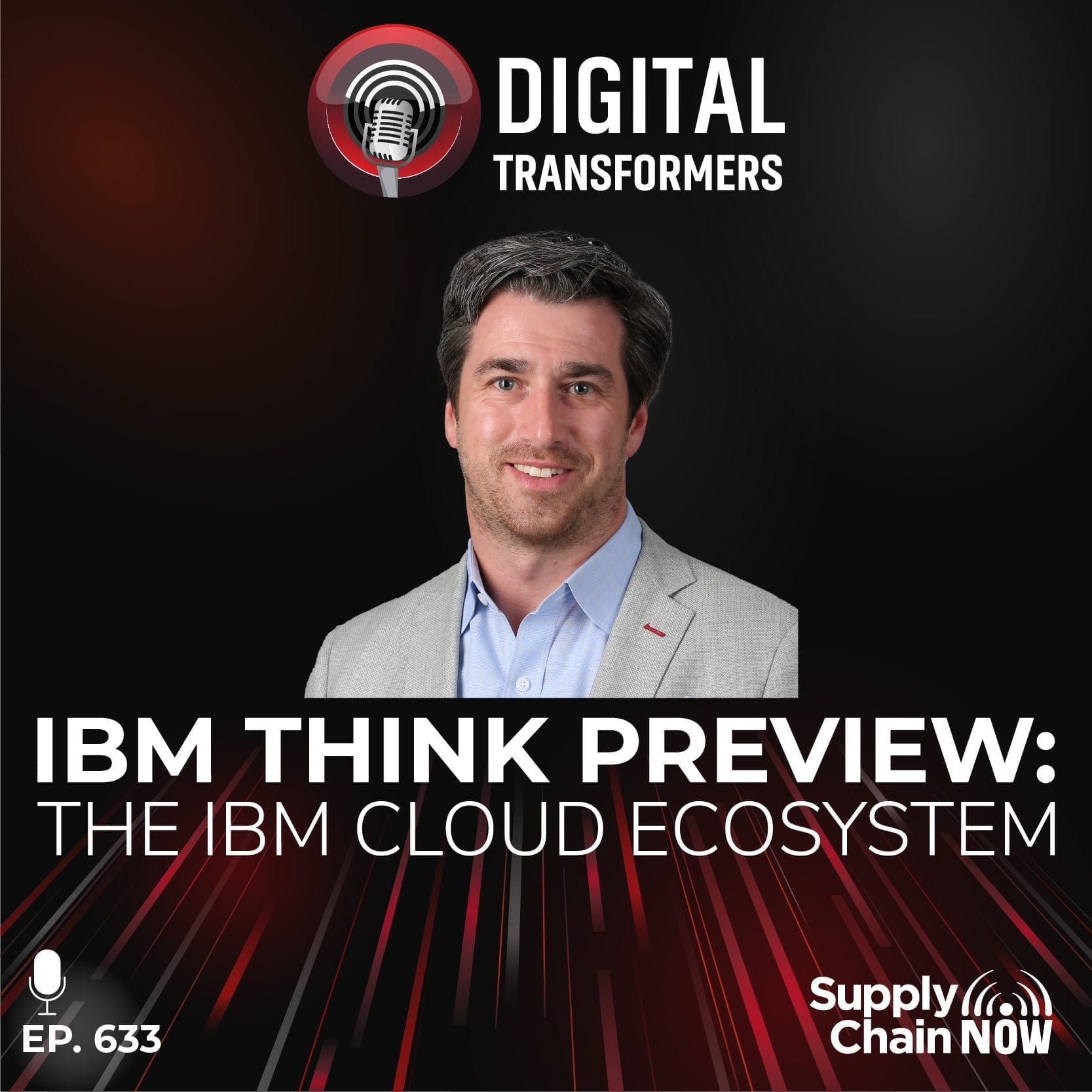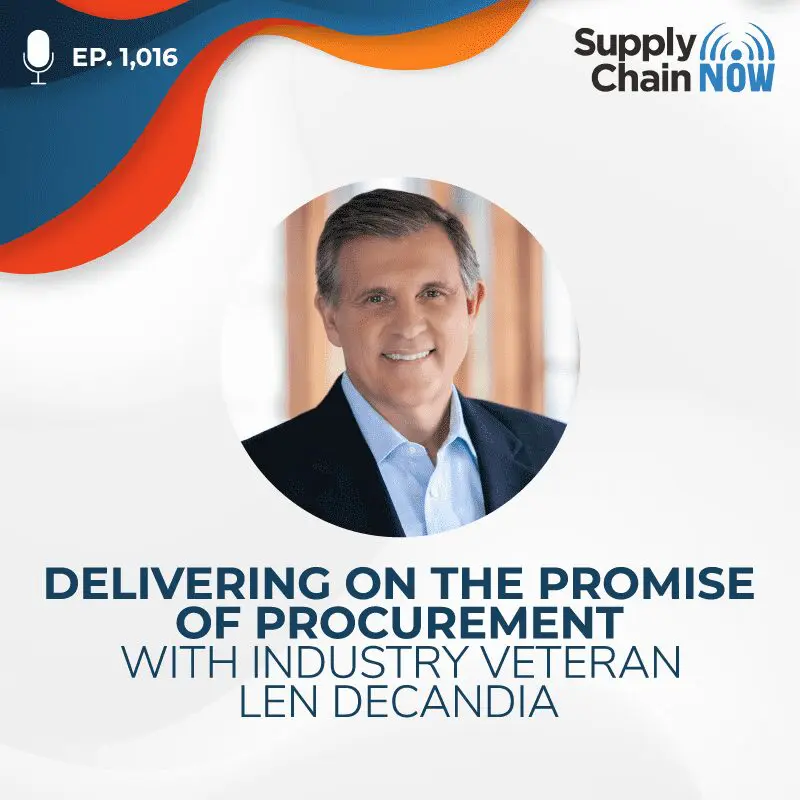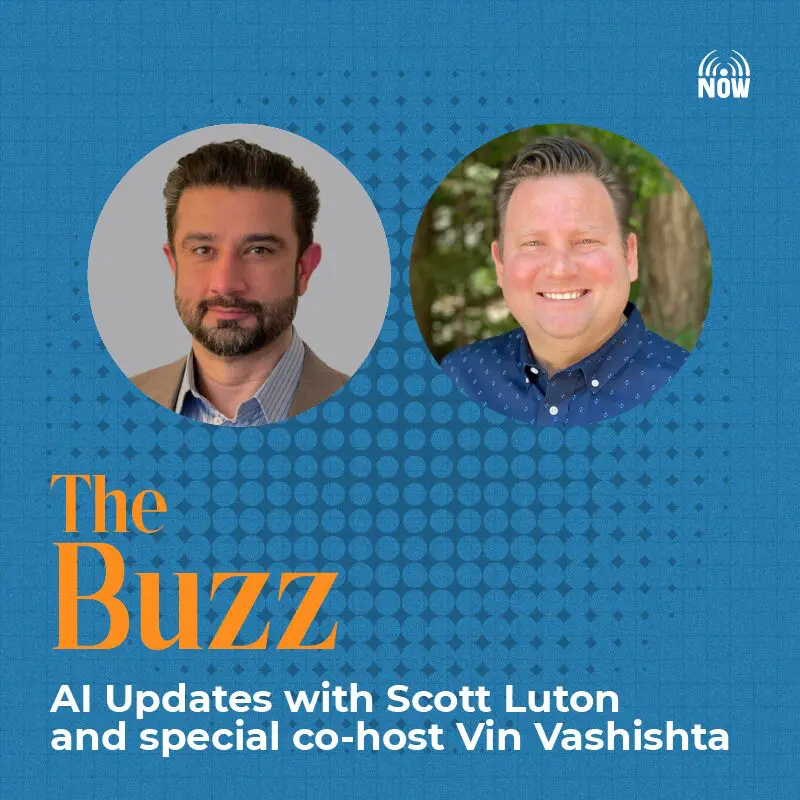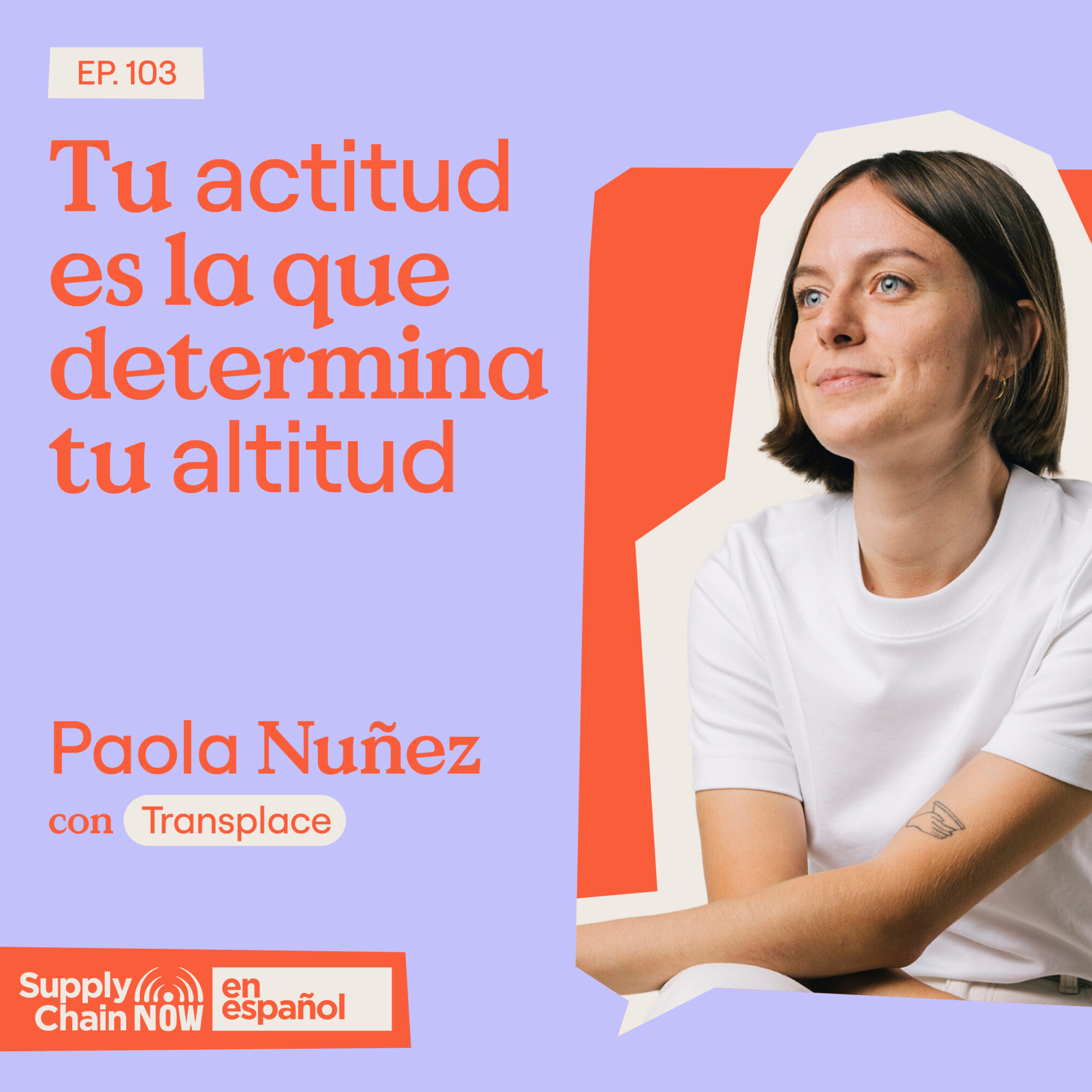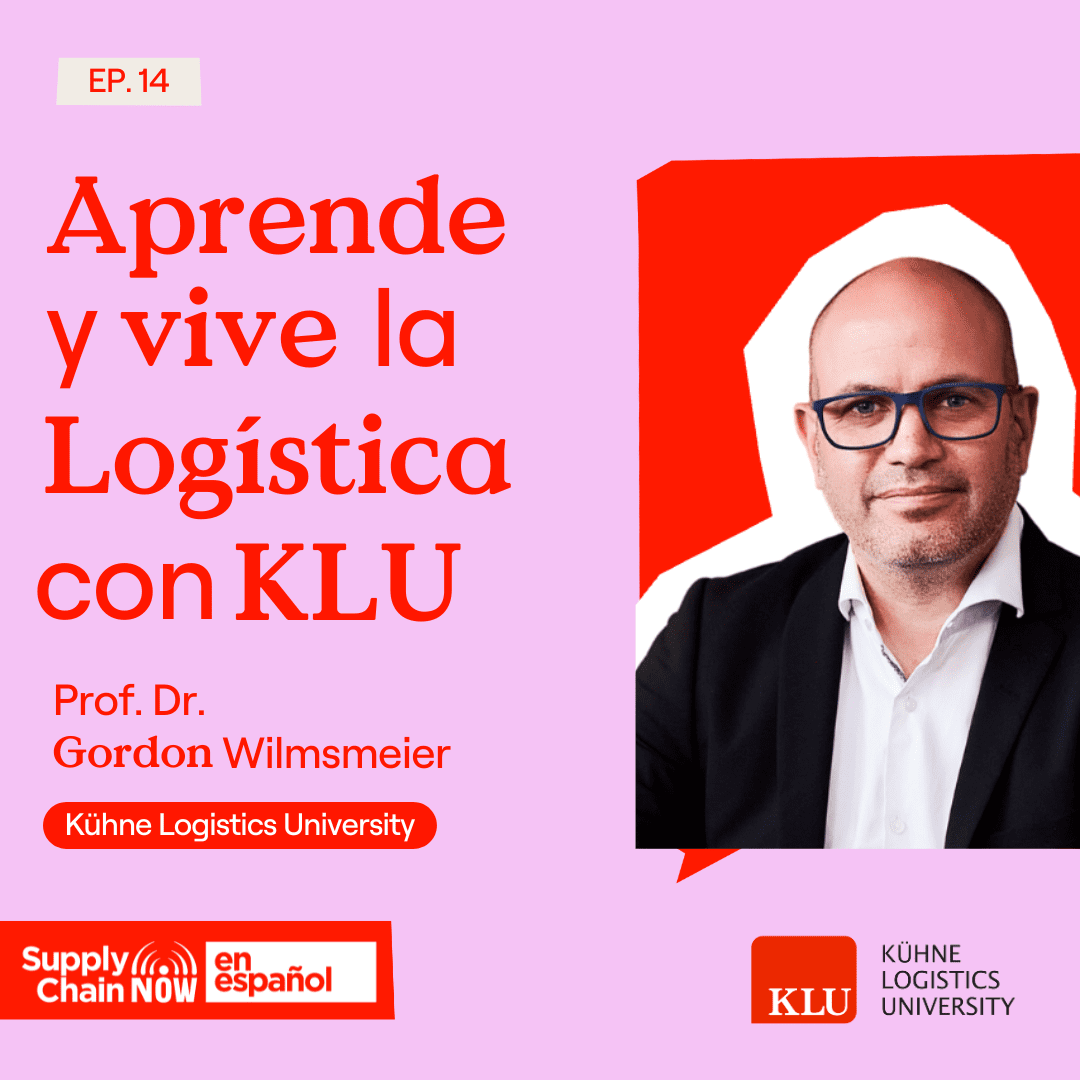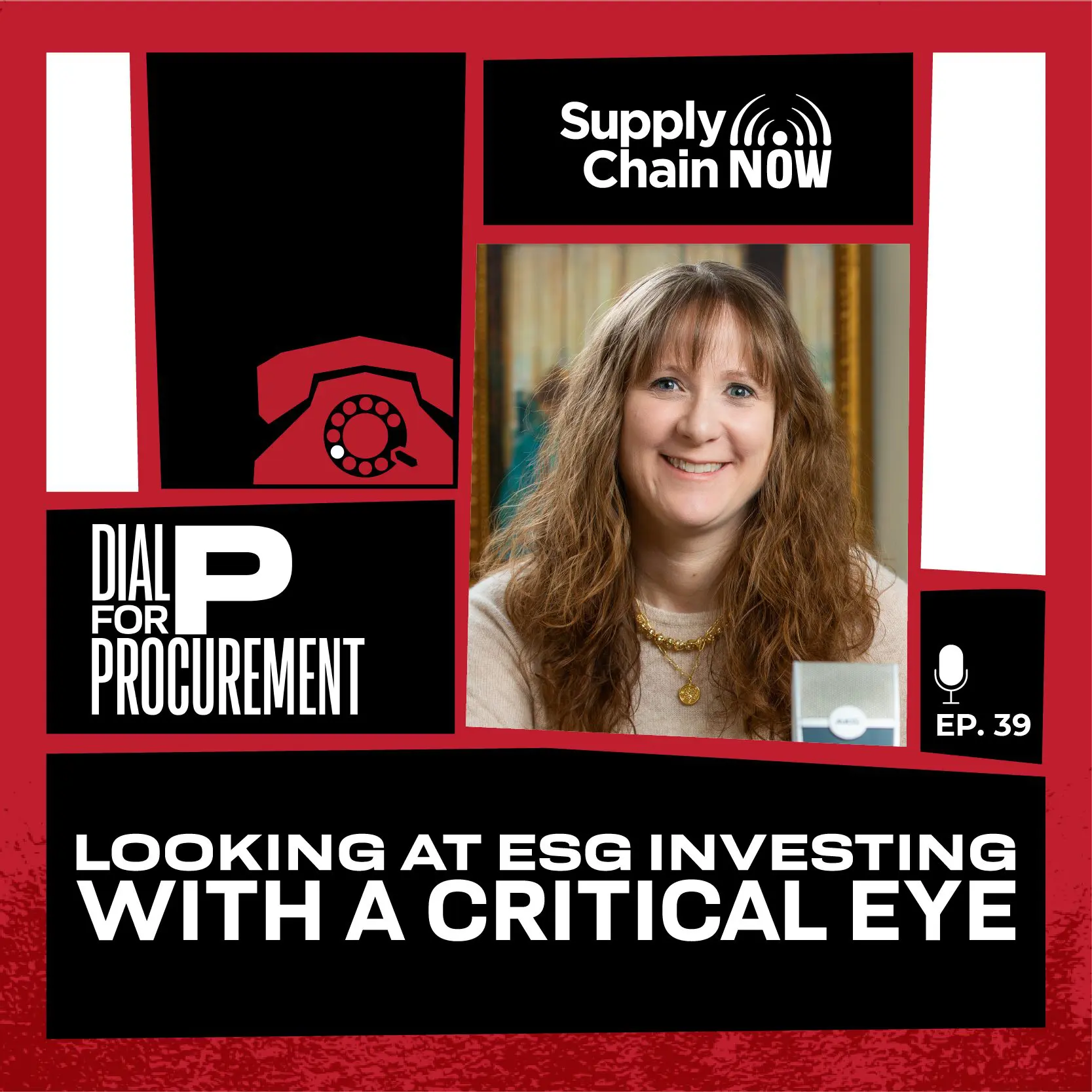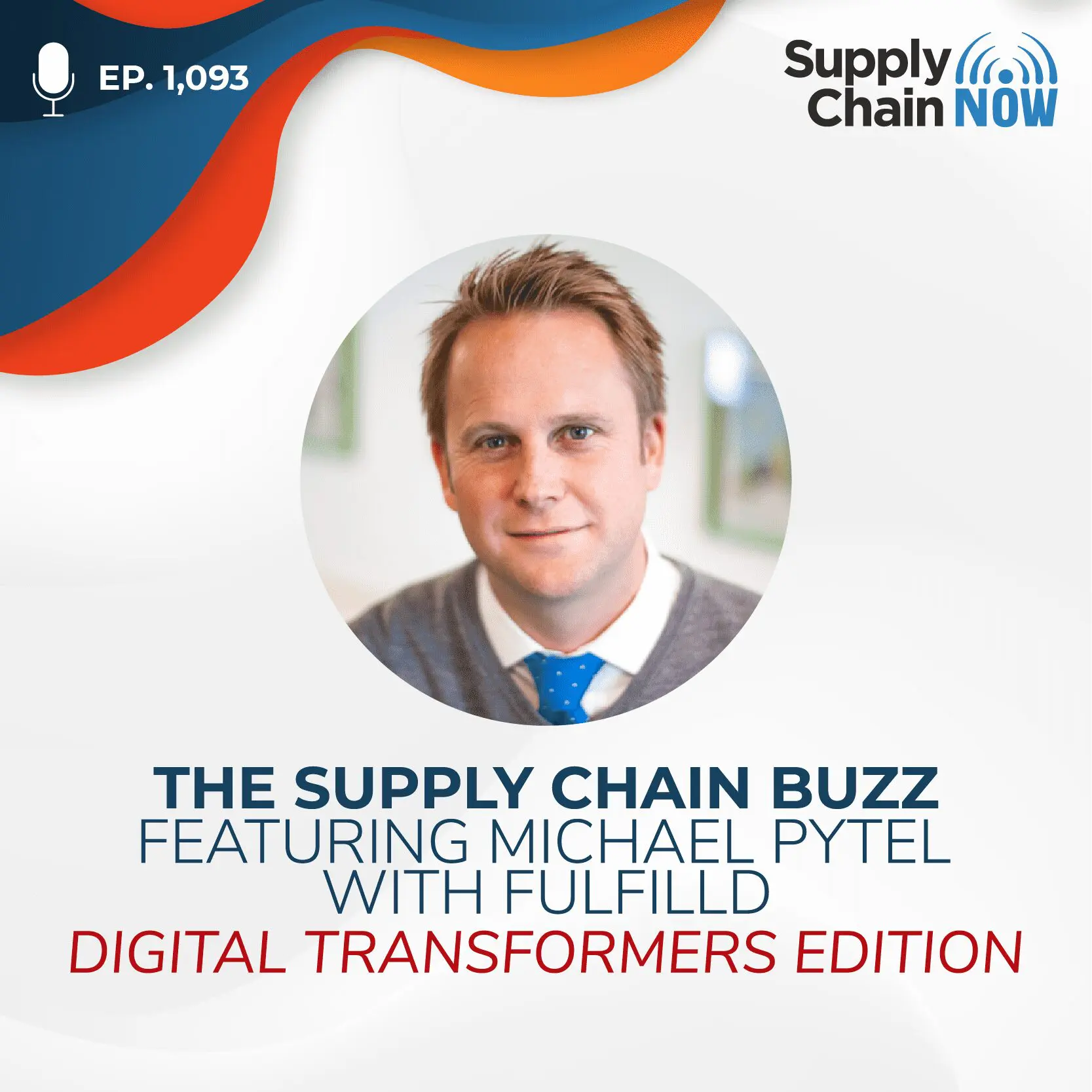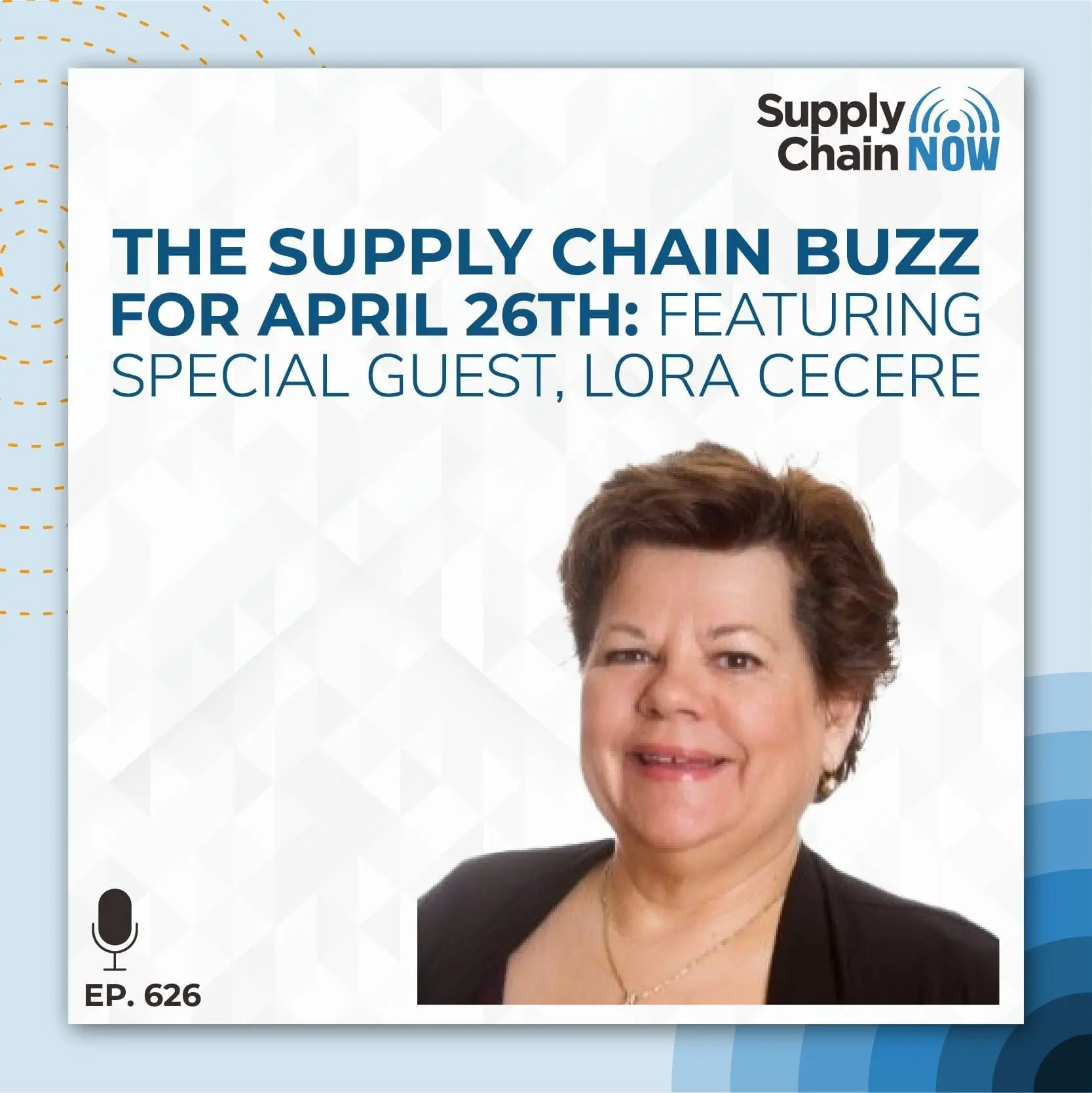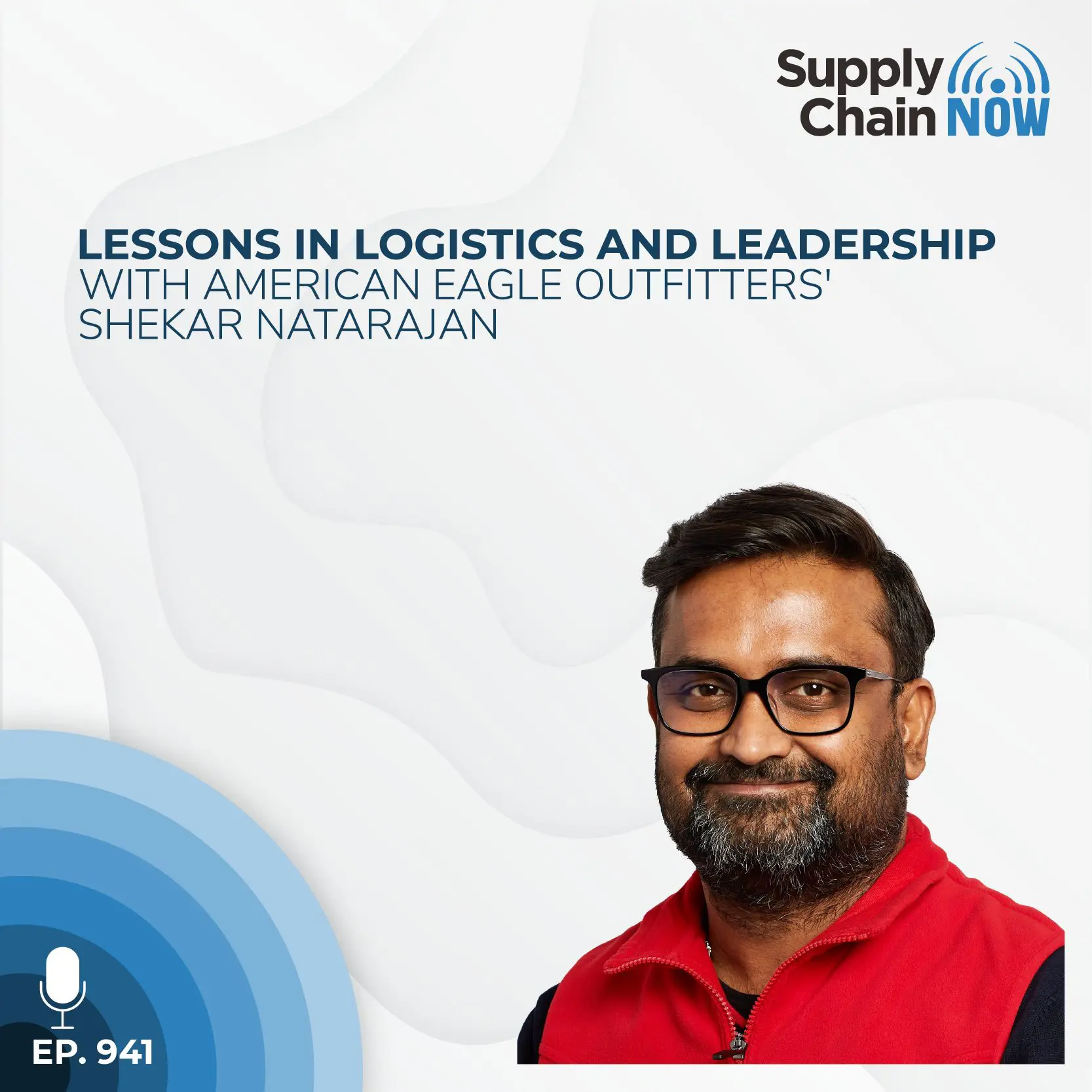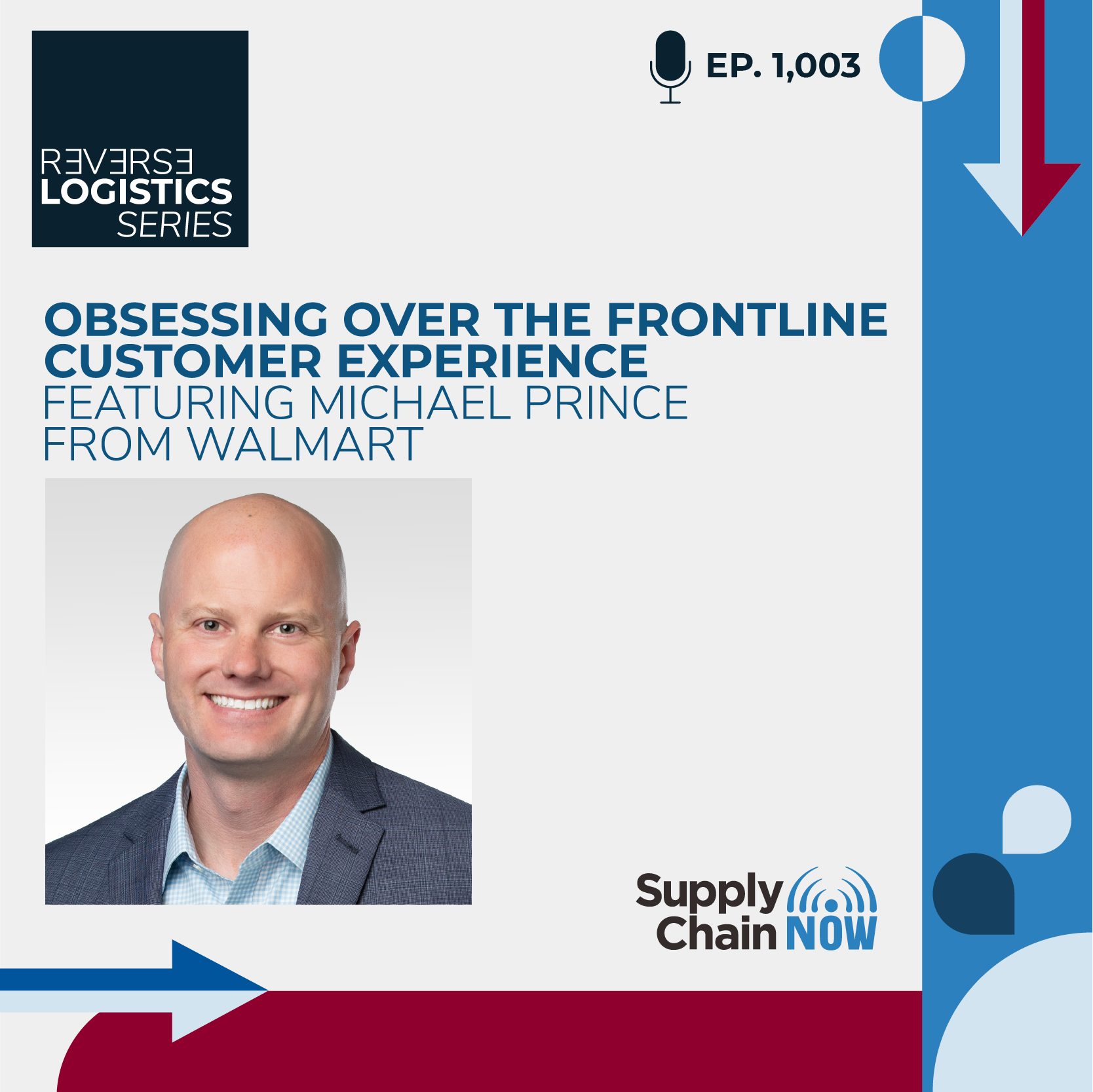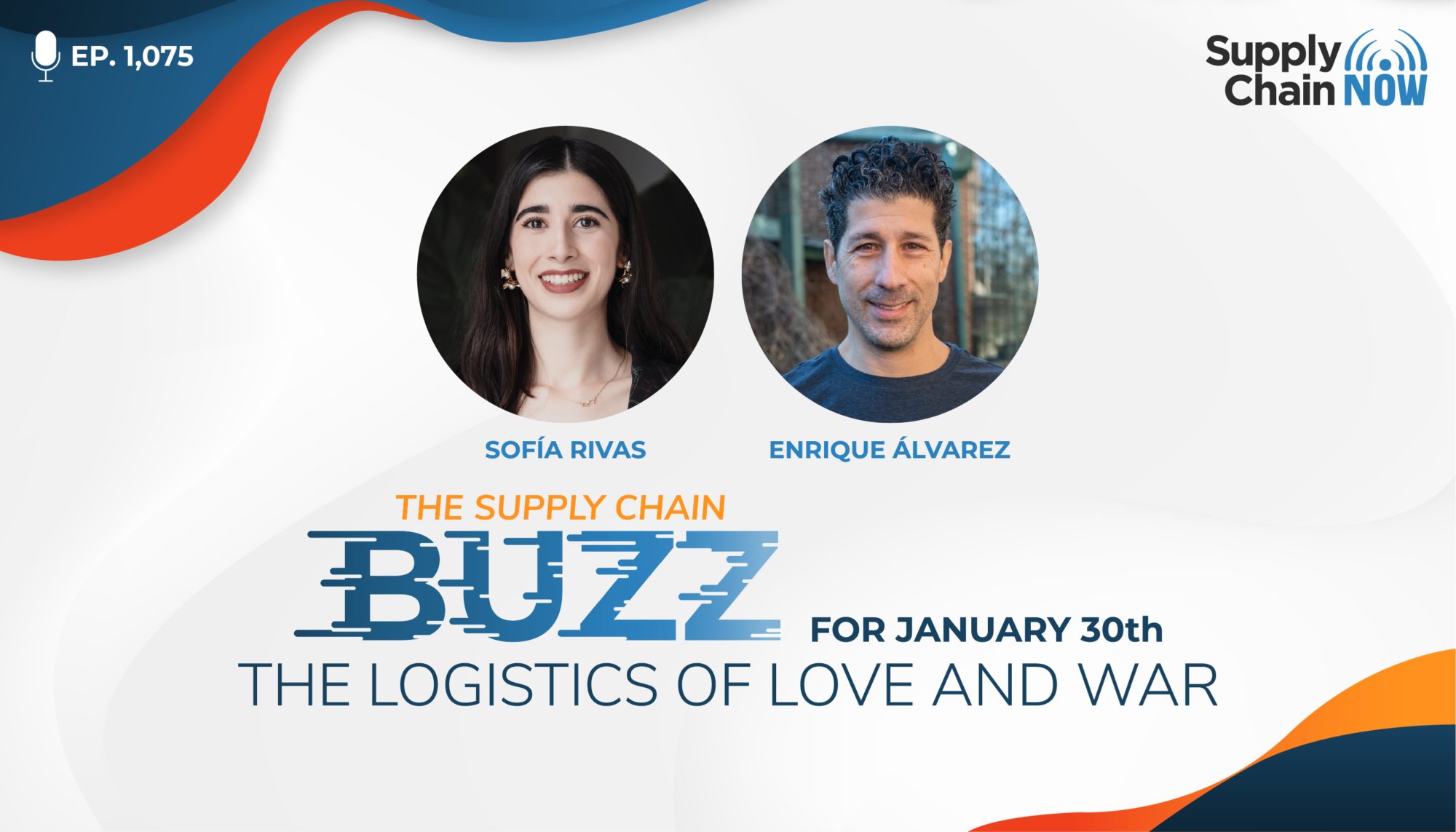
They're sending all these tanks that could have a huge impact in repelling the Russian forces, but at the same time, it's creating a very challenging situation for Ukrainian logistics teams who have to figure out how to move them, fuel them, and put them to good use.
- Enrique Alvarez, Host of Logistics with Purpose
Episode Summary
The Supply Chain Buzz is Supply Chain Now’s regular Monday livestream, held at 12n ET each week. This show focuses on some of the leading stories from global supply chain and global business, always with special guests – the most important of which is the live audience!
This week’s edition of The Buzz featured Scott Luton, Sophia Rivas Herrera, host of Supply Chain Now in Español, and Enrique Alvarez, host of Logistics with Purpose. In addition to talking about some of the top supply chain and business headlines, they marked the 37th anniversary of the Space Shuttle Challenger Disaster, and how that loss inspired many people to take on roles in technology and aerospace.
In this livestream, created in collaboration with a live Supply Chain Now audience, Scott, Sophia, and Enrique discussed:
• Why global supply chains (and consumers) might soon feel the pinch as demand for flowers spikes in the lead up to Valentine’s Day
• The comprehensive supply chain support that will be needed to help Ukraine fully leverage tanks recently committed by Great Britain, Germany, and the United States
• The intersection of retail trends and consumer preferences that has executive teams and supply chain operations taking notice
Episode Transcript
Intro/Outro (00:00:03):
Welcome to Supply Chain. Now, the voice of global supply chain supply chain now focuses on the best in the business for our worldwide audience, the people, the technologies, the best practices, and today’s critical issues, the challenges and opportunities. Stay tuned to hear from those Making Global Business happen right here on supply chain now.
Scott Luton (00:00:31):
Hey, good morning, good afternoon, good evening, wherever you are, Scott Luton, Sophia Riva Herrera, and Enrique Alvarez here with you on Supply Chain. Now, welcome to today’s live stream, Sophia, how are you doing?
Sofia Rivas Herrera (00:00:42):
I’m doing great. Starting the last Monday of January, finally, don’t you feel like January last so long,
Scott Luton (00:00:50):
<laugh>? You know, I can’t believe, I can’t believe we’re almost into February, 2023, so, uh, but I guess it was a long month for you, Sophia, is that right?
Sofia Rivas Herrera (00:00:58):
It, it felt that way, but good start of 2023.
Scott Luton (00:01:02):
That is right. That is right. Enrique, how are you doing?
Enrique Alvarez (00:01:05):
I’m doing great, Scott. It’s always a pleasure to be here with you. And of course, Sophia, very nice to see you again.
Scott Luton (00:01:11):
Well, we’re delighted to have y’all both here. Today’s all, all that supply chain budge. Every Monday at 12 New Eastern Time, we tackled the leading developments and news, really, across global business. Amen. We get to do it. Greg is on assignment, we’ll call it right, his Kenzie Chiefs won last night, so he’s on assignment doing some in-depth reporting. Uh, so we’ve got Sophia and Enrique with us here today, and we can’t be more delighted to walk through the news and, and getting y’all’s take on some of what’s going on out there. So, Enrique and Sophia, are y’all buckled up, ready to go? We’re ready.
Enrique Alvarez (00:01:44):
We’re ready to vote. We’re
Scott Luton (00:01:45):
Ready to go. All right. Y’all always ready? Uh, uh, I believe always ready. Uh, and folks, not only are you gonna hear me and Enrique and Sophia talk about what’s going on in global business, but we wanna hear from you. We see a bunch of folks already in the comments. We will be sharing your perspectives throughout. And, uh, and I wanna start by saying hello to a few folks, Sophia and Enrique. Let’s see who’s, who’s with us already here today. We’ve got, uh, conchen tuned in from India via LinkedIn. Great to see you here today. Uh, Cecil is back with us from Grain Rapids, Michigan, uh, also via LinkedIn, Shelly Phillips. She is a regular here, Sophia, Enrique. And Shelly always brings it from, uh, uh, the beautiful state of Colorado. Have you have either one of y’all been ever been to Colorado?
Sofia Rivas Herrera (00:02:31):
Not yet.
Scott Luton (00:02:32):
Not yet.
Enrique Alvarez (00:02:33):
I have. It’s a beautiful state. Beautiful state
Scott Luton (00:02:36):
For sure. It is. Uh, Shelly, great to see you here. And, and Sophia, I like your optimistic answer. Not yet. Not yet. Sounds like, uh, uh, you’re gonna, that’s on your bucket list, maybe. Um, Terry Butler tuned in from, uh, the awesome city of Chicago, also via LinkedIn. Great to see you here. Uh, Josh Goody. Hey, we’re getting the weather report, uh, right on cue from beautiful Seattle, Washington, sunny and 25 degrees Sophia Enrique, 25 degrees.
Sofia Rivas Herrera (00:03:04):
And that’s Fing height, right?
Scott Luton (00:03:06):
<laugh>, Josh, bu bundle up 25. That is cold. And I, and I wonder how much rain y’all have been getting. Uh, Catherine’s holding down the Fort Force on YouTube. Great to see you, Catherine. Happy buzz day. Indeed. Uh, hey, David, great to see you here, uh, via LinkedIn. Um, all kidding aside, very, um, really hated to hear about, uh, your family members. So prayers and best wishes are with, uh, your family. Uh, David, uh, and finally, I know we couldn’t, everybody, but Adrian, Adrian’s back with us here in Atlanta, ga open to connect. Love that as we all are. Okay, Enrique and Sophia. So before we get into our first, uh, item today, we’re gonna share something we put out over the weekend. Before we do that, uh, I’d like for both of y’all to give me and give our global supply chain now family. What’s one cool thing you did over the weekend? Sophia, you, you were sharing a couple things pre-show, and we’re gonna hear from Enrique too. But Sophia, what was the cool thing you did over the weekend?
Sofia Rivas Herrera (00:04:07):
Yeah, so I did, uh, an activity that I haven’t done for 20 years. So in my city, there’s every Sunday they close the streets and you can go on bikes or just walk them. And I did that when I was very little with my family once, but we never came back. And yesterday I went with some friends over there, and I was riding a bike again, and it was so, I mean, I feel like, uh, a whole new experience again. It was, it was nice. I didn’t fall <laugh>, so that was good
Scott Luton (00:04:48):
<laugh>. And it was, and the weather cooperated too. It was a gorgeous day as well, right, Sophia?
Sofia Rivas Herrera (00:04:53):
Gorgeous day. And it was kind of nice to finally, uh, experience and leave that those streets that you always go buy car. Mm. But you just suddenly see like, pedestrians only. That was nice.
Scott Luton (00:05:08):
Ah, I love that. Different perspective. Well, love that. And love is something new. You, you hadn’t done in 20 years. Uh, by the way, Jose, great to see you here. Love content. Y’all turn out, uh, so nice to see you, Jose, via LinkedIn, uh, from Las Vegas. Let’s go around. So, Jose, safe travels. Enjoy Las Vegas. Great to see you. Okay, Enrique, that’s gonna be tough to top. So Sophia did something she hadn’t done in 20 years. Really enjoyed it. I can, I just love the picture she painted and she described it. What’s one thing you did this weekend?
Enrique Alvarez (00:05:37):
Not gonna even try to top it. I’m sure that it was a lovely day biking, uh, 25 different scale though, uh, weather. Yeah. Uh, but, um, I, we had some friends over for dinner on Saturday, and we haven’t really seen them in a very long time before the pandemic. So we, we had a blast. And I did want to say something, uh, to Jose Montoya. He’s in Las Vegas or in Nevada. And, um, there’s the manifest, um, correct manifest conference this week. And so I’ll be there. I know if Jose will be there, but if Jose, you are just, let’s see if we can meet.
Scott Luton (00:06:11):
Well now, Enrique, you’re really humble, but you’re one of the, uh, you’re one of the, uh, esteemed speakers at manifest this coming week. So looking forward to hearing all your good things as you wow them.
Enrique Alvarez (00:06:23):
Yeah.
Sofia Rivas Herrera (00:06:23):
You, you made it sound that you were just an ee <laugh>. You’re not
Enrique Alvarez (00:06:27):
<laugh> Well, we’ll be speaking too, but it’s a very, very good conference. It’ll go the whole week. So I just, yes,
Scott Luton (00:06:34):
I always, uh, too humble. But love that Enrique, looking forward to hearing your key takeaways from the week coming up. Okay. So, uh, on a different note, kind of switching gears here, I wanna bring this in. So, uh, Enrique and Sophia, uh, once a week we published with that Said, right, it’s a, uh, LinkedIn newsletter put out by the supply chain now team, uh, that we’ve been doing, I don’t know, for probably three or four months now. Um, and we try to make it to be very different content than, than everything else we do podcast streams, webinars, whatever. And this past weekend was the 37th anniversary of the Space Shuttle Challenger Disaster. Right? Uh, that iconic moment for, for, um, a lot of folks, at least, uh, maybe in, in my generation and others, you know, exactly where you were when you got the news, you know? And, uh, and it’s just a terrible, terrible loss, um, for, uh, seven astronauts, their families. Um, the space program, uh, you know, was set back for quite some time. Uh, I wanna ask y’all a quick question. Um, do you remember where y’all were? I mean, Enrique, do you remember where you were when you saw the news about the challenge?
Enrique Alvarez (00:07:38):
I, I, I don’t exactly remember where I was. I was in Mexico City at the time, and I remember actually watching it on tv. I could have been either with my mom or my grandmother, cuz they usually dropped us off at my grandmother’s house, um, before school sometimes. But, uh, I do remember the image when the whole thing happened, and then it was just definitely sad.
Scott Luton (00:08:01):
It was awful. Awful,
Enrique Alvarez (00:08:02):
Awful. Yep.
Scott Luton (00:08:03):
Sophia, any thoughts about the, the shuttle program or the, the challenge disaster?
Sofia Rivas Herrera (00:08:08):
So that was on 86, right? That’s
Enrique Alvarez (00:08:10):
Right.
Sofia Rivas Herrera (00:08:11):
So I was still being, uh, planned in my family to appear in the world. Yep. And Albert, I, I do, I do recall it through my family’s, uh, memories of what they were doing. And I think, uh, there was a high expectation from everyone to work, right? Mm-hmm. For that to work. And also a lot of excitement. I think at least my dad had, uh, his hopes up, uh, when he was a kid to be an astronaut, really. And when he saw that it, it was actually happening, he, uh, was very excited about it. Mm-hmm. <affirmative>. And, and I do remember when, when learning about this event, uh, it was very tragic and also it kind of made everyone feel like, okay, what, so it’s not, we are not able to do it. Mm-hmm. But I think that apart from that, uh, we carried on, right?
Scott Luton (00:09:10):
Yes, that’s right.
Sofia Rivas Herrera (00:09:12):
It wasn’t a, uh, complete loss of effort and, and hard work, but also like a way of, I would say, transcending these astronauts, transcending everyone’s lives.
Scott Luton (00:09:25):
Right? Yeah. Well put very poetic, Sophia. And, uh, I’d love to learn more about your father’s, um, uh, aspirations of be an astronaut. Cause I, I really think, uh, the shuttle program, cause it ran from the, um, late seventies through 2011. So my daughter, my oldest daughter was two years old when the, the shuttle came to an end. So they don’t know a whole bunch about, uh, the shuttle program, but to your point, Sophia and Enrique, I think it did. Um, it inspired the program really inspired all sorts of folks around the globe, right? And I think the silver lining, which you kind of spoke to there, Sophia, with a challenger disaster, you know, these seven brave souls right here, uh, really, um, they, they became, uh, inspirations and, uh, inspired many folks to, uh, serve, whether you’re in the space industry or whether, you know, you’re doing something else, um, you know, from a, especially from like a technology standpoint.
Scott Luton (00:10:22):
So, you know, lives were not lost in vain by any means. Uh, and, and a c a few folks, Larry, great to see is watching it on tv as, as was I, uh, Larry in grade school. Uh, David was watching it at school, you know, uh, Kristen McCauliffe was the school teacher that was going up on the Challenger on that fateful day in 1986. So, um, but lives were not lost in vain. Hopefully we can all find some inspiration, uh, not just with the shuttle, but, um, uh, each of those seven astronauts. So, so tying it all together for, with that said, we’re really focused on snippets of each of those seven astronauts. Maybe some things you didn’t know about their background and whatnot. So, um, check that out. Every, uh, Saturday. Uh, usually Saturday morning, it kind of depends on how busy Enrique and Sophia our Saturday morning is.
Scott Luton (00:11:11):
So, um, anyway, moving right along. So y’all ready to dive into our first story here today, Enrique, Sophia? Yes, absolutely. All right. On a much, much lighter note, we’re gonna be talking about flowers, right? So I wanna start with this story as Valentine’s Day is just around the corner. Now, Valentine’s Day, y’all might know this, the number one holiday in the US for spending on flowers tw get this. 28% of all money spent on flowers for all holidays, all year long is spent all on Valentine’s Day. But as reported by Global Press Journal, supply chain issues, like everything else, continue plague the flower industry. Now, this story, I’m gonna probably say this name incorrectly, Enrique and Sophia, y’all help me out here. <laugh>, uh, zec Z um, ZEC contin. Zenin, am I coming close with that, that region in southern Mexico? No, not Okay.
Enrique Alvarez (00:12:07):
<laugh>, please. Sorry, even close, please. So I’ll let Sophia actually take this one, cuz I believe it’s close to where she is.
Sofia Rivas Herrera (00:12:15):
Xena Canan,
Scott Luton (00:12:17):
Ah, Xena Canan. Xena Canan
Sofia Rivas Herrera (00:12:19):
Is a better, wow, you did it really fast.
Scott Luton (00:12:21):
Well, you gave me a great, uh, you gave me a great Xena Canan. So it’s in southern Mexico, and this is a, uh, a major Flo culture market, right? But critical chemicals for forming, uh, farming flowers rather well, the costs have risen dramatically doubling or even tripling. Now, Mexico imports two-thirds of its, uh, nitrogen fertilizer with a lot of that coming from Russia, which obviously is a much different market right now as opposed to 18 months ago. Now, some say that there’s an opportunity at this moment given all those constraints to move their fertilization methods to a more sustainable locally found option. But of course, price increases are being passed on to to customers here in the us. Some markets and analysts are reporting that flower prices are 25% higher this year than last year. And here’s a did you know, and then I’m gonna get Sophia, and in your case, take here. According to the American Society of Flores, 250 million roses are produced for Valentine’s Day alone. Holy man. That’s, that’s a huge number. Sofia, your thoughts here, uh, on what’s going on?
Sofia Rivas Herrera (00:13:30):
Well, I think the, basically, I, I do feel there’s an opportunity for local sourcing of fertilizers. Um, but on the other hand, it’s very important to find one that kind of equates to the effect that the Russian one had, right? Or like that quality level, uh, because at the end, uh, you want that same effect perhaps at a better price and, and better, um, conditions for your health as well, and, and not trying to use more of a new one. Right? And it will, it won’t work that way. Uh, I think another part of why is it so hard, um, I would say to balance cost in this type of supply chain is because at the end, uh, you, the value of a flower, especially from Mexico, I think the, the raw cost of it is very low. So adding value to it in a way of how can we make this product Yeah. Of, of a higher value, right? Mm-hmm. <affirmative>, I, it fulfills one day of demand, right? Which would be, uh, uh, Valentine’s Day. Other flowers will, and we’ve talked about this in previous shows, right? But in other parts of the year, but it’s a very seasonal, uh, thing. A product that you sell.
Enrique Alvarez (00:15:03):
Yes, that’s
Sofia Rivas Herrera (00:15:04):
Right. And these places are very rich in the type of ground, very rich in the type of, uh, nutrients that are flower and weather as well. So all the conditions are there, but once you want to, uh, commercialize it or sell it elsewhere, that’s when it breaks, especially in Mexico. So even though you have all these hive production of flowers, they don’t get to where they need to be so fast enough. Mm. Or well enough.
Scott Luton (00:15:35):
Yeah. And, and to your cause to your point, we as consumers, we all want those blemish, freed up those perfect flowers. To your point, Sophia, that’s a great point. Now, Enrique, I’m gonna get your take here, but Nerf first says, looks like I’ll be shopping for flowers at the local plastic shop. It’s Valentine’s Day. Don’t tell my wife though. Nerf said, Nerf. Great to have you here. Be LinkedIn as always. All right. So Enrique, uh, your thoughts here on the story?
Enrique Alvarez (00:15:59):
Well, one of the things that really caught my attention the most, uh, when I read this article was like, there’s has to be a, a shift in the way that consumers perceive all these different products, which Sophia a little bit alluded to it, but I feel like if we want to continue having this, like, incredibly red, huge flowers, I mean, that really cannot be achieved with, uh, organic more, uh, natural ways of manufacturing or planting and producing this type of flour. So for me, it’ll be interesting and we see something similar, Scott, in the, uh, fruit market and vegetables, right? I mean, all those different fruits that are not perfectly rounded or not perfectly colored, they’re being basically just trashed. And, uh, so we’ll see what happens to the flowers. But, uh, but I guess, uh, consumers will have to be, uh, changing their mindsets a bit to, to not expect the, I guess, amazing looking flowers like we can all get, but definitely value the fact that sustainability is important. And that’s definitely more, uh, should be more appealing than maybe just having like a super big roast or having like a super red roast <laugh>. Yeah.
Sofia Rivas Herrera (00:17:07):
And, and on that note, I think, uh, it’s also a matter of rebranding, right? What is right? Beautiful, right? What is a good flower? Uh, isn’t it? Is it, should it be more the thought of it, right? To a nurse’s point? Does it matter if it’s plastic? Right? <laugh>, I mean, can we do a better job at, okay, these are the things that you can get in a better sourcing and manufacturing way, uh, can we abide to those standards and, and like those standards as
Enrique Alvarez (00:17:43):
Well? And I guess to your point, Sophie, I feel like that’s a very good way of actually adding a little bit more value, because we know that people are willing, up to 10% of the people are willing to pay a green premium or a sustainability premium for products that they know are sourced correctly. And, um, and made with natural, uh, raw materials. So to your point, we probably tackle both kind of, uh, problems at the same time. This farmers down in Mexico could potentially, um, make a bit more margin, right? If they do, uh, start shifting their supply chain towards the more sustainable alternatives.
Scott Luton (00:18:20):
So we’re gonna touch on that. That’s, that’s nice little tease there, Enrique. We’re gonna touch on that in, in the latter half of the show. But I love y’all’s perspective here. Um, a lot of, a lot of great, uh, great take there. And, and as Nerf said, kinda what Sophia was talking, beauty is in the eyes of the beholder, and as Sophia said, the, it’s the thought that counts. Uh, so Nerf, uh, you, you started quite a discussion here, <laugh>.
Enrique Alvarez (00:18:41):
I, I still think that Nerf has to go with the real flowers. You might get in trouble this, this Valentine’s Day. So you wanna That’s right to point it out.
Scott Luton (00:18:49):
Yeah. Don’t, don’t blame the buzz, uh, crew here. Nerf, if you do get plastic flowers, we’re all recommending you get the real deal, perhaps. Um, okay. Uh, and going back to that, the challenger story, T squared, like many of us in T squared holds down the fort as well on YouTube, the original OG there. Uh, and he remember of challenger story very well, seared into the consciousness of me. Like so many folks, uh, agreed. Uh, T-Square, just a terrible disaster. Um, okay. Oh no, uh, well, I was gonna say a much lighter note, but unfortunately it’s not cause we’re gonna be talking about, uh, the supply chain of war and, and, uh, war fighting. So, uh, as reported here by forces.net, and many others are spending news everywhere here lately, NATO countries have made a big commitment, uh, recently to Ukraine, where they’re gonna be sending modern tanks to help the country repel the ongoing invasion by Russia, which is almost a year, year old now, man, ton of suffering.
Scott Luton (00:19:47):
Uh, so the main tanks being contributed that all of y’all are hearing, uh, the challenger tank from Great Britain, uh, the leopard two from Germany. Now I’ve heard the leopard two, which, which, you know, being a kind of a bit of a military nerd from all of my life, I’ve always heard it referred to as the leopard. However, in some of the interviews, including with military experts, I’ve heard them pronounce it lepar, which is interesting. But regardless, the Challenger tank, the Leper two, and of course here, pictured here, the M one Abrams, uh, tank from the us. But beyond the training on operations and maintenance, that, that these, um, commitments are gonna require new supply chains to especially keep these tanks fueled up, are gonna be needed. The Abrams in particular is perhaps the thirstiest, the biggest gas Gus are between the three tanks, as some analysts say that the tank, the Abrams uses 10 gallons of gas per hour just to essentially idle and 60 gallons an hour when moving in combat and, and, and, and moving positions. And by the way, it can run on a variety of fuels, but as everyone’s heard, the j p eight AK jet fuel is preferred to run the Abrams. So lots of concerns out there in the defense, uh, community in terms of setting up successful fuel supply chains and other logistics that will allow Ukraine to be able to take full advantage of the tanks and, and, and bring them into the battle in a very effective, uh, means. Ricki, I’ll start with you here. Your thoughts on, um, on this topic?
Enrique Alvarez (00:21:20):
Well, I, I heard someone said once, um, like a, like a good general talks a lot about strategy, but an excellent general talks about logistics. And this is a really clear example of what this is all about. They’re sending all these tanks that could make aqui a huge impact in repelling the Russian forces, but at the same time, it’s posing a very challenging situation on the Ukrainian logistics team to figure out how to move them, fuel them, and, uh, put them to Guru. So it just kind of shows, I think it’s a very interesting example of something that’s well-intentioned as that, that may or may not be used efficiently,
Scott Luton (00:21:57):
Right? That’s right. That’s right. And Sophia, I’m coming to you next, but really quick, Josh says, not to mention the mechanics and, and that talent, right? All the spare parts, the ammo, all that stuff that you’re fixing them text, then. That’s right. Sophia, your thoughts here?
Sofia Rivas Herrera (00:22:12):
Yeah, I, I think, um, Josh is spot on on his comment is not only about, uh, gas, but also about everything else that’s needed to actually working, right? And, and, and yeah, echoing a bit of, of what Enrique said is it’s kind of when you choose a tool for your company to solve a problem and you get the tool and then, and then you are like, but how do I use it? And, right. Uh, I I feel like it’s the same kind of problem. It’s like, oh, we have this problem, we need to solve it. Now you get the tool and then it’s ah, but it’s not the right thing. Or, oh, we don’t have the talent to work in, or we don’t have the parts, um, or the kind of of fuel or, or it’s in another language, perhaps in, and that’s always a, uh, a barrier and always a, an obstacle that at the end we put to ourselves, because we’re very focused on the now, but not the whole picture. Right?
Scott Luton (00:23:23):
Yes. Well said. And, and to your point, Sophia, I bet in the, uh, late seventies I think is when the M one Abrams tank, uh, came into service, I doubt that, um, working instructions were thought of, there’s gonna be a future need to be written in Russian or Ukrainian <laugh> or that language, right? They’ve gotta reinvent all of that to make sure, sure. These folks, to your point, Sophia, they can, they can take these advanced, um, uh, weapons of war and put ’em into use. Uh, and Rick, I’ll give you the final word here on this, uh, this tank story.
Enrique Alvarez (00:23:56):
Well, it just gives you a better sense of how integrate logistics is for everything we do, right? Yeah. And we take a lot of these things for granted. And, uh, and I think you can see it in any single thing we do. It’s very, very, uh, detail oriented. Everything has some logistics component to it. And of course, now I’m sure that the Ukrainian army and the Ukrainian, um, people using these tanks are going to find a way to do it efficiently and effectively. And again, we hope that this horrible, horrible war ends up
Scott Luton (00:24:29):
Soon. Yes, that’s right. Uh, on a lighter note, uh, it was, it’s been rumored that just taking this shot, the tank used 370 gallons <laugh> of cast, just taking a picture here. But, uh, um, and one of the, one of point, you know, cause the u Ukrainian military has been using the T 72 tank, which of course is the older Russian tank’s been around for a long time. The M one Abrams is, I read that is 20 to 30 tons heavier than the T 72. So lots, and of course, uh, while they know the T 72, like the back of their hand, they gotta learn three new pieces of very complex equipment. So we’ll see how that, it goes into Shelly’s point here, plus the amount of training needed to operate, right? We all touched on that, these very sophisticated tanks. Absolutely. Um, and
Sofia Rivas Herrera (00:25:17):
Now all that, sorry, uh, yeah, go ahead. All those gas consumption, it made me kind of thing like, does it, does the term sustainability in war exist?
Scott Luton (00:25:28):
Mm,
Sofia Rivas Herrera (00:25:30):
I don’t know.
Scott Luton (00:25:31):
Actually, I don’t, I I don’t know either. I’ve got a hunch. I think it’s a great question. Uh, I’ve got a hunch that that is one of the first things that gets sacrificed. Yeah, exactly. In war. But, but you know what, as we all know, who wants to be at war, right? War? No, there are no winners, right? There’s no winners. There’s, uh, there’s a ton, tons of suffering. Um, and, and so on, on here. Here’s, here’s the, uh, best part of all this, Enrique and Sophia, in my view. Um, lemme get Jerry’s comment in here before I do that. So Jerry says, the biggest issue on these tanks is speed to markets. It’s gonna be interesting to see which tanks are in use by the Ukrainians first, uh, agreed. Uh, Jerry, and from what I understand, um, it’s gonna probably be the leopard, uh, tank will be the first actually, um, get, get on the scene and get trained up and be able to be put into combat.
Scott Luton (00:26:20):
But we’ll see. It’s a great point there, Jerry. Um, but here’s the, here’s the best news, I think related to anything with Ukraine is, is folks, you’ve got this outstanding initiative that’s being led by Maureen and Enrique and the Vector Global Logistics team. But it’s really built, and it stands, as Enrique will tell you, it stands on the shoulders of a, uh, a global community of folks that want to make a difference. So, of course, I’m talking about this le leveraging logistics for Ukraine initiative, which has been going on in Enrique, I would say about six months. Is that close?
Enrique Alvarez (00:26:51):
Yes. And I can’t believe that it’s been this long, as you mentioned before.
Scott Luton (00:26:55):
Yeah. It’s, it’s sad that it’s had to continue, but, um, real outcomes as, as folks here on the buzz have heard us talk about over 670,000 pounds of humanitarian aid has been shipped and, and, uh, made it into Ukraine and Poland and that region that, for folks that really are in need. And I’m really proud of what y’all have been leading and the global family that’s come together to support this effort and get stuff done. So here’s your opportunity. So next week, there’s a, a once a month meeting that not only helps coordinate these efforts, but they have great speakers that come to these meetings. The, on the last one I attended, they had an American that volunteered. His name is, uh, b um, Bach rot Brad, is that right, Brad?
Enrique Alvarez (00:27:39):
Yep.
Scott Luton (00:27:40):
So, bk Brad has volunteered to go overseas and help evacuate people, and he’s evacuated hundreds of folks. He was interviewed by N B NBC News and, and really saved those Ukrainian lives, getting them out of harm’s way, getting them into Poland and elsewhere. So he spoke and we could ask him questions at, at the last meeting. So folks join us, if you, you can show up just to soak it all in. You can show up to, uh, kind of figure out where you could play your part, or if you’ve got something to bring to bear resources, you name it. Hey, all of you are welcome, uh, Enrique, I’d give you a quick thought. Uh, what would you, how would you encourage people to, to get involved here?
Enrique Alvarez (00:28:18):
Well, I think it’s everyone’s responsibility. I think we all have a say into this war, and the effects that we’re seeing in this war. I mean, the first comment that you made was about this flower, uh, people down in Mexico being struggling because there’s a war in Ukraine. Mm-hmm. So this world belongs to all of us. So we should all be involved, we should all be outraged by what’s what’s going on. And I would also say that, uh, if you’re out there and you’re listening to this episode, uh, if you have any potential, uh, products that you wanna donate or can donate and you want us to ship them, we’re still offering to ship some of those products for free. We’ve been shipping two containers for free since this started, and we’ll continue doing so. So I feel like now we’re running a little bit low on the companies that are, uh, donating products. So if, if you know anyone or are one of those companies or people, just let us know and join the conversation.
Scott Luton (00:29:13):
Well said. Enrique, Sophia, your thoughts around this leveraging logistics for Ukraine initiative?
Sofia Rivas Herrera (00:29:18):
Yeah, I think those, uh, those sessions sometimes, uh, we, we feel like we cannot contribute to them, but some, sometimes just by attending it’s, it, it’s a kind of round table format. So I like it because just by hearing something will come to your mind, perhaps not, you directly can, um, help with something you do, but you’ll, it’ll make you think, oh, I know someone that does this, that might be good for et. Right? So something will trigger a thought in your mind to participate. So don’t feel like you cannot, you don’t have any impact on, on positive impact in, in the Ukraine war. Well said. There’s something, there’s always something you can, uh, do.
Scott Luton (00:30:12):
Yeah.
Enrique Alvarez (00:30:12):
Sophia and the, the efforts getting to the right people, right? Which is the other part, when you’re donating things, you have to make sure that you’re actually getting it to the people that needed it the most. And Scott, maybe at some point we can link the, uh, interview, uh, that was made cuz we showed some videos and pictures, not only of the products that we’ve been helping send, but also of the letter campaign. And we, uh, we send, I think about 2,500 letters. Um, so it’ll be, it just makes it real. Yes. And once I think you make it real, people are incredibly willing to help
Scott Luton (00:30:44):
Out. That’s right. Folks. Uh, the first step is joining this monthly planning session, really a monthly meeting of Kindred Spirits. February 7th, that’s next Tuesday, a week for tomorrow, 11:00 AM Eastern time. We’d love to have you. And as Sophia mentioned, it is a butterfly effect. Something good will come out of it. So, and, and clearly the outcomes, the numbers we’re talking about driven by this global, uh, family of concerned citizens and folks that wanna do good, um, as testimony to that. So, um, okay. Two other quick comments since we’re still on the Ukrainian issue here. Grog says that, uh, Greg, great to see here today, the Abrams tank, from his understanding, is gonna have a difficult issue with parts, probably spare parts. Also heard that the top secret army armor on the sides will be removed. That is a differentiator between the Abrams and other modern battle tanks.
Scott Luton (00:31:31):
Now, Josh and Greg, you may be a veteran too. I don’t know. I know Josh. I think Josh is an army veteran, I believe Josh says, depends on the tech inside. Most times the US or any country sells military vehicles. They don’t include an UpToDate tech package. Has the ground hardened yet in Ukraine? I don’t know. Abrams was meant for sand and rock. Not sure how that beast handles the mud. Excellent point there, Josh. Okay, so let’s, um, and this, I’m not sure who this LinkedIn user is. This, uh, we’ll find out though. Uh, they say, well said Enrique, I think that is where hesitancy originates is my donation, helping the correct people. Excellent point. And we’ve got boots on the ground. We’re talking with the families and the individuals in need coordinate. They, you know, they’re a big part of the process here. But that’s a great point.
Scott Luton (00:32:20):
Um, okay. And that, uh, that’s Brandon. So Brandon, appreciate that, that point there. All right, folks, let’s keep on driving. We’re gonna be talking, we’re gonna, we’re gonna shift major gears here. I love talking retail, uh, retail supply chains, and, you know, we’re all consumers and I think, you know, practitioners and consumers, that’s a very, very interesting, uh, intersection always in, in my mind at least. Uh, let’s see here. We from our friends at Retail Dive, uh, great article here, which speaks to eight trends. Eight that direct to consumer brands are working through that we all need to keep our eye on for 2023. So I’m gonna share a couple of these that were mentioned, rather than go through all of ’em. And then we’re gonna get, uh, Sophia and Enrique’s take here. So, uh, one of them is a much bigger focus on profitability rather than just grow, grow, grow.
Scott Luton (00:33:11):
I didn’t think that was a 2023 trend. I think that’s been around for a long time. But hey, I digress. Uh, the man from consumers on more sustainability in retail continues to increase in, uh, Sophia, we were just talking about that you and Enrique rethinking returns and charging for them. Perhaps y’all me be familiar with all the returns and reverse logistics, uh, interviews we’ve had here with our good friend, Tony Sheroda and rla, and the balancing act of brick and mortar and, uh, e-commerce, right? And digital commerce. Uh, those are just a couple of those that were featured in this article. Sophia, which one of those, or or the other four really caught your eye?
Sofia Rivas Herrera (00:33:51):
Mm. Perhaps I’m, I’m gonna touch on, on returns a little bit. Sure. If I were to be the queen of returns or something like that, I would be so strict on policy returns. Mm-hmm. <affirmative>, like, I feel like this huge customization of you can return it through this channel. You can, uh, return it f for us. Uh, you can keep it for as long as you won. And there’s no restriction on the X days that you have to, um, you have to until returning or, um, those kind of things are have been like shooting in our feet all these time, <laugh>. Like, and, and we know this and we’ve experienced it, and we still have all our returns piled up in many disease around the world. And there is no way, uh, to tackle those and put ’em back to shelf at a faster pace because we are also very concerned on the output of whatever we are selling, right? Mm-hmm. So that’s just one idea. Yeah. Maybe it’s a very, uh, intense idea, but I feel like there should be a play from the consumer to be responsible for their returns, and that also echoes to sustainability. Yep.
Scott Luton (00:35:15):
Yeah. Uh, love your thoughts there. And if Greg White were here, he would vehemently disagree with what I’m gonna say. We’ve talked about this before, but I, as a consumer would be happy to pay some sort of return fee, right? Especially, I mean, if it doesn’t, if a, if a product doesn’t work, I think if we look at it category by category, you know, really break it down. I think there’s some gains to be made. But just this, um, this weekend, Ricky, I’m gonna get you next. Just this weekend I was buying, if y’all bought, uh, lights for your kitchen recently, you know, um, that is a nightmare. It is a nightmare. <laugh>. So there’s, there’s 3000 million different types, and you, you got, um, 1800 serial numbers. And I, I went to, uh, I went to our, my local, um, hardware store. I, I need to get three types of bulbs.
Scott Luton (00:36:06):
I was one for three, uh, Enrique and Sophia <laugh>, terrible good. And baseball, but that’s it. And so I had to take the bulbs that, that were not a good fit back. And I tell you what I did, Sophia, Enrique, I made sure I protected them. I repackaged ’em just like they were, you know, I, I made sure when I was opening them, I didn’t, you know, tear it up. Cause I want, I really want those bulbs to hit the shelf again and get resold. And that’s one of the greatest challenges with returns. We we’re not, they don’t, they aren’t able to be repurchased. But Enrique, enough of my yammering your thoughts here around this, uh, the article, the, uh, eight retail, uh, trends that, uh, retail dive is identified.
Enrique Alvarez (00:36:43):
Well, no, I actually, uh, agree a little bit. The trick there just to, uh, finalize that comment, and I’ll move on to one of the other sectors, uh, segments that caught my attention is, well, how do you do that in such a way that you’re not discouraging clients from buying? Right? And, and who will be the first one to do it? Right? Because that’s the other thing we kind of like raise each other to the bottom of things, <laugh>. And in many, many different things we’re like, oh, we’ll give this for free, and then this other person gives this for free, and then there’s no coming back. So we’re already kind of like very deep down into the whole of this. But I, I agree. It’s a, it’s a big, big problem. You have interviewed multiple people and you have talked with Greg extensively <laugh> about returns, <laugh>. Cause it’s a very interesting topic, and there’s really not like a very, um, customer facing solution out there that, that might be applicable and practical and efficient. But, but we’ll continue talking about that. I wanted to Yes.
Scott Luton (00:37:39):
Shift gears a bit. It’ll only get more important, Enrique,
Enrique Alvarez (00:37:41):
It’ll only get more important. Yes. And, and sustainability is a big part of that too. So I think that maybe if you couple it with sustainability, like Sophia said, maybe you can start kind of creating some awareness in the consumers to, to be like, well, you’re not really paying for this. You’re really paying for all this, uh, sustainability and emissions that you’re causing by having to return, uh, more than what you normally should be returning.
Scott Luton (00:38:08):
Yes. Yep.
Enrique Alvarez (00:38:10):
I, uh, I was very fascinated by the, uh, brick and mortar kind of, uh, balance. Right? How much of that do you wanna do it online? How much do you actually want to have a store? And, and, and the thing that I thought about is we’ve been locked in for almost two years, right?
Scott Luton (00:38:24):
Mm-hmm.
Enrique Alvarez (00:38:24):
<affirmative>, some of the kids that kind of started pandemic when they were 13. Now they’re 15, which is my personal example with my children. And, uh, but some of them were 15, locked in for two years. Now they’re 17. And before this, you, you mentioned that you took your kids to the mall for the first time. So my thing is my, I’m thinking, well, it’s very exciting. Yes. Because at the end of the day, I feel like all this retail chains are, don’t know the answer. And they’ll have to really test. And no one really knows the answer because we’ve been locked in for like two years. So this whole new consumer base is coming to the market, and we don’t know whether they would like to go back to the malls. Would they like to go and buy, would they? So I think that’s gonna be, uh, a very good opportunity for companies and, and a very good opportunity for companies that come in very open-mindedly and create something new. Cause now I think it’s the right time to do it.
Scott Luton (00:39:18):
Yes. Yeah. All right. So you called me out, he called me out. Sophia <laugh>, I’ve gotta, I gotta set some light. I had to, Hey, we did, you know, um, when I lived in the perimeter area of Atlanta, I’d go, I pop in the perimeter mall. That was really, uh, bk before kids. But I, we as a family, we’ve never gotten,
Sofia Rivas Herrera (00:39:35):
Oh, okay. Bk,
Enrique Alvarez (00:39:37):
<laugh>,
Sofia Rivas Herrera (00:39:38):
I’ve got that. I was like,
Enrique Alvarez (00:39:39):
<laugh>.
Scott Luton (00:39:41):
Um, but we took the whole family to, um, mall of Georgia over the weekend, and it was the first time as Enrique said, we’ve ever been to the mall as a family. And it, and I kind of wanted to, you know, do some window shopping to get some steps in, you know, uh, but I gotta a and, and it was a good experience, and we’ll, we’ll be back, but I gotta share this with y’all, Enrique and Sophia, I think I, I may have touched on this pre-show. We went to a pet store, and I’m not name ’em <laugh>, uh, as we’re, you know, considering adding another pet folks, they wanted
Sofia Rivas Herrera (00:40:09):
Another pet.
Scott Luton (00:40:10):
Yeah, that’s right. <laugh>.
Enrique Alvarez (00:40:12):
Okay.
Scott Luton (00:40:13):
Um, folks, they wanted $6,000 for a Beagle puppy, $6,000. I was blown away. You can finance and, and they allowed financing, which is, is, is this some interesting world we live in? Um, anyway, but yeah, it was, it was good to get out. And, uh, it’s really interesting. I enjoyed reading through all of these trends. You know, some of ’em were, what’s old is new again, but some of ’em were really made you think about where retail, um, is heading, where we are Yeah. And where we’re heading next. So, good stuff there. Just,
Sofia Rivas Herrera (00:40:42):
Yeah. One note on that, um, because I, I read a, a similar, well, a related article, uh, during the weekend. Uh, this is targeted for the Latin America, uh, consumers. But it’s interesting because it says that, um, consumers really in these, on these trips to go into the mall or to a retail store, they really want their trip to be worth it, right? So they really value that they can do a lot of things at the same place. And this is basically because of the shift we had on pre covid. So we really reduced our, uh, well, many people that had this ability to stay at home reduced their commuting time. Hmm. So now commuting time or the hours you spend on traffic is really, uh, valued, right? So they wanna, if they’re going, they wanna be able to shoot twos with one stone, right? Yes. So that’s another thing that could possibly rethink the way in which we build these stores and the type of services that we provide there.
Scott Luton (00:41:55):
That’s such a great point, because I, I, uh, unlike the old days, uh, and I, you know, I worked in retail, you know, where customers were willing to, you know, stand in line and, and you know, that’s <laugh> that’s changed quite a bit, to your point, Sophia. So that’d be an interesting consideration moving forward. Um, okay. I wanna get into a couple of these comments here. Uh, Jerry says, can we charge for returns without offending the customer? Especially if the reason for the return is a mistake of the supplier or retailer? Some great questions there. And Greg, along those same lines says, us consumers have become accustomed, I might say spoiled, Greg, uh, two. Yeah. <laugh>, yes. Poor. Sure. Uh, they’ve been accustomed to no question, no questions asked. Returns, this will be a hard mindset to change. Excellent point, Shelly. Yes, it’s a ton for a puppy.
Scott Luton (00:42:46):
And as Tevin says, time to get a dog from the shelter. Teon. I love you, man. And we gotta get connected, reconnected. But, uh, on a serious note, we, we have, um, both of our current pets are rescues. You know, we, we have, we’ve taken in, um, uh, I think our previous three pets were rescues. So that’s typically where we’re going. This is the first time, much like me being in the mall for the first time forever is my, one of my first times in recent memory in a, a pet store. And my have times have changed. It felt more like you’re, you’re stepping foot on a, on an auto dealership, and there’s actually autos that are available. <laugh> for sale inventory is good <laugh>. So yeah, we’ll be, we’re gonna be looking at the shelter again, S B C A, uh, Tevin. We’ll see. Um, all right, so Ink and Sophia love talking retail one, my favorite topics. Let’s, let’s shift gears though. Now, important to note Enrique and Sophia, I am never confused as an economist, uh, that was not one of my strongest <laugh>, uh, um, micro and macro econom, uh, economics and in college accounting, man, it tortured me, uh, throughout my time. Me too. Okay, Cynthia Sophia. Good.
Sofia Rivas Herrera (00:43:56):
Alright, like, is it called tea tables?
Scott Luton (00:43:59):
Uh, let’s go with it. We’ll go with <laugh> <laugh>,
Sofia Rivas Herrera (00:44:04):
But nightmare
Scott Luton (00:44:06):
<laugh>. But a few economic metrics, uh, wanna touch on here. Uh, the Commerce Department last week reported that a little bit of good news here, inflation’s pace has continued to slow for the third consecutive month. That’s good. Still, prices are still going up, just not, uh, as much mm-hmm. <affirmative> consumer spending has decreased, uh, 0.2% from November to December. And, you know, the Fed, that’s, that’s one of the things they’re after. They’re trying to strike that balance, uh, between controlling inflation but not constricting the economy. Um, some retailers are reporting that consumers, here’s something that goes back to that flower part of the conversation. Consumers are less and less likely to accept and pay for increased prices on some goods. So we might be hitting a, a ceiling in some case there. And by the way, here’s a little, um, this seems intuitive, but it’s a good, good little nugget here. Consumer spending makes up 70% seven zero of the US economy. One last note here. Despite lots of layoffs, sadly, especially across the tech sector, the unemployment rate remains at a long, uh, a long time, like a 50 year low of 3.5%. So a few economic metrics here today on the buzz. Sophia, uh, your thoughts, sir?
Sofia Rivas Herrera (00:45:20):
I think that I learned this a bit late when I started working, but it is really important to look at this, uh, economic, uh, background and context also for the way in which you plan either supply or your, um, the products you’re going to sell. Mm-hmm. Because sometimes we overestimate consumer behavior, uh, or demand. We we’re very optimistic and we think that people with a great marketing strategy with, uh, um, with no return policy, uh, no questions asked for returns or et cetera, and we can, uh, keep our numbers up. And I think it’s a good time, uh, to start leveraging this type of analysis and rethinking the way you do things. Um, and understanding is my product one of those that people are not willing to pay more. Yep. If it goes up, yes. If the price goes up, absolutely.
Scott Luton (00:46:28):
We, we only have so much money, <laugh>, we, we could only, uh, uh, it’s, it’s only feasible to pay only so much more, right, Sophia? Otherwise we gotta, uh, we gotta pull back, right?
Sofia Rivas Herrera (00:46:38):
Exactly. Correct.
Scott Luton (00:46:40):
Um, alright. Right, and Rick, we’ll get your take next. Uh, but Shelly says here, I don’t see how some of those numbers can be, right. Especially unemployment. Shelly, it’s a great call out. Um, and, you know, that doesn’t, as I was, as I was digesting these numbers, especially in light of, you know, just last week we were talking about, um, the, the rolling list of companies that have announced layoffs. I bet as, um, as some of those benefits and some of the severance packages start to, um, to, you know, come to an end and, and are used up, and as those folks truly hit the, um, hit the street looking for their next gig, that we’ll start to see that unemployment rate of 3.5% probably change dramatically. And also, if we do move into, and again, not to be confused by an with an economist, but if we move into a full blown recession and we see more and more, uh, layoffs naturally, of course that number will be adjusted. So I think we’re gonna, um, yeah, it could be, there’s a term for that Enrique, um, where, you know, the numbers here now, but that’s because things are still kind of, uh, filtering, filtering through, right?
Enrique Alvarez (00:47:44):
Yeah, there’s a little lag right in the numbers.
Scott Luton (00:47:47):
Yeah. Thank you, Enrique. Yes. Yes. A lagging indicator maybe, but your thoughts here, general thoughts about where the economy, any, any of those numbers there?
Enrique Alvarez (00:47:55):
Well, in general, we see it through the supply chain very clearly, right? Demand is down and, uh, everyone agrees that demand is down. Now the Fed is doing a good job, or at least what they’re doing, moving the interest rates has helped a lot. And we see it in the article that you shared with us and you’re talking about today. So how effective is that going to be to prevent the full-blown, um, recession then That’s still, we’re still waiting to see that, right? I think that the Fed might actually have to continue raising interest, but again, I’m not a, I’m not an expert either. Uh, this is my own personal opinion based on what I know and what I talk, uh, some of the conversations that I’ve had with other people. But yes, I think, uh, I think the re the good news is that it seems to be working.
Enrique Alvarez (00:48:42):
So maybe interest rate will probably get closer to five, maybe 5.5%. But before we’re thinking they could probably go all the way to six and seven. Sure. So I think there’s, there’s good news in the article now. Um, I also believe to Sophia’s point that we are very bad at projections. Mm. And I think it’s both. Sophia mentioned a lot when it came to the man, and we’re usually very optimistic, but I would argue that we’re equally bad when he comes to like, bad news. I think we’re kind of exaggerate both. And so I don’t know how to factor in, uh, the media in all this. I totally believe that their media has been portraying this recession, uh, very, very, uh, negatively, uh, and maybe missing some of these kind of key indicators that you mentioned. Yep. Like unemployment and things like that. So I don’t, I don’t know where we are. I think the media has a big part to play. Hopefully it won’t become one of those self-fulfilling prophecies. Um, and so yeah, let’s just be aware, right? I just read more. Be aware. Don’t follow. Yeah. Whatever you read on your Instagram, WhatsApp, or any other social media, right? Just,
Sofia Rivas Herrera (00:49:54):
Yeah. Especially because the wording is so misleading. Like when you get just, um, snackables, right? I’m gonna use that word,
Enrique Alvarez (00:50:03):
<laugh>, snackable. I like it.
Scott Luton (00:50:05):
Who in the world uses Snackables around here? That’s terrible. <laugh>
Sofia Rivas Herrera (00:50:10):
Taught me that. So that’s right. Coin. When you, when you see those like tiny, uh, bits of news, it’s very misleading because it makes you think, you know, it all. Like the other day I read something like they wanted to source the cement and concrete from space. And I was like, what? <laugh> you cannot hear you. So I dig more. And I found it’s not like that, it’s just like a way to get attention. But many friends were telling me like, oh my God, they’re gonna source concrete from, from space, and it’s not true. So to Shelly’s point, again, maybe the, uh, these numbers feel wrong or because of the title of the news or how they frame it. But once you read it and dig out more, you find out, oh, the, the real thing is another story. Yes.
Scott Luton (00:51:04):
Context, absolutely, uh, is important. Doing, doing the work, doing the homework, uh, challenging all assumptions is really important. The, you know, Paul Harvey, the story behind the, or the rest of the story, going and finding that is really important. So I, I agree with y’all. Now, with all of that said, uh, the latest, uh, some of the latest banking projections, and we’ll see how, how far off they are in Rek and Sophia. They’re expecting a little bit of growth in the first quarter, 2023 from an economic standpoint. And then really, uh, uh, at least the, the majority of, not everybody, but a lot of experts tend to believe that the last three quarters of the years where we’re gonna see, uh, uh, some, some not so good numbers. So we’ll see. We’ll see how that plays out. But sky’s not falling. Enrique and Sophia, right? Enrique, go ahead.
Enrique Alvarez (00:51:52):
Well, no, just like a experience share on something that I just heard from, from a friend of mine, which I believe was really brilliant, like what they’re doing in their company as they’re forecasting their demand and just projecting and having the strategic plan for this year, what they did is basically just hit the two columns, 20, 20, 20 21. And they’re basically basing all their projections on 2019. So what they’re, I guess saying is, let’s just forget about this last two years, <laugh>, we were just way too difficult to understand. We will make our plan based on 2019 and all the growth that will have. And, and it looks different, right? Because if you factor in 2020 and 2021, right, there’s no way you can grow, right? Right. Most industries, most companies. So, uh, so I thought it was like a very nice trick that they’re applying right now to make sure that not only their sales force, but their operational team and everyone is limiting, aligning to reality, right? Right. So take, forget about the pandemic. Let’s just plan without those two years in and see how it looks. And I bet that even with, uh, recession, if we do end up getting one, if you expand your horizon and average it out, yes, for the last four years, it will look very
Scott Luton (00:53:04):
Different. Well, you know what? We’ll see, we will see, uh, and of course we will, uh, keep our, uh, finger on the pulse of what’s going on there. Um, for the sake of time here today, Enrique and Sophia, first off Got you. Y’all both are getting high praise from one Leah Luton. That’s right. Hey, mom, love you. Uh, <laugh> in ache in South Carolina. She’s really enjoying our guest today. Thank you that, uh, for that, uh, Leah Luton. Um, so let’s do this. Uh, I as well, I’m really enjoying y’all’s take and the conversation through all these stories, but we’re gonna wrap on, uh, a project both of y’all are working on and leading that supply chain now in ESP Spano, right? So, uh, Spanish only programming on all things supply chain, logistics and leadership, you name it. But, but don’t, don’t, don’t take my word for it. Uh, Sophia, let’s start with you. What can folks expect either, uh, in the rear view mirror with what y’all have done or, or in the weeks and months to come?
Sofia Rivas Herrera (00:54:03):
I don’t know if it’s a spoiler, but <laugh>
Enrique Alvarez (00:54:06):
<laugh>.
Sofia Rivas Herrera (00:54:08):
But I think you can expect, uh, a new look, a very exciting guest coming up. Um, we, I think additionally, all the topics that are going to be shared are not only related to supply chain, which that broadens the way we, which we look at things mm-hmm. <affirmative>, um, and you get to, you also get to find that connection to other industries, other roles, other companies, which is kind of nice. Um, what else? I think, uh, more connection to the audience. That’s something that, uh, we are actively seeking and yeah, I, I think things are coming Very good, very exciting. And it’s time to learn Spanish. I, I would just say
Scott Luton (00:55:03):
That’s, that’s right. And I’m gonna Nice, I’m gonna bone up on that, on, on my Spanish speaking ability, Sophia. Uh, I, I certainly appreciate the challenge. Now, Enrique,
Sofia Rivas Herrera (00:55:11):
It’s been the third year that Scott has told me that that’s
Enrique Alvarez (00:55:15):
True fun. True. That’s true. And we have great,
Sofia Rivas Herrera (00:55:18):
Yeah, we have evidence,
Enrique Alvarez (00:55:20):
Video evidence, oh, this as well.
Scott Luton (00:55:22):
Oh, man. All right. All right. Y’all got me good there. Um, all right, well, here’s an example of a, uh, the most recent episode, uh, Sophia and Enrique. Enrique, let’s shift over to you, uh, talk about this episode maybe and, and talk about what’s, what’s, what’s coming with supply chain now and ESP Peno.
Enrique Alvarez (00:55:39):
Yeah. Lu Sierra, very thoughtful leader in Mexico disrupting the, uh, airline business, uh, in Mexico. He is also part of the conscious capitalism movement. So a very interesting approach to this very, of course. Um, I don’t want to use the word old fashioned, but it’s very traditional industry. Yep. That has been developing quickly. So I think Sophia’s right. I think we’ll be very exciting. I think we actually are getting very good guests now, and I think their experiences are, uh, wide ranging and very interesting. So I’ve been having a blast having the conversations and I also have been learning a lot. So if, if you kind of are interested in similar conversations, please don’t hesitate. Join us. Subscribe.
Sofia Rivas Herrera (00:56:27):
And if you’re interested in like, kind of knowing what this episode is about, you can go to the supply chain page and read the transcript in English. It might not be 100% the exact words, but I think that’s a way you can also like learn about it. This one’s very interesting. It’s about air freight and air cargo. And right now, especially in Mexico, there is going to be a huge shift in how, uh, com air cargo companies are gonna be impacted by a government policy. So that’s also interesting, new challenges ahead and Yeah.
Scott Luton (00:57:03):
Well said. Well said. Sophia en Enrique.
Sofia Rivas Herrera (00:57:06):
Oh yeah. They’re captions in YouTube.
Scott Luton (00:57:09):
Yes. So, uh, while the languages are being conducted in Spanish still, uh, for our English speakers out there, the YouTube videos have English closed captions. And again, it, Sophia made a great point. It’s not gonna be perfect translation. You know, we’re, we’re, we’re getting better and better, uh, thanks to the whole team, but y’all check that out. And Enrique, Sophia, great work. I’m really excited about what is to come with this, uh, tremendous, uh, uh, program here. Yeah.
Sofia Rivas Herrera (00:57:36):
Um, and I think especially for the people that are working in Latin American regions, to have these contexts of these, um, people in the industry and news, that’s also some, a way of growing in that region. You’re leading.
Scott Luton (00:57:53):
Excellent point, excellent point. You know, there’s all, all sorts of growing opportunity, uh, across, uh, Mexico, Latin South America, so it’s excellent. Call out Sophia. Um, okay folks, I hate that we’ve, uh, kind of reached the end of the show here today. Hey, one last comment here, Peter Bole all night and all day. Great to see you. He says, good day. Oh, hi. He’s been listening in the background. Be well and stay safe. Um, thank you Peter, and great to see you here as well. I hope you have a wonderful week coming up. All right. So Enrique, um, one last question for you and Sophia, how can folks connect with you, Enrique?
Enrique Alvarez (00:58:29):
Yeah, you can go to our website@vectorgl.com or you can, uh, hook me up by, uh, going to LinkedIn on their Enrique Alvarez, uh, vector Global Logistics.
Scott Luton (00:58:38):
Awesome. And we’ve got the link there for leveraging logistics for Ukraine. You wanna click away, uh, you can sign up for the next meeting. You can just learn more about, uh, what’s going on, getting some of the market intel on the, the need. Uh, check all that there. Uh, vector gl.com or that link. And Sophia, how can folks connect with you?
Sofia Rivas Herrera (00:58:58):
Uh, you can shoot me an invite on LinkedIn, like it’s my social media. So <laugh>.
Scott Luton (00:59:03):
Yeah. Wonderful. It’s just that easy, right? Just that easy.
Sofia Rivas Herrera (00:59:07):
It’s very easy. <laugh>
Scott Luton (00:59:08):
Very easy. Well, hey, uh, connect with Sophia, connect with Enrique and their teams. Get involved. Uh, cuz most importantly here as we start to sign off here, it’s about deeds, not words. Right? Take action. We’re, we’ve all had plenty and too much of lip service leadership. So big thanks, Enrique Alvarez, Sophia Rivas, Herrera. Big thanks to all of y’all that tuned in all the comments that, uh, we, we could and could not get to y’all. Keep it coming. Uh, but on behalf of our entire team here at, at Supply chain now, Scott Luton signing off for now, challenging you to do good, to give forward and to be the change. And with that said, we’ll see next time, right back here at Spot You Now. Thanks everybody.
Intro/Outro (00:59:47):
Thanks for being a part of our supply chain now, community. Check out all of our programming@supplychainnow.com and make sure you subscribe to Supply Chain now, anywhere you listen to podcasts. And follow us on Facebook, LinkedIn, Twitter, and Instagram. See you next time on Supply Chain. Now.
